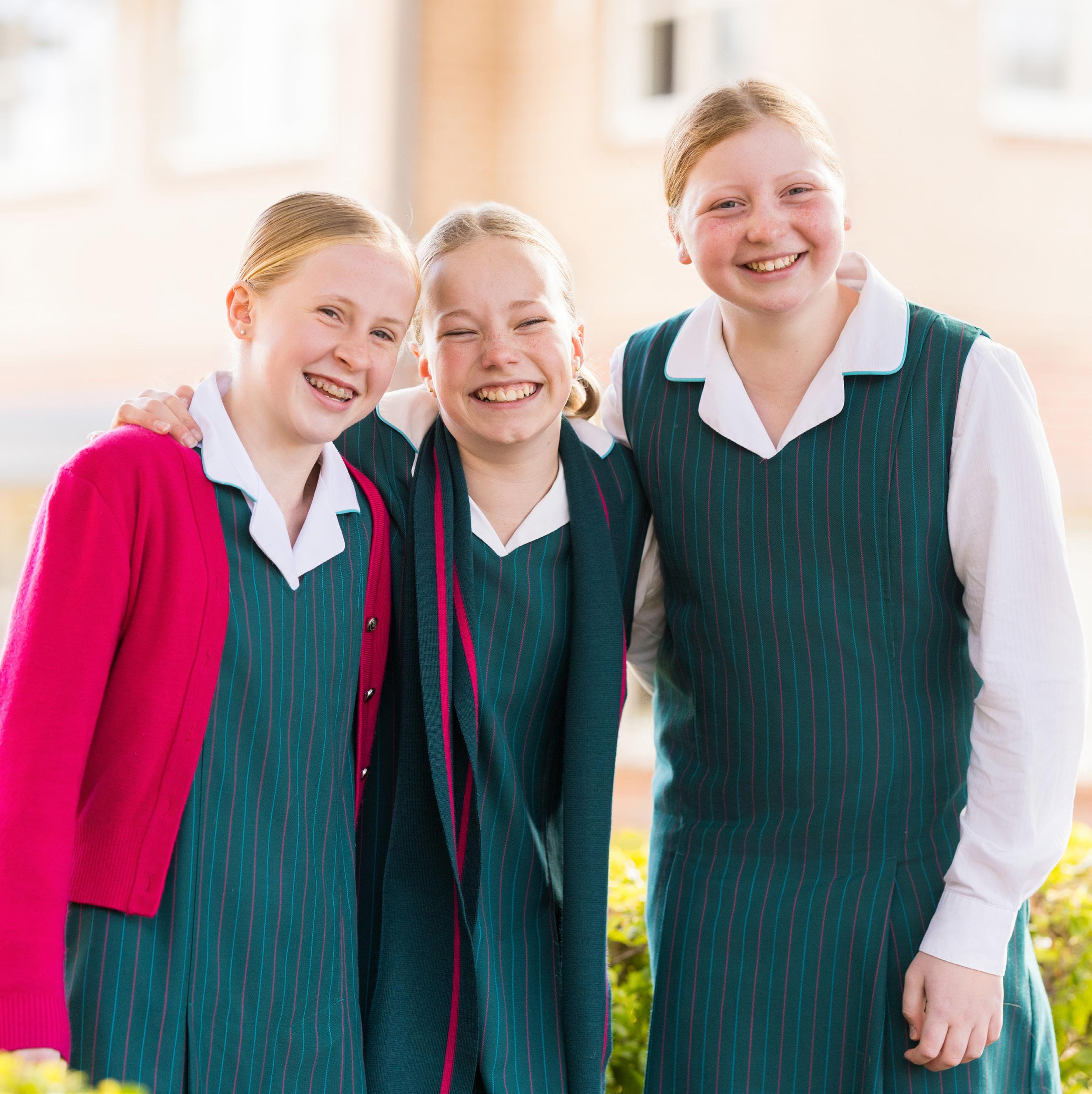





Almighty Father who has given us this school, wherein to grow to the beauty of noble life, we thank you.
Grant to us all that, in the sunshine of your presence, and by the guidance of our teachers, themselves taught by you, we may grow in body, mind and spirit, unspoilt and blameless, ready for perfect service wherever you shall call us, to the honour of our school and the glory of your name, through Jesus Christ our Lord. Amen
That I may Serve
In daily duty fervent
Without reserve Be willingly a servant
Following Him
Who laid aside his glory And came to Earth that He might serve.
The lighted flame
Keep always keenly burning
Uphold our Name
By higher standards learning
To God and School
And our beloved country
Show loyalty –Help us to Serve.
Heed ‘Ut Prosim’
Respect our noble motto
Hear our Danebank hymn
Endeavour then to follow
The paths of usefulness
Of kindness, love and virtue
In cheerfulness –May we all serve.



We are a Christian community of learners who nurture and inspire girls to flourish through inclusive and powerful future-focused educational opportunities. Our students are at the heart of everything that we do at Danebank.

“For I know the plans I have for you,” declares the Lord, “plans to prosper you and not to harm you, plans to give you hope and a future.” - Jeremiah 29:11
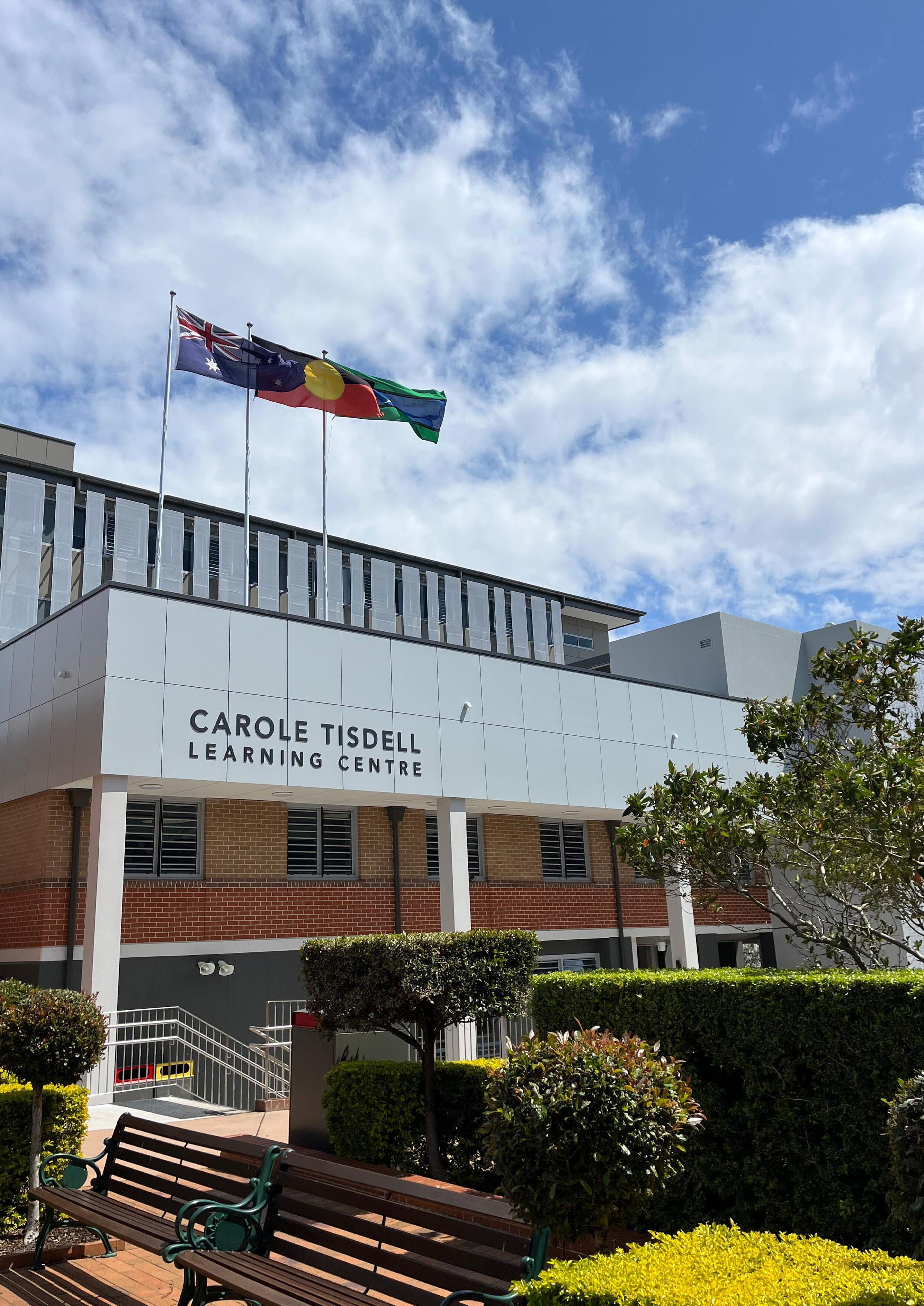

Danebank was founded in 1933 when a group of Hurstville parents, led by the Crakanthorp family, engaged Miss Edith Roseby Ball to educate their young children.
She began with five girls and boys, teaching them on the back verandah and in the backyard of the house at 104 The Avenue Hurstville. Within two years, through her hard work, energy and enthusiasm, Miss Roseby Ball had purchased the school’s first building at 86 Park Road Hurstville, starting a process of ongoing development and expansion.
Miss Roseby Ball modelled Danebank’s ethos on Ut Prosim, meaning “That I May Serve”. Ut Prosim symbolises our school’s Christian foundations and intention: that every student be introduced to the Christian faith through the practical experience of Christian care. Miss Roseby Ball’s tireless work over 17 years enabled her young pupils to thrive and is a striking example of this service.
With her compassion and high educational standards, Miss Roseby Ball established the school’s most enduring traditions:
• A Christian school where students are educated to be useful, achieving citizens
• Students inspired to achieve their best academic outcomes
• Students of all abilities are welcomed
• A learning environment that supports innovative academic programs
• The development of facilities and infrastructure continues in order to meet changing educational needs
We celebrate Founder’s Day each year, which is held on the anniversary of Miss Roseby Ball’s birthday, 7 March.
On that occasion two special awards are presented:
• The Edith Roseby Ball Award for Compassion recognises Miss Roseby Ball’s compassionate inclusion of students of all abilities
• The Valerie Crakanthorp Award for Philanthropy recognises Mrs Crakanthorp’s generous financial support when Danebank was established. These annual awards are presented to current or past students, staff or school council members who have provided outstanding compassionate or philanthropic service to the wider community.
Today, Danebank’s ethos remains true to Miss Roseby Ball’s vision. Danebank can be described as a school with a heart, where students uphold each other. The girls are at the heart of all that we do. For us, every girl matters.
Where every girl belongs and every girl is becoming all she is purposed to be.
Serving Christ by equipping students for Christ’s world.
Grounded in our heritage, we are a futures focused Christian learning community. We nurture and inspire girls to flourish through inclusive and powerful educational opportunities.
• Compassionate Service
• Creative Collaboration
• Respectful Relationships
• Courageous Optimism
• Personal Excellence
• Loving Kindness
• Taking Responsibility
Ut Prosim - That I May Serve
Service is an important characteristic at Danebank as we seek to follow the ultimate example of service seen in Jesus. All girls, irrespective of ability, are able to contribute positively to the life of our school by supporting the motto Ut Prosim.
By participating in activities organised by the Service Learning Coordinator and Ut Prosim leaders, House Officials or Student Representative Council and by supporting charities and community service activities, our students demonstrate their personal commitment to service.
Each Danebank girl has the opportunity to take their part to become a positive force of change in the world.
• Voice Our girls develop their voice to influence, take action, serve and shape the world.
• Faith Our girls form a connection with Jesus that enables them to experience the fullness of life.
• Identity Our girls develop confidence in their unique identity and purpose.
• Wellbeing Our girls graduate with a strong sense of wellbeing, belonging and resilience.
• Capacity to think Our girls are not only powerful learners, they are able to draw on their knowledge to thrive.
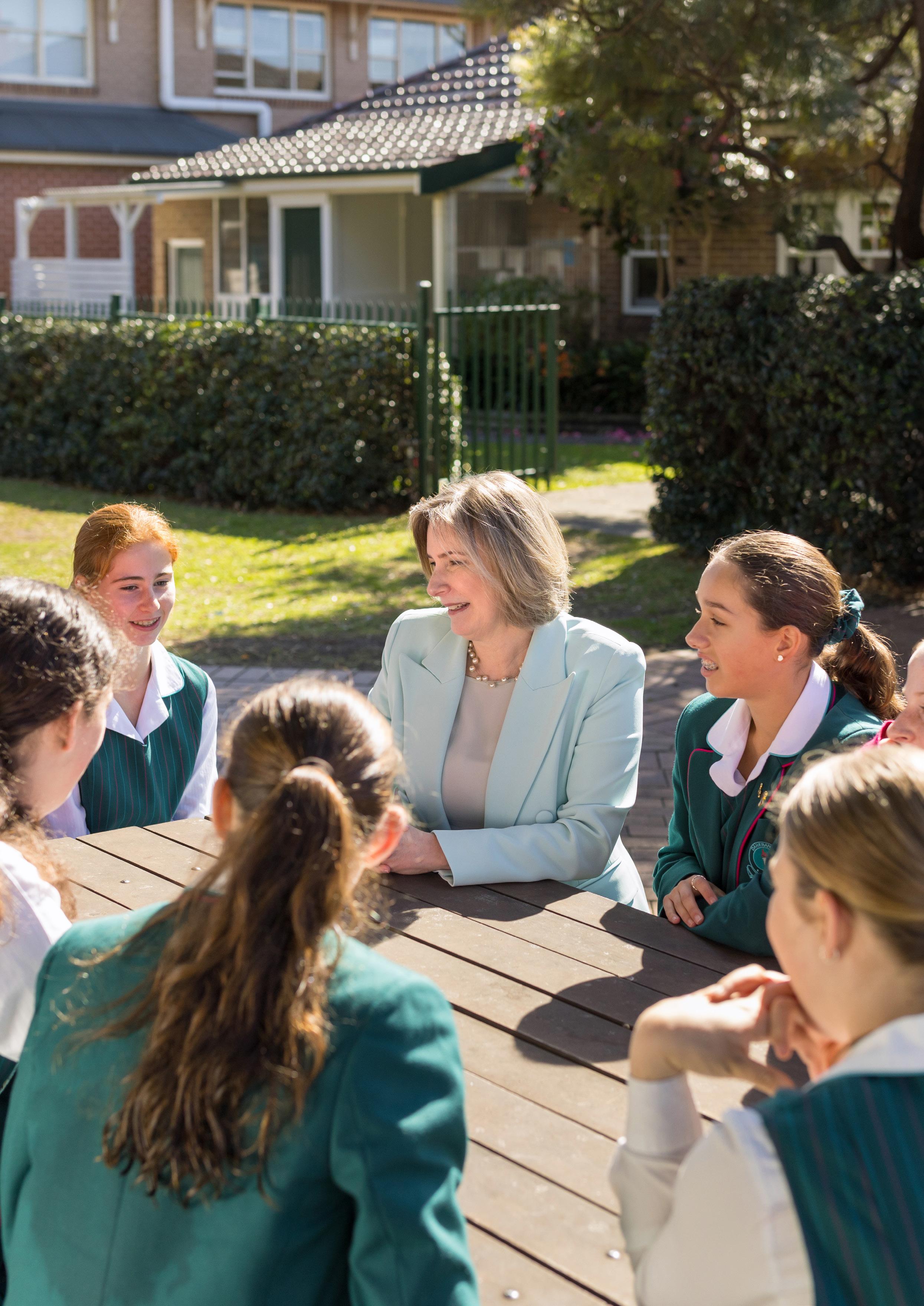
Each of us has received a precious gift from God. I remind you to fan into flames that spiritual gift.
Where every girl belongs and every girl is becoming all she is purposed to be.
We are a Christian community of learners who nurture and inspire girls to flourish through inclusive and powerful future-focused educational opportunities.
Our students are at the heart of everything that we do at Danebank.
We aim to ensure each student is equipped with all they need to flourish, both today and into an unknown future.
We have developed a bespoke, futures focused and holistic approach to her education, underpinned by the ‘Becoming Framework’.
Danebank staff are passionate about learning and deeply committed to the wellbeing and growth of each girl. Our heart to serve and vision to improve, drives our collaboration, innovation and pursuit of the best for ourselves and our community.
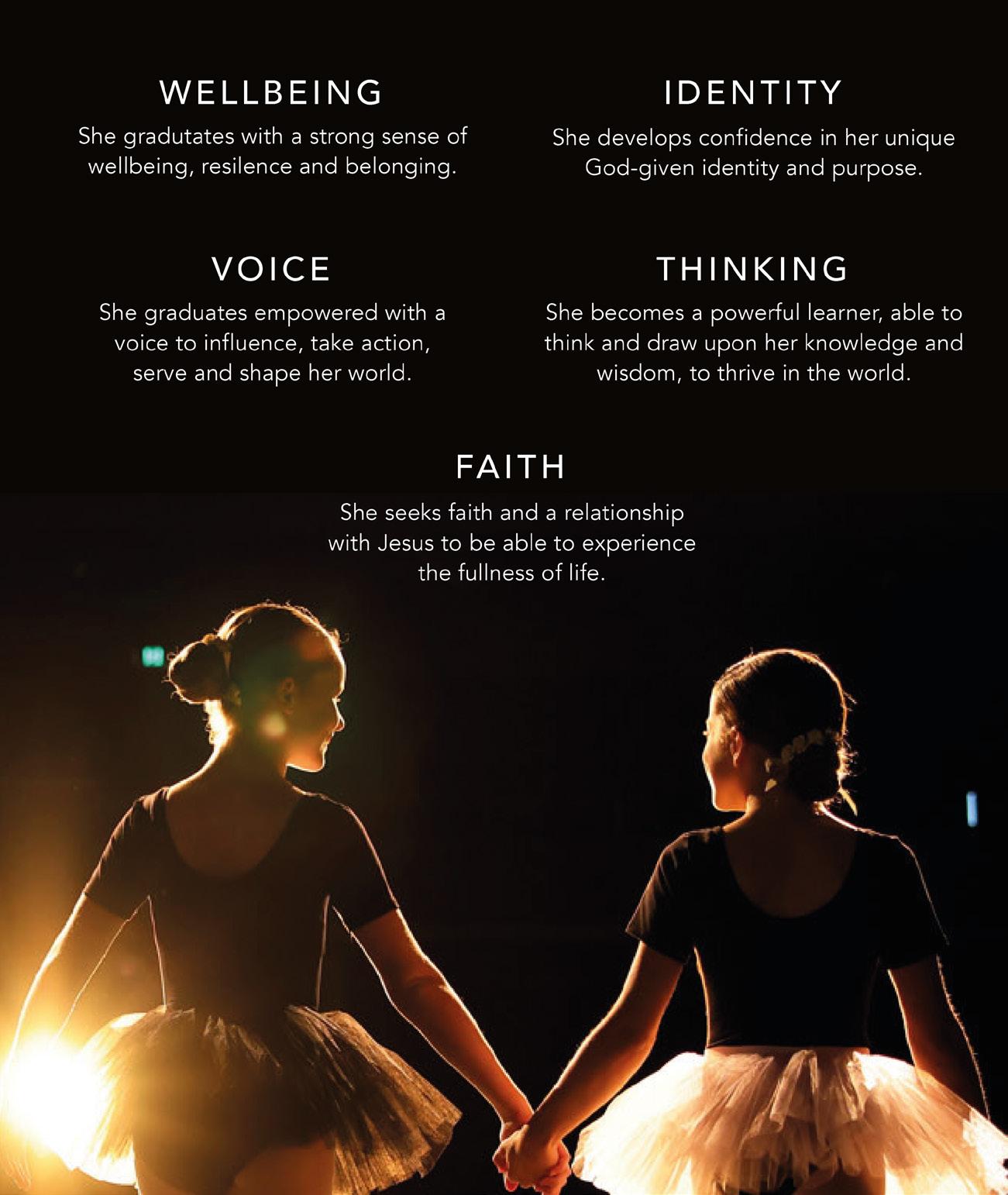
As a Christian learning community we are a place of connection and purpose. We focus on creating the optimal conditions of growth within our distinctive culture. Girls are encouraged to identify and develop their strengths, strive for personal excellence and develop a personal commitment to service.
We are a place of belonging. We are a unique Christian learning community; a place of connection and purpose. Our relationships are key to our success.
• We are inclusive and work hard to ensure that every individual belongs and that our learning environment supports each girl to thrive in the adventure of becoming.
• Danebank affirms that every individual is created and loved by God and should be afforded respect, justice, dignity, and acceptance as a unique and precious person, made in God’s image. (Gen 1:27)
• Danebank celebrates and values diversity and responds to the simple, yet life changing command of Jesus Christ to Love God and Love each other.
(Mark 12:31)
• Danebank affirms the rights of all members of the school community to be safe, feel safe and have a sense of belonging at school.
• Danebank acknowledges that being safe and supported at school is essential for student wellbeing and effective learning.
• Danebank is committed to a whole school, evidence based approach for a safe and supportive learning community that promotes respectful relationships and wellbeing.
• Danebank is committed to partnering with parents, carers and the wider community to sustain a school where every individual flourishes.
Danebank is a member of the Anglican Schools Corporation which supports Anglican education and ensures Danebank’s strong financial position.
The School is guided and governed by the School Council with the aim to provide a high standard of education for Danebank students.
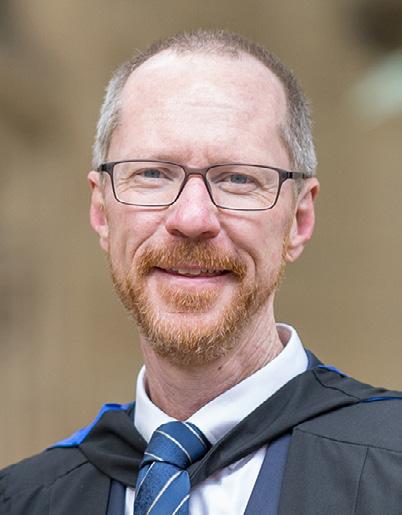
Chairman of Council Mr Mark Daly
The members, who are all volunteers, are appointed by the Anglican Schools Corporation (ASC) and come from diverse backgrounds, including education, business, law, engineering and clergy. The Council works to understand the educational environment, setting the strategic direction, guiding leadership appointments and overseeing the management and operation of the school from a governance perspective.

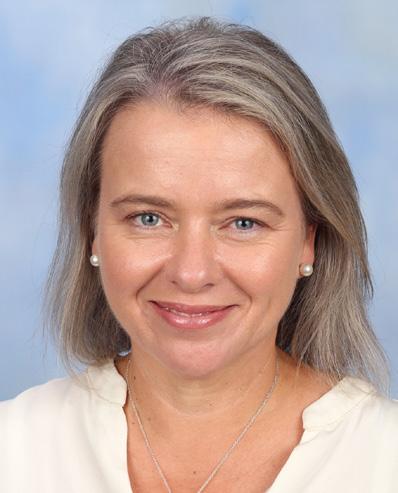
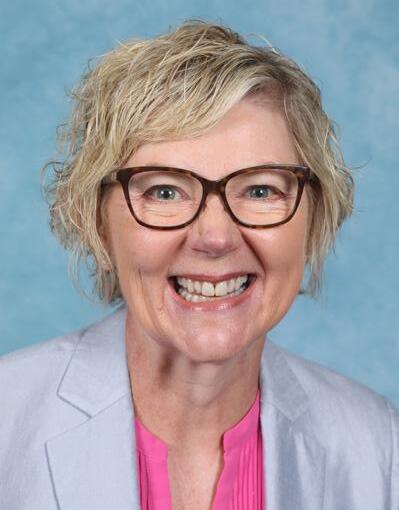

Members of School Council
Chairman: Mr M Daly BComm LLM GradDipLegPrac ATIA FFin
Members: Miss L Forsyth BComm/LLB GradDipLegPrac
Ms J Hurley
BSc(Arch)(Hons1 & UniMedal) BArch(Hons1), NSW RegArchitect
Mr M Lewis BSc(Hons) MAppFin
Mr s L Lim BAcc BTh DipMin
Rev N Moll BBA (OrgPsychBusLaw) BDiv (Hons)
Mr M Smith BEc FCA JP
TASC CEO Rep: Mr E Chiu GradDipCA BComm
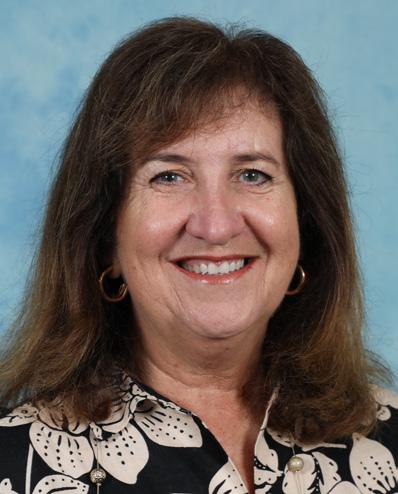

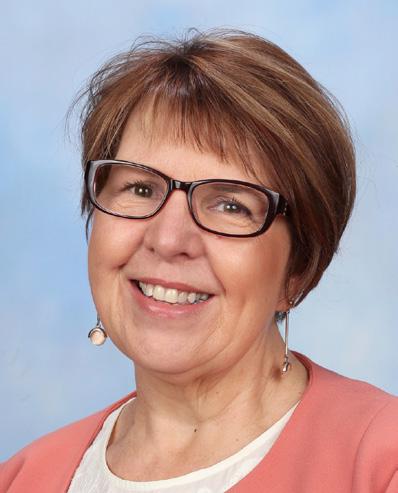
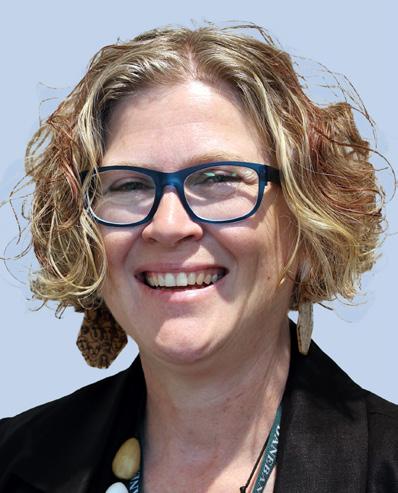
Wellbeing
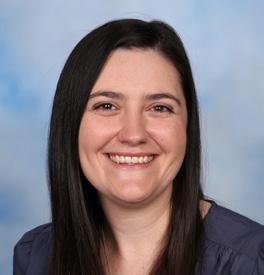

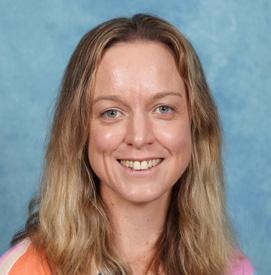
Year 7 Coordinator
Mrs Sarah Wallekers
Year 7 Coordinator
Ms Michelle Lui
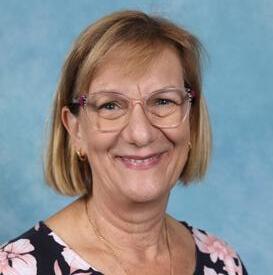
Christian Studies
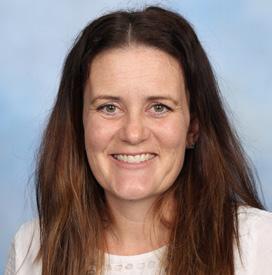
Senior School Chaplain
Ms Kellie Thomson
Leadership
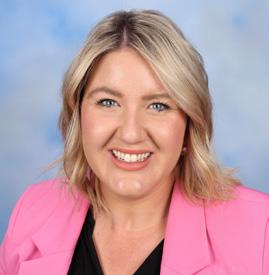
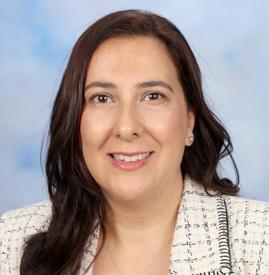

Assistant Head of Senior School (Wellbeing)
Mrs Elizabeth Howard
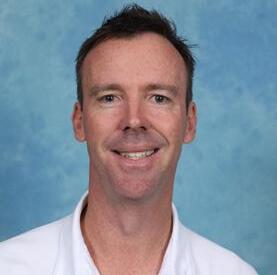
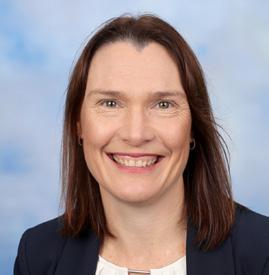
Assistant Head of Senior School (Operations)
Mrs Anastasia Rompies
Assistant Head of Senior School (Learning)
Mr Luke Coulton
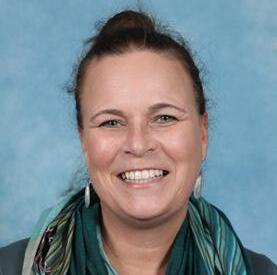
Learning
Heads of Department
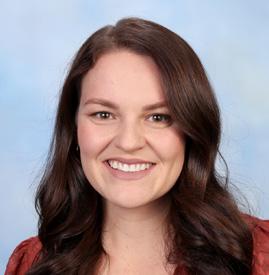
English (Acting Head)
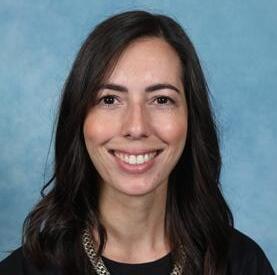
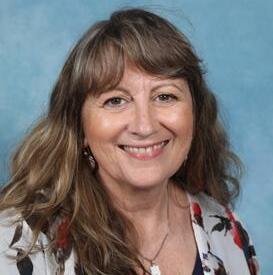
Creative & Performing Arts
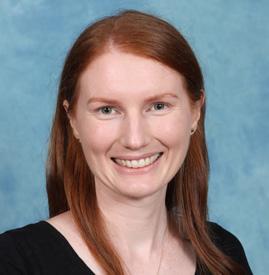
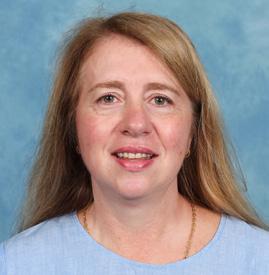
Mathematics
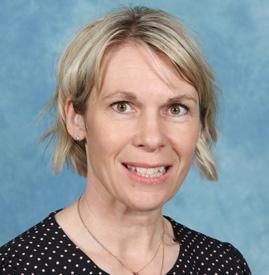
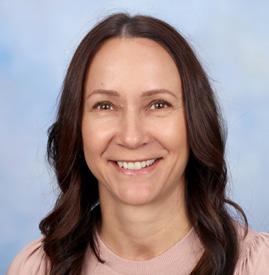
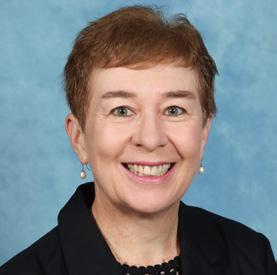
Learning Enrichment
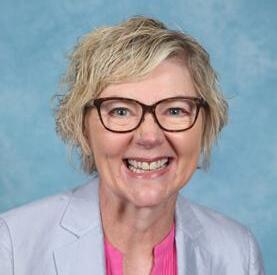
Deputy Principal Senior School

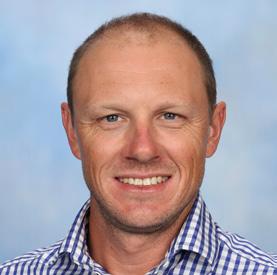

Danebank is committed to creating quality learning opportunities for all students. This includes strengthening their academic, physical, social, emotional and spiritual development. As parents you entrust your daughters to our care, confident that we will make every effort to deliver on this agenda.
In a rapidly changing, complex and uncertain world, Danebank is a community that prioritises student wellbeing and pastoral care.
“Student safety and wellbeing are enhanced when students feel connected to their school, have positive and respectful relationships with their peers and teachers, feel confident about their social and emotional skills and satisfied with their learning experiences at school”
(National Safe Schools framework)
For these reasons, Danebank is a Visible Wellbeing Partner School. Designed by Professor Lea Waters (PhD), world renowned expert in positive psychology, Visible WellbeingTM (VWB) combines the science of wellbeing with the science of learning and teaching to make wellbeing
visible in all classes and across co-curricular.
We believe that wellbeing is inextricably linked with learning. When students are flourishing within themselves, they are well positioned to succeed at school, make positive choices, have healthy relationships and stand prepared for the complex challenges of the world that awaits them beyond Danebank.
Student wellbeing and pastoral care is supported by both Connect teachers and Year Coordinators in the Senior School.
Counsellors, Assistant Head of Senior School (Wellbeing), Deputy Principal Senior School are involved in more complex student wellbeing matters as required.
Students in Year 7-10 are engaged in a Student Care model where each student is in a small Connect class, with her Connect teacher being her first point of contact. The role of the Connect teacher is as a significant adult in the life of a student. Research shows positive relationships with significant adults, who know and care for their students, add a protective factor to the wellbeing of students. Connect teachers work to build positive relationships with each of their students and their families, supporting the delivery of wellbeing education to students.
Each student will belong to a Connect class for the duration of her time at Danebank. Families will be able to meet their daughter’s Connect teacher in Term 1 at a special evening.
The Connect teacher will:
• Encourage students to live out the school’s values
• Oversee uniform and attendance
• Monitor student wellbeing through weekly contact and Check-In Chats
• Provide a first point of contact for families regarding any information they believe the school should be aware of, or minor concerns
• Guide parents as to who can best assist with concerns regarding their daughter
• Refer any significant matters to the Year Coordinator, class teacher, Head of Department or Assistant Head of Senior School (Wellbeing)
Your daughter is also supported by their Year Coordinator. The Year Coordinator collaborates with academic and wellbeing staff to support your daughter’s academic, social and emotional wellbeing.
Key functions of Year Coordinator:
• Manages student behaviour within a year group
• Oversee overall learning and academic progress
• Give advice or support when students have concerns regarding their learning, peer and teacher relationships
• Guide parents as to who can best assist with significant concerns regarding their daughter
• Each student belongs to a Connect class for her duration at Danebank.
• Connect classes aim to build connections between students, families and teachers.
• Act as a communication link between home and relevant situations likely to affect a student’s life at school.
• Guide parents as to who can assist best with concerns regarding their daughter.
There are two Year Coordinators to support your daughter’s life at Danebank. They collaborate with a range of academic and wellbeing staff to support your daughter’s academic, social and emotional wellbeing.
Key functions of the Year Coordinators:
• Manages student’s behaviour within a year group.
• Oversee attendance and overall learning and academic achievement.
• Give advice or support when students have concerns regarding their learning, peer and teacher relationships.
The academic development of students is the responsibility of the Class Teachers, Heads of Department, the Learning Enrichment Team, the Head of Curriculum Innovation and the Deputy Principal Senior School.
• Create and maintain effective learning environments which support the learning needs of the students.
• Communicate any concerns regarding student learning to parents.
• Assist students to deal with situations involving their individual subject area.
• Oversee learning within their specific subject area.
• Parents should contact Heads of Department with any concerns regarding their specific subject area.
One of the main differences between Junior and Senior School is that in Junior School, a student has one main teacher and sees a relatively small number of specialist teachers. In Senior School students are taught by specialist teachers. Most students will have at least 12 different teachers.
Friday 24 January 2025
• Year 7 students: 8:45am - 2:45pm
This day is for all students in Year 7 and Kindergarten, as well as students new to Danebank in other year groups. On this day, there are not many other students on campus, making it a great time for new students to familiarise themselves with the school surroundings, meet some of their teachers and Year 11 Connect Leaders.
What to wear:
• Students should wear summer uniform (no blazer)
What to bring:
• Recess, lunch and drink bottle
• BYO laptop device (students in Years 7-12). You will set up your device on the day with help from the IT staff

CRU Galston Gorge Camp & Conference Centre
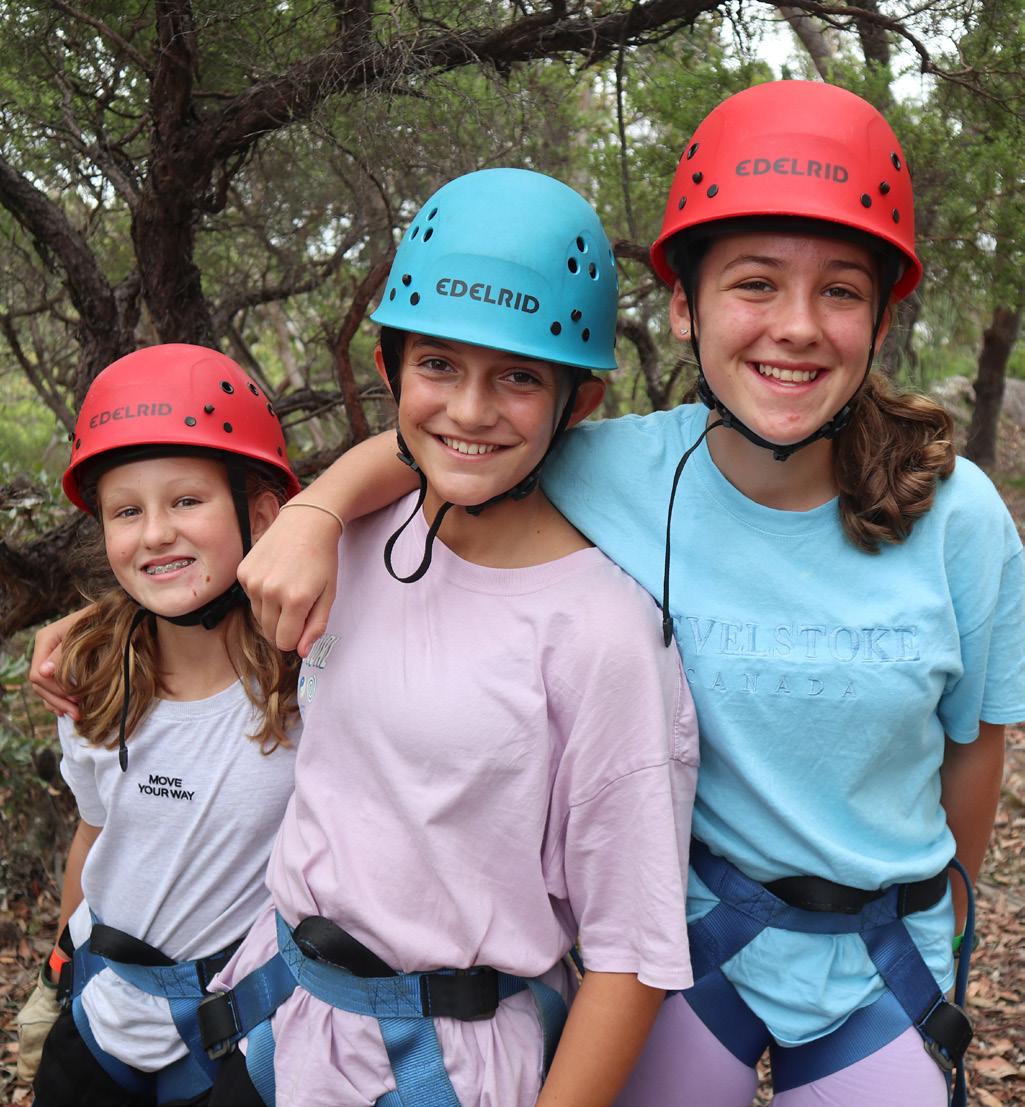
Orientation Day: Friday 24 January
8.45am
Parents and students arrive and make their way to the Performing Arts Centre (PAC). Enter via The Avenue.
9.00am Parents and students:
Welcome by the Principal, School Captain and introduction of various staff.
9.30am Parents:
The Year 7 Coordinator will continue to give you some details needed for the first weeks at school. Return at 2.45pm to collect your daughter.
9.30am Students:
Will spend the rest of the day with the Year 11 Leaders. This is the Connect group students will be in throughout the year and their time at Danebank.
The students will be involved in games and activities that help them getting to know each other and the school environment.
IT set up: Students will set up their laptops with WiFi, school email and textbooks, all with the support of our IT staff.
ID Photo: Students will have their photo taken on this day for their library card. This is also to help teachers learn their names quickly as they can print out class rolls with student photos.
Recess and Lunch
All Year 7 students will meet together for recess and lunch.
Finding travel buddies: At lunch we will organise girls into groups, based on how they are getting to school and from where, e.g. students travelling on the train from Cronulla will be grouped. This enables the girls to look out for others and who they will likely meet on their journey to school. Year 11 Connect Leaders will walk girls to Hurstville station.
2.45pm Parents:
Return to the Performing Arts Centre (PAC). Enter via The Avenue to collect your daughter.

• First Day of Term: Tuesday 28 January 2025
First day of term for all students
What to wear and bring:
Students will need to wear their summer uniform (no blazer required) and bring books, their laptops, recess and lunch, ready to begin formal lessons.
All students return to school on this day. It begins with Year meetings for every Year Group. During this meeting, they will be given their diaries and timetables, as well as a roster of activities for the rest of this day.
Following the Year meeting, students will come together to celebrate starting a new year at the commencement-ofterm Chapel service.
• Thursday 6 February 2025
The Swimming Carnival is held at the Angelo Anestis Aquatic Centre (Preddys Road, Bexley North). All students must wear their sports uniform to the carnival.
Buses are available from school if students require transport to the pool. They must meet in the school bus bay at 7.45am, or can be dropped at the pool.
Students will be brought back to school on the bus or can be picked up from the pool. The carnival usually finishes at about 2.00pm, so students will be dismissed early on this day. The Library is open, should you wish your daughter to remain at school until 3.00pm.
As we are a busy school, we communicate directly with students via email.
A Daily Bulletin is emailed to students every day. It contains all you need to know for the day.
Students: Please ensure you read your emails at the beginning of each day and respond appropriately to the email if a question is asked of you. Make sure you keep your parents informed of what is going on, as this is part of your developing responsibility for your education.
Each Senior School student is allocated a locker and a lock for the safekeeping of their personal possessions. Students should ensure that their lockers are securely locked at all times.
The school canteen is fully staffed by the school. We have a healthy-food policy and the canteen is open for breakfast, recess and lunch every day, providing a variety of nutritious foods. The canteen is cash-less, so all walk-up purchases are made by the green student ID card. A Munch Monitor account is required for this and must be pre-loaded with funds allocated to the students Munch Monitor account.
All lunch orders are processed online through Munch Monitor on iDanenet, under Canteen. Orders can be placed four weeks in advance. Orders are best placed the night before, or by 7.30am on the day of order.
You need to register a login and password at the Munch Monitor website: www.munchmonitor.com
• User name: danebank
• Password: munch2220
• Contact: help@munchmonitor.com
• 1300 796 190
At Danebank we use the Box of Books (BoB) platform to purchase and deliver digital textbooks and other course content for your daughter. Parents will be emailed details in November / early December with instructions on how to access the website and purchase your daughter’s required textbooks.
Once purchased, your daughter’s digital textbooks will be accessible immediately via the Box of Books site, with the exception of Year 7 who will have access at the start of Term 1. Edrolo and other digital subscriptions will be available at the start of Term 1.
It is necessary for you to access the Box of Books platform and place your order in early December so that any physical textbooks arrive in time and your daughter is prepared for the start of the academic year. Late orders of physical textbooks may not be delivered prior to the start of Term 1.
Note: There will be an additional charge made to parents for English Novels which is separate to the Box of Books textbook purchases they will be required to make.
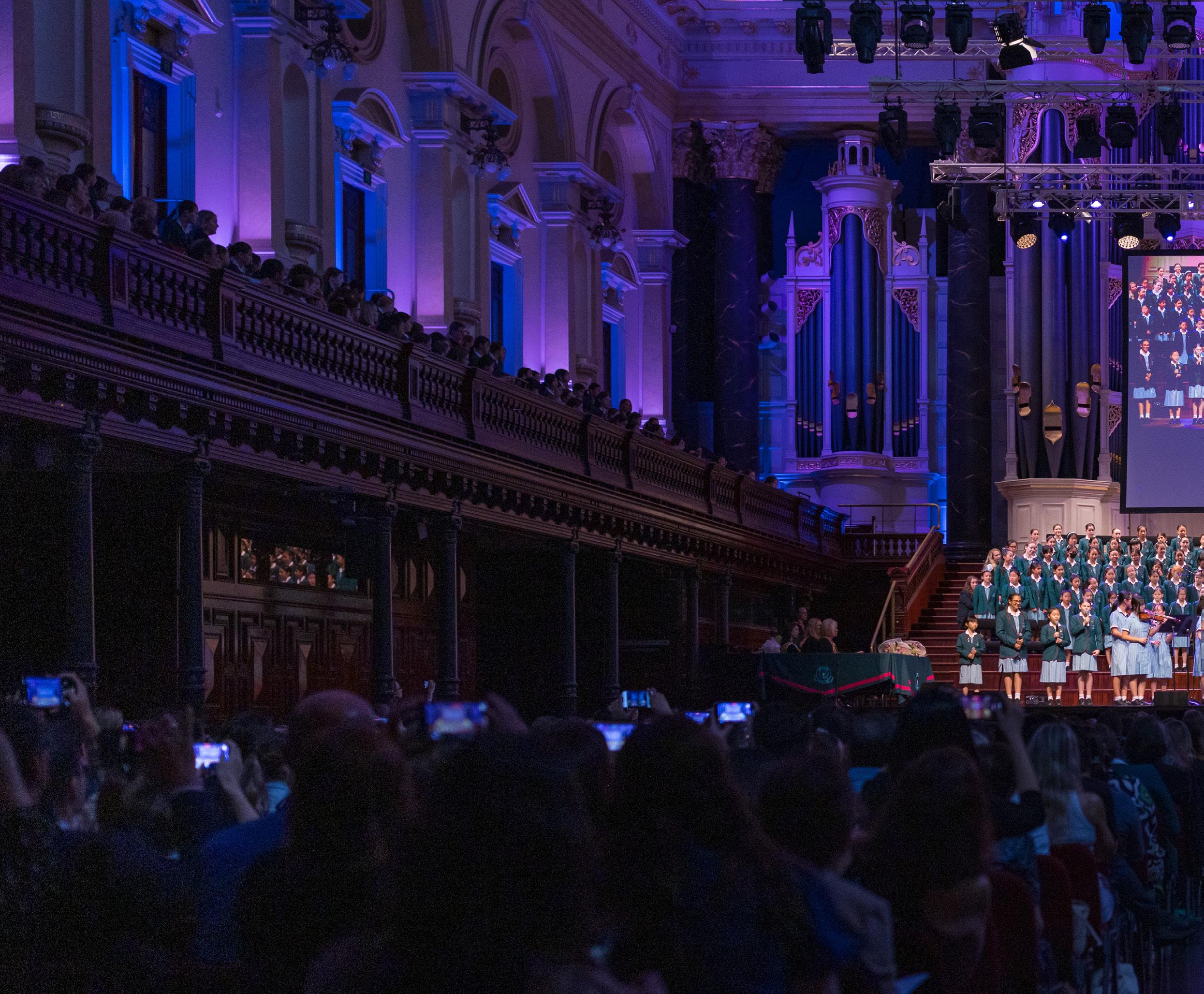
• Students, you will have many different teachers each with their own teaching style and classroom management strategies.
• You will move around to different classrooms for each lesson and sometimes classes for a subject won’t be in a consistent room.
• You will need to manage your own time in terms of home study, completing assignments and extra-curricular activities.
The transition from primary to high school is an important change in the life of your children. You can support your daughter in a number of ways.
• Establish a school ready routine by going to bed and getting up at a reasonable time. A lack of sleep has been proven to be detrimental to students’ learning so we encourage you to put some guidelines in place as early as possible.
• Regulate their use of technology especially if this is the first time that your daughter has had a smartphone.
• Start the conversation about their upcoming Orientation Day. They will be the only Year Group at school on that day and they will be in a small group, supported by their Year 11 Leaders. There will be many familiar faces and chances to ask questions.
• Encourage them that they will get to know other girls in the school. This includes an Orientation Day, the first formal day of school, the swimming carnival and the Year 7 camp.
• Inspire them to step outside their comfort zone and join one of the many co-curricular groups. They are a great way for students to gain confidence, make new friends, learn a new skill and have fun!
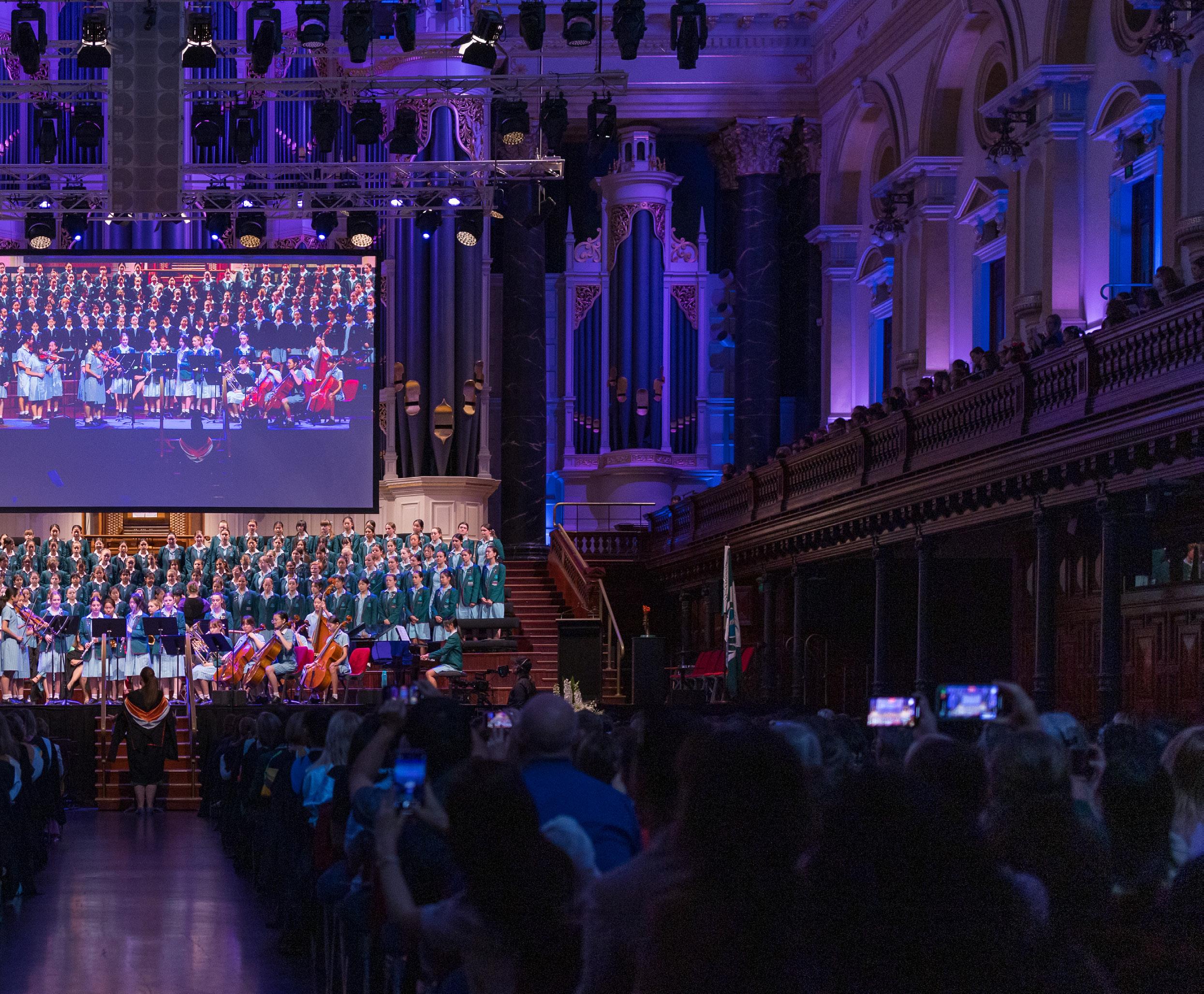
Welcome to New Parents P&F Cocktail Evening Friday 7 February 2025, 6.30pm
Danebank Community Lounge (Level 2, Carole Tisdell Building, entry via the Colonnade gates)
Come and share a festive evening with us and meet other new parents. Adults Only - No Children.


Our School runs and facilitates a large number of events throughout the year and it is essential that your daughter attends.
Compulsory attendance for ALL students:
• Founder’s Day
• Chapel Services
• Assemblies
• Swimming Carnivals
• School Photo Day
• School Cross Country
• School Camps
• Senior School House Festival Day
• Athletics Carnivals
• Autumn Fair and Open Day
• Special Assembly
• Carols Service
• Speech Night
• Subject-specific Excursions/Incursions
Some other School events:
• Parent/Teacher Learning Conversations
• School Open Mornings (held each term)
• School Dance
• Book Week events
• Year 12 HSC Showcase Evening
• Drama Productions and Musicals
• Picnic Day
• School Concerts
• Old Girls Association Reunions
The Senior School timetable is made up of a 10-day fortnight, with Week A and Week B. Each day is divided into six (6) lessons of 50 minutes each. Bells signify lesson changes, recess and lunch breaks. Note: Some extension classes may run off-line (outside of the timetable).

As a Christian school in the Anglican tradition, we see coming together to learn from God’s Word, the Bible, to pray and praise Him in song as an important and vital part of each week. We also commence and conclude each term with Chapel services. During term time, Chapel is held on Mondays. Students assist with aspects of this service, including reading the Bible, praying and leading the Chapel music.
Tuesdays and Thursdays: CONNECT
Connect groups are small groups led by a teacher, and in Years 7 to 9, by Year 11 student leaders, in conjunction with teachers. In Connect, students engage in lessons and activities that build connection to others, support wellbeing and foster the learning of core values such as service, collaboration, kindness and responsibility.
Wednesdays: Principal’s Assembly
Each week we come together to celebrate who we are as a Danebank community. Assembly is hosted by the Prefects, and a variety of items are presented. There are guest speakers, presentations by Dr Burgess and
other key staff and students give reports on events in the life of the school. Students are recognised through the presentations of Awards. Announcements are made about upcoming events and sport.
The Prefects organise and host these assemblies which showcase the talents of students within the Senior School. Students who have talents in music, arts, dance, drama, or have anything they want to “showcase” can sign up for these assemblies through the Admin Forms link on iDanenet. Year Coordinators hold meetings throughout the term to support students within their Year Group.
Various days: SRC-run Year Meetings
Student Representative Council (SRC) members conduct meetings with their Year Groups once a term. These are designed to enable the girls to develop leadership skills and to build and facilitate relationships within their Year Group. They also provide an avenue for communication about student initiatives and receive feedback about school matters.

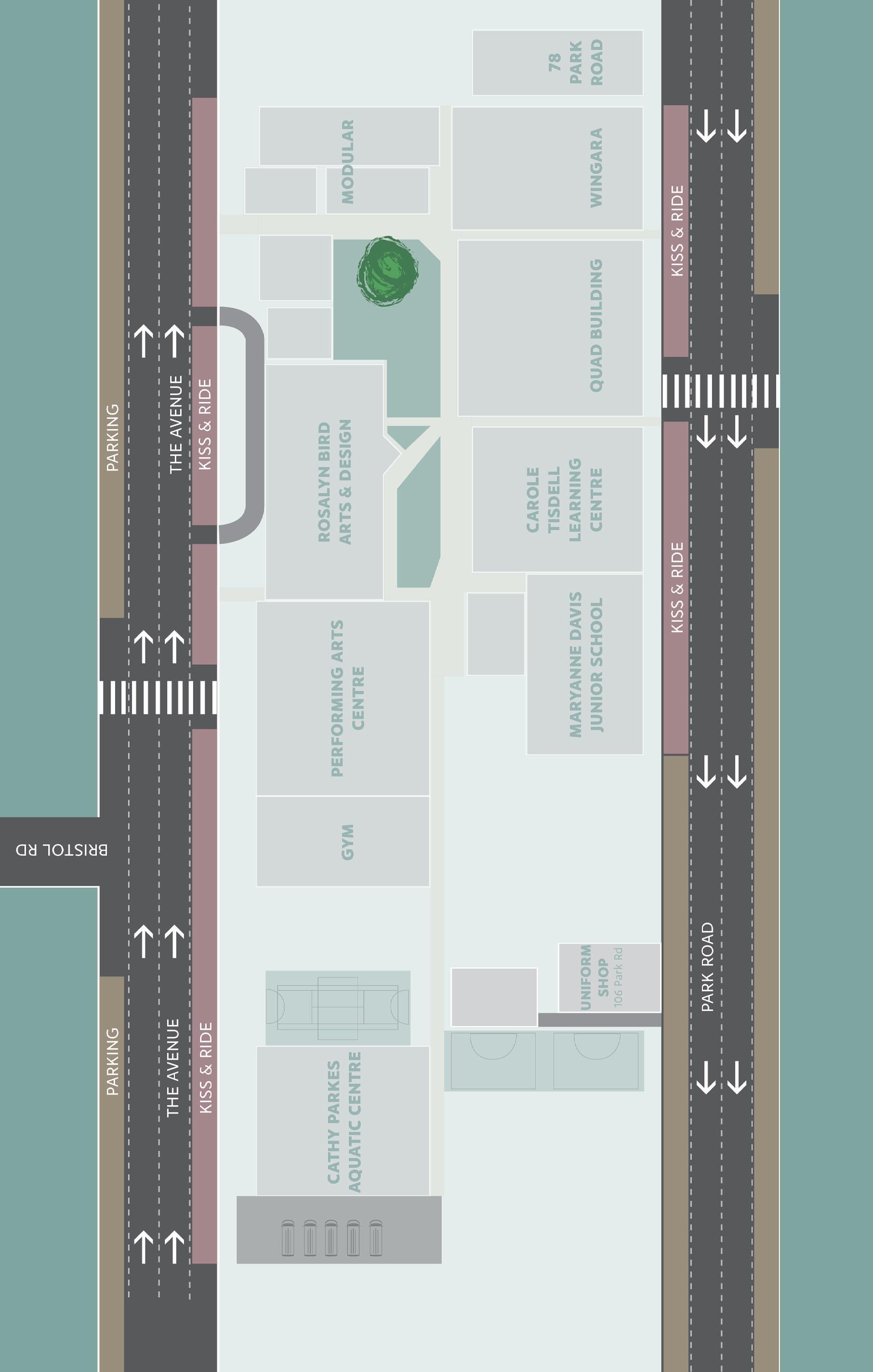

Parents should access Danebank’s online calendar regularly throughout the year to check event dates and information. The calendar can be accessed through iDanenet or the Danebank school app. It has extensive information including venues and starting times, term dates, assessments and excursions.
Student diaries are issued at the beginning of the year to all students from Years 1 to 12. The front section of the student diary contains important information relevant to students. Parents are requested to read this with their daughters and sign the parent/carer/student permissions page, acknowledging they and their daughters have read this section. Relevant school policies are also published in the diary and on the school’s iDanenet site.
Parents will be contacted by phone in the event of an emergency. SMS messages and emails may be sent as friendly reminders about events, important information about changes to sporting arrangements, as well as links to the fortnightly school newsletter. A notification about the publication of the newsletter is also posted on the Danebank school app.
We are unable to give students messages during the school day, unless they are extremely important. Messages must be from parents or carers and be directed through the School Office.
Many other updates can be viewed by parents and students via:
• Email Letters ‘From The Principal’: Important updates and information are regularly communicated to parents via these ‘From The Principal’ emails.
• Newsletter: A link to the Danebank News is emailed to parents and senior students fortnightly during term time. This is a vital means of communication containing important updates and reports.
• Facebook: www.facebook.com/DanebankSchool
• Instagram: www.instagram.com/danebank
• LinkedIn: www.linkedin.com/school/danebankanglican-school-for-girls/
• Website: www.danebank.nsw.edu.au
• Danebank App: Once downloaded, open and sign in, using your Danebank Edumate login.
iDanenet is our school’s intranet site hosted on the school website. A series of links give parents extensive access to Danebank services: apply for the School of Music and Extra Sports online, order lunches from the Canteen through Munch Monitor, access the Edumate parent portal, check the school calendar or catch up on newsletters.
www.idanenet.danebank.nsw.edu.au
Parents will be issued with a username and password to access the Parent Portal. This portal gives access to information such as parent and student contact details, medical details, absence and attendance details, academic results and feedback.
Parents are asked to check all details on the portal for their daughter, before the start of each year. It is essential that parents keep this information up-to-date. In any emergency situation, the school must be able to contact parents quickly.
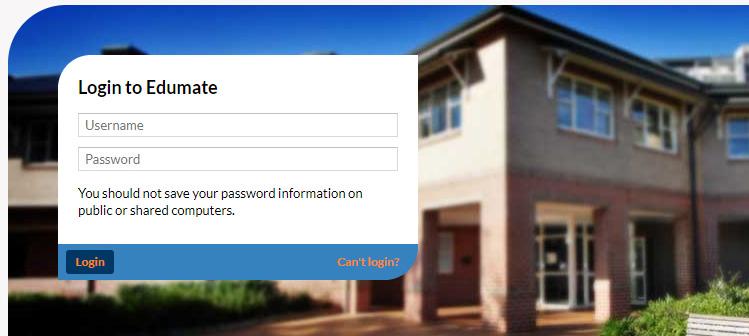
Parents are asked to manage the family’s personal details and maintain updated contact information. It is vital that all changes be entered on the portal so that parents can be contacted in emergencies.
This can be used to pay fees, check balances and set up payment plans across the year. School fees will be emailed to the parents’ email addresses on file, so please ensure these are kept up to date.

An ongoing assessment program is followed for each girl in each subject. Parents can access the Parent Portal at any time to find comments and marks for each assessment that has been returned to their daughter. The Edumate Parent Portal offers excellent opportunities for parents to be informed and aware of their daughter’s progress in her learning. Students’ upcoming tasks for each subject will be listed on the portal to allow parents to help their daughter plan her assessment schedule. The formal feedback on assessment tasks will also be delivered through the portal. As each task is returned, parents and their daughters will be able to view the teacher’s comment about her performance and the level at which she has met the criteria for the task.
As part of the online feedback process for each assessment task, we ask students to reflect on their performance by identifying areas of strength and for improvement, in the light of the teacher’s comment and the marked assessment. Once this reflection is completed, access to the student’s mark, percentage, place in the course for that task, and how she fared in relation to the subject cohort can be compared in a box-and-whisker graph which will give quartiles plus median, maximum and minimum marks. Students are encouraged to think about all their results with a growth mindset and a view to improving their performance as the year progresses.
Parent/Teacher/Student Learning Conferences are held annually, usually in Term 2. These learning conferences are designed to enhance the partnership between school and home. Parents are encouraged to bring their daughters to these meetings to ensure a collaborative approach to learning.
Formal Reports are issued twice each year and they offer summaries of the students’ ongoing assessment results. The assessment results are represented in full detail on the Edumate portal. Additional reports can be prepared for parents who have a particular concern for their daughter, outside the usual reporting channels. These are arranged through the Year Coordinator.
Danebank follows the guidelines set by the NSW Compulsory School Attendance policy.
Parents should notify the school if their daughter will be absent by emailing the office attendance@danebank.nsw. edu.au or by accessing the Edumate Parent Portal through iDanenet after 5.00pm and reporting it there. It is a NSW legislation requirement that all absences are explained in writing within seven days; this includes weekends and
school holidays. If the student’s absence is unexplained after seven days, the absence will be listed on the student’s school report as unexplained. Parents will be notified via email if their daughter was absent.
The school day commences at 8.20am (Period 1) except when students in Years 11 or 12 have a Period 0 lesson, which commences at 7.15am. Students who are late to school are expected to present to the Senior School office on their arrival. A note of explanation from parents is required, and includes students who are late to a Period 0 class. Lateness to school can be explained up to seven days. Parents will be notified via email if their daughter had a partial absence, i.e. late arrival, without written explanation.
Exceptions to this will include any instance when there has been a confirmed public transport issue. Parents are unable to change attendance via the portal after this seven day window.
A student who needs to leave school early must present a note signed by her parent or guardian, or email attendance@danebank.nsw.edu.au to the Senior School office before 8.15am. The student can then collect a Leaving Early Pass from the office before departing. The early leave slip is shown to the teacher and retained by the student.
There may be times when your daughter may be away from school for an extended time due to long term illness or participation in an elite sporting event. On these occasions, parents should complete a Request for Exemption of Attendance form at least two school term weeks in advance. The form can be found on iDanenet under Student Forms.
If the exemption from attendance is granted to your daughter, this absence will not be included in the ‘Total Days Absent’ on her school report. Forms ask the school Principal for permission for your daughter to be absent for an extended time.
Note: Your daughter will need to organise alternative arrangements with the Head of Curriculum Innovation for any formal assessment task that will be missed while she is on leave or exemption from attendance. This must be completed and signed by the Head of Curriculum Innovation regardless of whether any assessments are due. Your daughter is also required to make contact with the IT Department to arrange computer access and her class teachers to organise how her learning will continue while she is on leave.
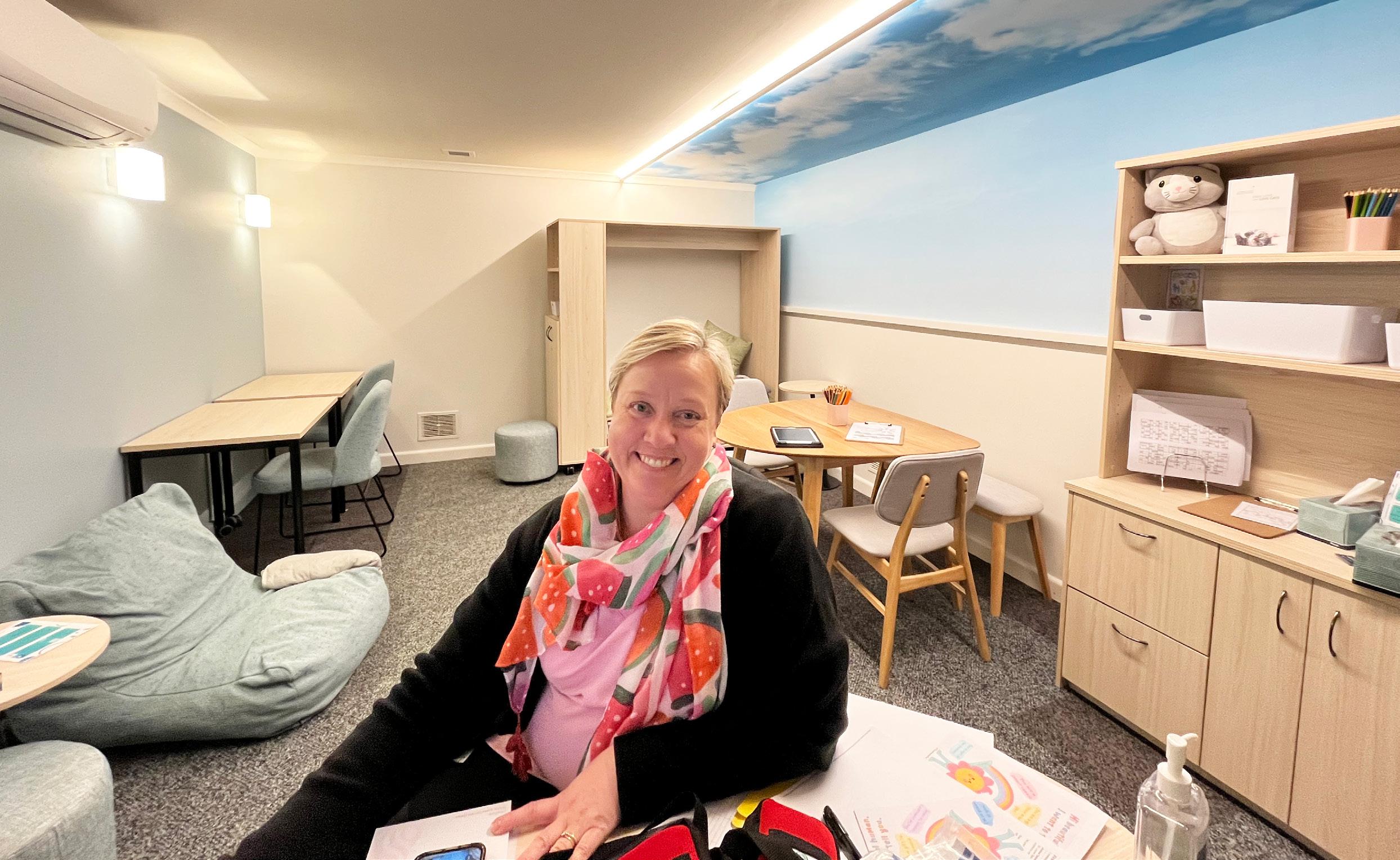

The staff at Danebank take the responsibility of our students’ health and wellbeing very seriously. In partnership with parents and/or carers, we ensure our students are cared for in the best possible way.
The School Nurse is responsible for both Junior and Senior sick bays, administering medication and first aid. In her absence, these responsibilities are delegated to the relevant office staff.
Students who are unwell should not attend School.
It is the responsibility of parents and/or carers to provide accurate and up-to-date medical information. Information regarding medication, together with changes of address, telephone numbers and parent’s/carer’s place of work or emergency contacts should be updated via the Edumate Parent Portal at the beginning of the year and when needed.
When a student presents to the office, it will be at the discretion of staff as to what action to take. This includes, but is not limited to, first aid, rest or time out.
If a student becomes ill at school she will speak to her supervising teacher who will sign the “Out of Class Log” in their student diary, to then be presented at the student services counter. Students may be allowed to rest in sick bay. If unable to return to class, parents and/or carers will be contacted by office staff.
Students are not to contact their parents and/or carer to come and collect them under any circumstance.
Mrs Rebecca Rathbone RN, BN, MN(CriticalCare) MACCCN rebecca.rathbone@danebank.nsw.edu.au
It is school policy that students requiring regular medication bring the medication in the original container, with the pharmacy label attached, to the relevant School Office, along with the completed Permission to Administer Medication form (https://bit.ly/3XcHjfh)
All students who may require intermittent or emergency medication (e.g. asthma puffer, EpiPen or antihistamine) must provide this medication to the relevant office. Students in Years 7 - 12 should carry their EpiPen / Asthma puffer on them.
It is the student’s responsibility to remember to come to the office for the medication at the required time. Administration of medication will be under supervision of staff.
Parents of any student who receives regular medication for ongoing health management need to inform the school to ensure continuing duty of care.

Students who have anaphylaxis or diabetes should carry their EpiPen / Blood glucose monitor at all times. Students who have allergies, anaphylaxis or asthma are required to submit a valid emergency management plan, in addition to a prescribed EpiPen or asthma reliever puffer.
Given the rising incidence of allergies, it is not possible to remove all allergens. However, the Danebank community is allergy-aware, understanding the risks associated with allergies and implementing practical, age appropriate strategies to minimise exposure to known allergens. Whilst Danebank does not claim to be ‘nut-free’, we attempt to minimise exposure to particular foods containing such ingredients as peanuts and tree nuts. This includes removing nut spreads and products containing nuts from the school canteen, but does not include removing products that ‘may contain traces’ of peanuts, tree nuts or other allergens.
Secondary schools are required to request approved immunisation certificates for each new student who commences at the school. Such records are strictly confidential and stored securely in accordance with our Privacy Policy.
If you cannot produce this record, your daughter may still be enrolled but may be excluded from school on the direction of a public health officer for the duration of an outbreak of a vaccine-preventable disease in the school. If an unimmunised student comes into contact with a vaccine preventable disease outside school, they can also be asked to stay home during the incubation period to reduce the risk of starting an outbreak.
An approved Immunisation Certificate can be requested online by going to: www.humanservices.gov.au/individuals/ online-help/medicare/getting-your-immunisation-historystatement-using-your-medicare-online-account and using your MyGov account.
Please provide a copy of this certificate to the Senior School Office where it will be uploaded and the details recorded against your daughter’s student record.
In the interests of keeping Danebank a safe and secure environment for the girls, all visitors are asked to proceed to the Junior or Senior School Office before entering the premises. You are most welcome and you will be asked to sign in. A visitors’ sticker will be provided for the duration of your stay. Visitors must return to offices to sign out before leaving the premises.
The P&F Association consists of a very active group of parents who aim to:
• Build a sense of Danebank community among the parents through hosting events and organising opportunities for discussion.
• Run fundraising activities that benefit all the girls. Funds raised are spent on the acquisition of equipment for girls’ use, such as musical, sporting or technological equipment.
The Parents & Friends Association is a highly valued part of the school community and the members arrange fund raising and other activities throughout the year.
P&F meetings are held on the second Monday of each month in term time at 7.30pm. All parents are welcome to attend. Becoming a member helps the school and also provides members with friendships that develop as their daughters move through the various stages of their schooling.
Danebank P&F Association pandf@danebank.nsw.edu.au
• Friday 7 February 2025, 6.30pm
An opportunity to welcome new families into our Danebank community in a casual atmosphere. Chat with staff, P&F members and other new parents.
• Saturday 10 May 2025
The Autumn Fair is the biggest P&F fundraiser of the year. It is a massive undertaking, held in conjunction with the school’s Open Day in May each year. All families are asked to support this major event. Please keep the date free and gear up to assist.
• Mothers’ Day Stall (Junior School)
• Fathers’ Day Stall (Junior School)
• Birthday Book Program (Pre-K to Year 7)
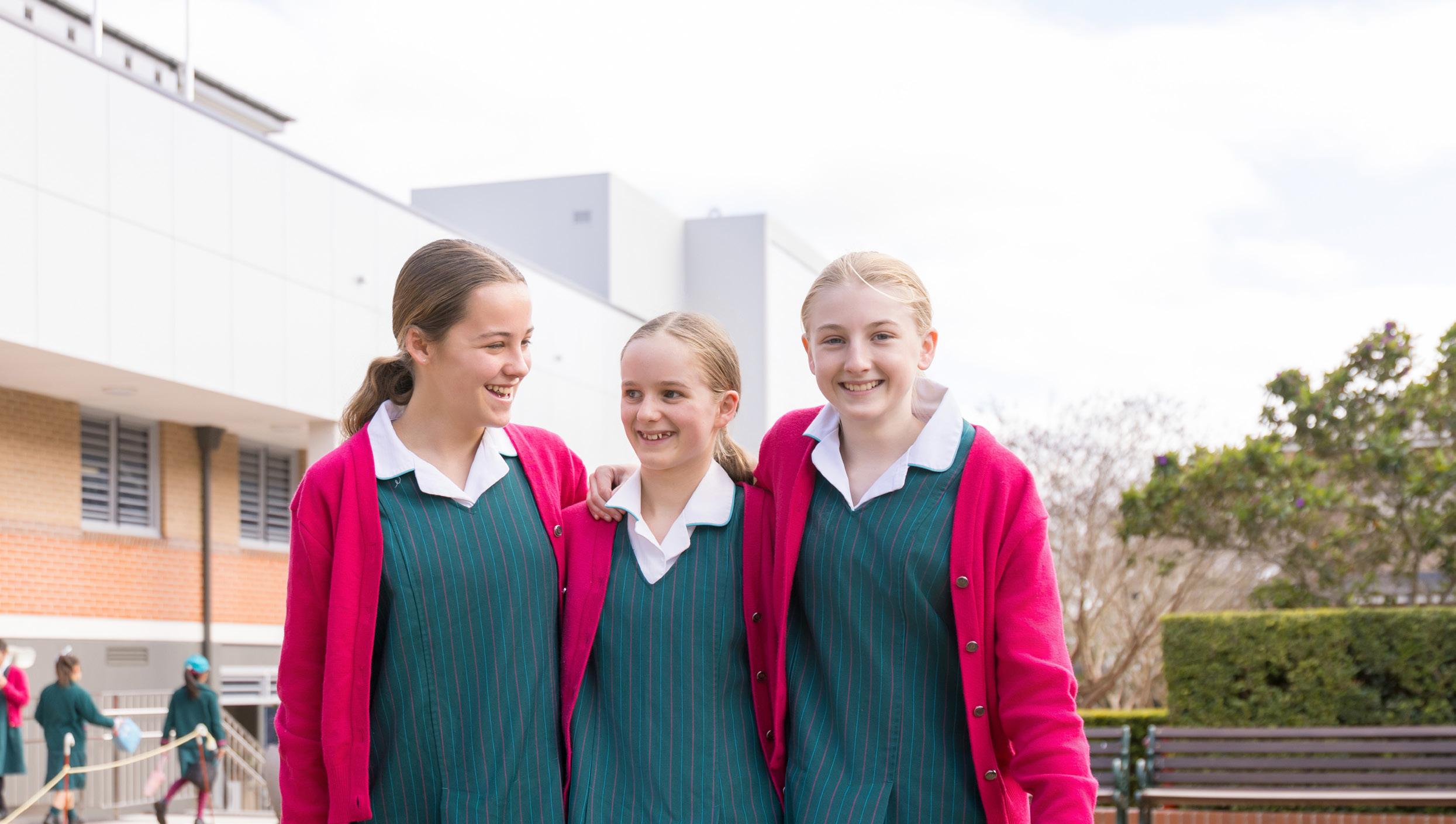
In addition to teachers, there are many people to assist and guide students throughout their secondary schooling.
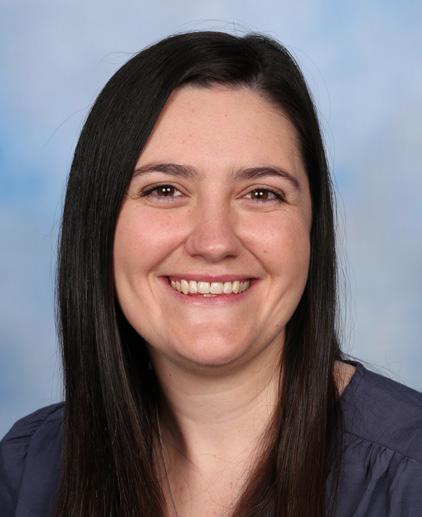
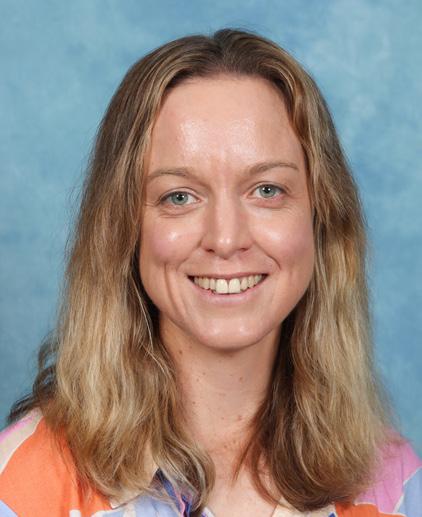
There are a number of ways by which Danebank assists Year 7 students to make the change to high school. The Year 7 Coordinators will help girls to settle in and work with the group over the years ahead. They are committed to providing support for each girl and will liaise with parents and the girls.
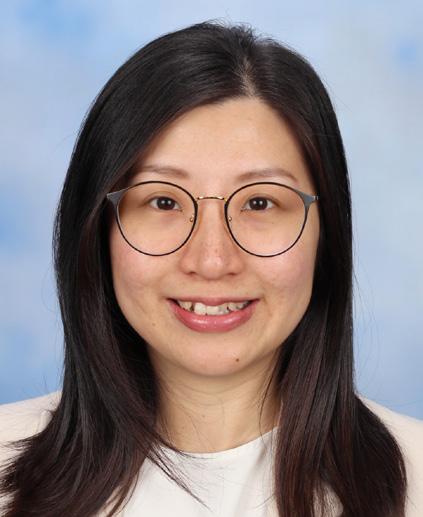
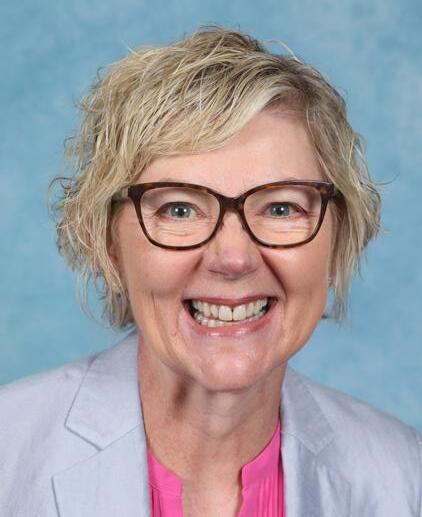
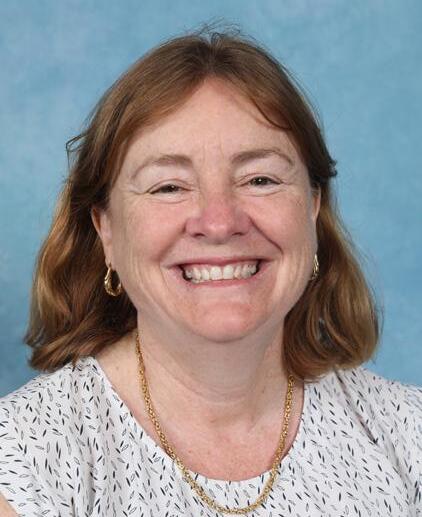
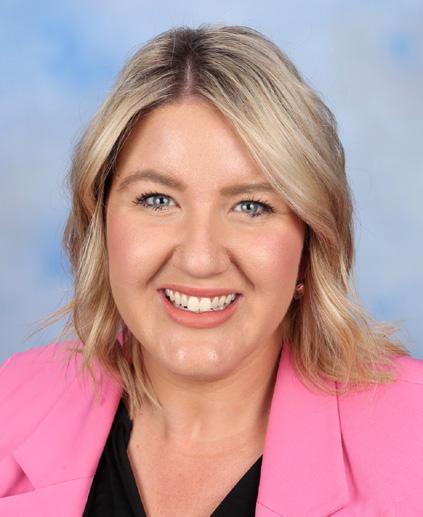
The wellbeing toolkit supports students to flourish in every aspect of life. It’s normal to need some help with wellbeing sometimes. It’s ok to not always be flourishing.

Strengths are my personal characteristics, abilities or qualities that feel natural, enjoyable and energising to me.
I am created by God. I am loved and unique. I am on a journey, learning who I am and what I can contribute to the world.
I know my best traits and I can enhance my wellbeing by growing what is already good about me.
Using my strengths will help me succeed and overcome challenges.
My strengths allow me to be the best version of myself.
I can notice and name how I am feeling. I can tune in to how others around me might be feeling. I can reflect on what has caused me to feel a certain way. I can express and manage my emotions in healthy and positive ways.
I have some strategies I can use to regulate my emotions such as:
• Praying to God
• Deep breathing
• Choosing to focus on gratitude
• Spending time in nature
• Reframing negative thoughts
• Positive self talk
and awareness
• I can pay attention and focus. When I get distracted, I can bring myself back.
• I can be present and aware of what is going on around me.
• I am tuned in to joy and I can savour the good and beautiful moments in my life.
• I can focus my attention in healthy, positive directions.
• Mindfulness is one strategy I can use to help me focus, be present and settle worried thoughts.
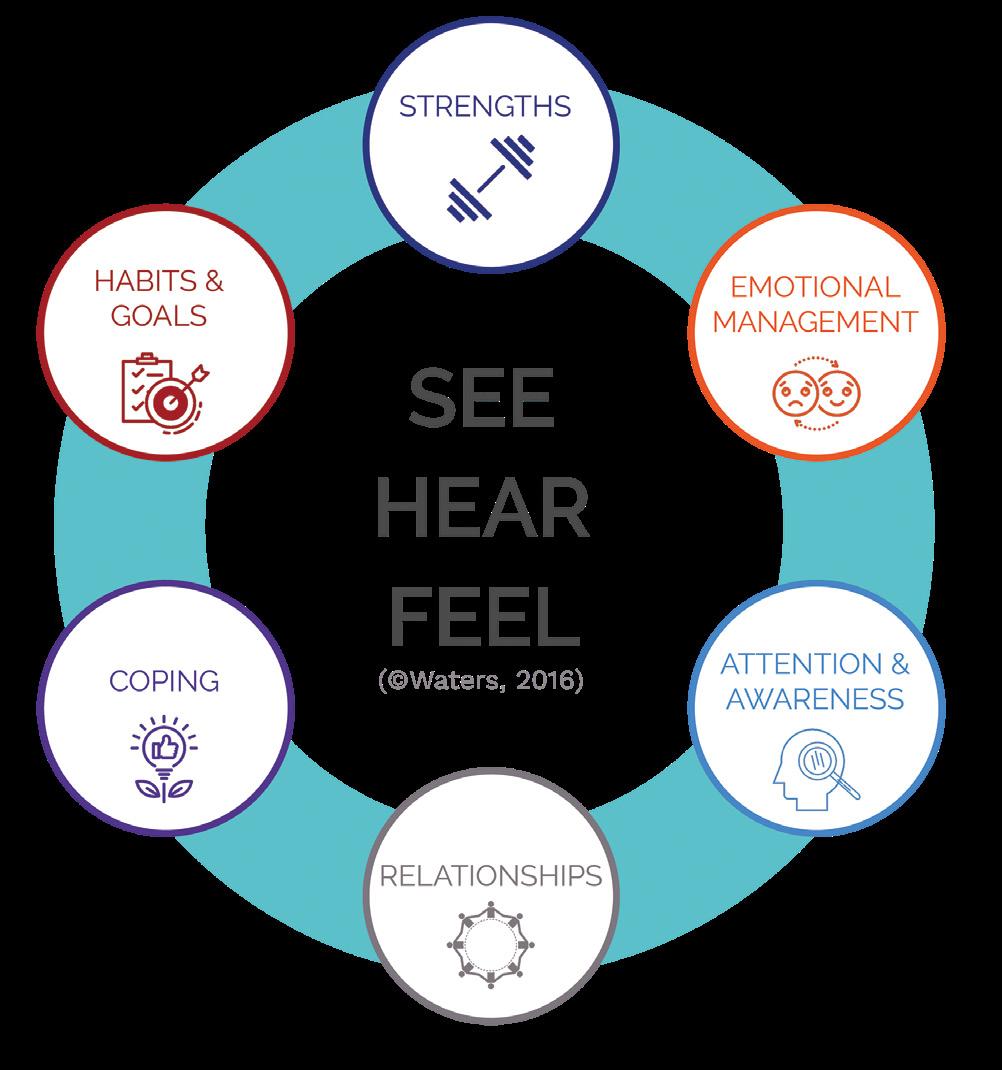
• I can be a supportive friend and build healthy, positive relationships.
• I can look for ways to show kindness to others.
• I can strive to be a curious and active listener.
• I know I need trustworthy adults in my life who believe in me and will listen to me.
I can build resilience and grit to bounce back and cope when life gets hard.
I have resources to manage the demands of my life. Such as:
• Asking for help when I need it.
• Knowing what calms me down.
• Knowing how to reframe unhelpful feelings.
• Using my Growth Mindset.
• Handing over my worries and fears to God in prayer.
My life can have a sense of meaning, purpose and direction.
I can set goals and build healthy habits into my life that can help me progress toward my goals. Such as:
• Quality sleep - undisturbed and restorative
• Exercise - I can regularly move my body in a way that brings me joy
• I can make wise choices about what I put into my body
• I can choose a balanced approach to screens
• I can build my skills in organisation and time management to feel calm and in control
• I can spend time growing my relationship with God through Bible reading, prayer and reflection.

We are thankful to have fabulous School Counsellors. Students can self-refer to the School Counselling Team by emailing them directly at counsellor.senior@danebank.nsw.edu.au or by contacting their Year Coordinator.
Our dedicated Counselling Team works to provide excellent support for our students on a daily basis. The School Counsellors are experienced in addressing a wide range of psychological and psychosocial issues including:
• Mental health concerns (e.g. depression, anxiety, eating issues/body image, grief/loss)
• Emotion regulation, behaviour management and stress management strategies
• Academic concerns (e.g. stress, study skills, organisation and schedules, time management, goal setting)
• Social relationships
• Friendship and family concerns
They provide individual support, group mediation, short term therapeutic interventions, referral options and transition support.
They work collaboratively with staff across the school to develop appropriate school-based support for students and families (e.g. topic talks, social skills groups, parenting groups). At times psychometric assessments may be needed and will be discussed with you if the need arises.
Students are allocated to a Counsellor and appointment times are arranged during school hours in term time only. The frequency of sessions is determined based on the students needs and the counsellor availability. Contact may be a single appointment, emergency session, assessment only or a short term therapeutic intervention across a specific period of time. Referrals to external providers will be made for longer term, more intensive or complex concerns. In these circumstances the counsellors can work collaboratively with external practitioners.
In the Senior School, students self refer to counselling or can be referred for counselling by their Year Coordinator, Assistant Head of Senior School (Wellbeing), Deputy Principal Senior School or parents. Referrals for counselling can be made directly to the School Counsellors via email: counsellor.senior@danebank.nsw.edu.au
Senior School students can make appointments directly with their Counsellor. Appointments are entered into the electronic roll on the day of an appointment and recorded as “Appointment”. No specific details are given.
If a student is unable to attend an appointment or is absent from school, they should email their Counsellor to cancel the appointment prior to the appointment time. All senior students who attend counselling must sign a counselling consent form. Students under the age of 15 years, require parental consent.

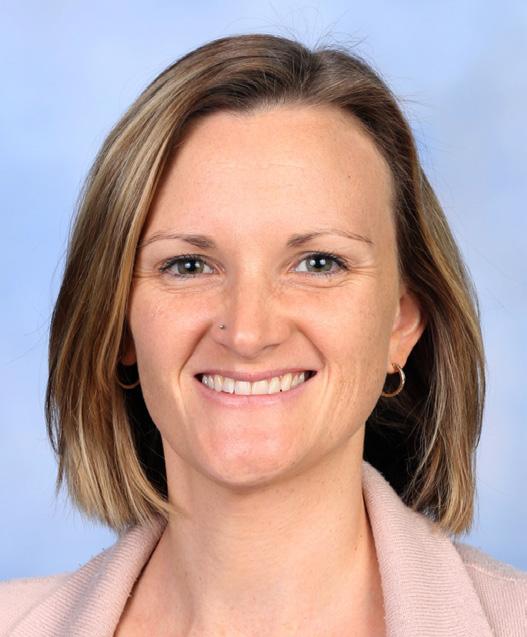
Ms Marissa Hanslow MCouns&Psyc, GradDipCouns, BSocWork, DipChildServices marissa.hanslow@danebank.nsw.edu.au
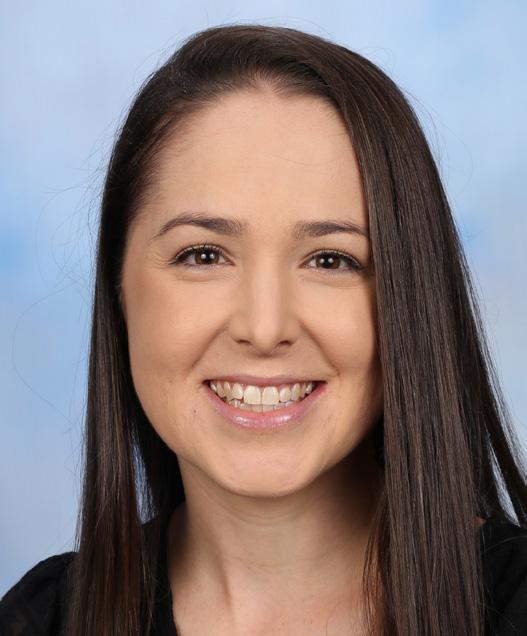
kate.middleton@danebank.nsw.edu.au
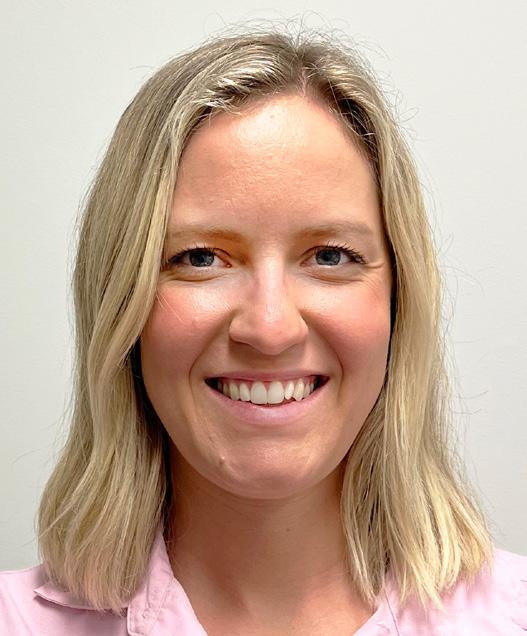
Mrs Rebecca Naoum BBus, MSocWork, GradDipChristianLeadership rebecca.naoum@danebank.nsw.edu.au
In the Senior School, parents will be informed when access to the School Counsellors is made for students under the age of 15 years, in line with legal reporting requirements. Students over the age of 15 years may directly refer themselves for counselling services. Sharing of information with staff or parents only occurs with the consent of the student.
At times, it may be necessary for the School Counsellors to communicate the contents of discussions or records to the Principal, Year Coordinator, class teacher, or Deputy Principals. Disclosure will only occur in order to discharge the school’s duty of care and with a student’s wellbeing in mind.
Additionally, where matters of risk of harm to the student are involved, disclosure to the relevant people who can keep the student safe are made in collaboration with the student and parents as much as possible, regardless of age.
If parents have concerns about their daughter, they are always welcome to call and discuss these concerns with one of the School Counsellors, regardless of whether their daughter is being seen or not. Except in exceptional circumstances, there is always a School Counsellor from the Counselling Team present in the school each day.
The Counsellors maintain secure and confidential records for each student they see. In the event of significant risk of harm the Counselling Team, the Principal, or the Principal’s delegate, has authority to access the relevant information within a students counselling file in the interests of student safety and wellbeing.
Students may access external professionals as part of their care, including psychiatrists, private psychologists, family support workers, counsellors or other physical or learning support workers within the community.
School Counsellors are available to discuss and refer students and their families to the most appropriate service for their current needs when they are unable to provide a service within the school environment. This will be done with appropriate transition support and follow-up feedback.
School Counsellors are also able to liaise and consult with external professionals as appropriate to support a student’s care while at school. Consent will be obtained from students and/or their parents in these instances.
The Positive Behaviour Code and Policy (hereafter called the Positive Behaviour Code) applies to all Danebank students, always, including within classrooms, playground, Chapel, assembly, library, co-curricular activities, excursions, sport, camps, travel and any other Danebankrelated activity.
The Danebank values are the guiding principles that underpin the Positive Behaviour Code. These values are:
• Compassionate Service
• Creative Collaboration
• Respectful Relationships
• Courageous Optimism
• Personal Excellence
• Loving Kindness
• Taking Responsibility
Danebank aims to provide an engaged learning community in which students acknowledge their responsibility to manage their behaviour while respecting the rights of others to teach and learn within a safe and supportive environment. The School strives to work in partnership with parents and carers, balancing disciplinary consequences and educative responses to issues of student behaviour.
Danebank recognises its responsibilities in relation to the Children and Young Persons (Care and Protection) Act 1998. In particular, the School’s approach, outlined in this policy, explicitly excludes and prohibits the use of corporal punishment in disciplining students.
All Danebank staff, students and parents are required to commit to upholding the Positive Behaviour Code.
The Danebank Positive Behaviour Code defines how we live within the Danebank community and how we interact with others.
All staff support positive student behaviour with a wide range of preventative and strengths-based strategies, cultivating classroom climates that encourage positive social relationships and are conducive to learning.
We take time to acknowledge and encourage instances of positive behaviour through acts of recognition and affirmation. Sometimes students may not adhere to the Danebank Positive Behaviour Code for a variety of reasons. In such instances responsive action may be taken.
This action will be underpinned by appropriate disciplinary consequences, educative responses and restorative practice. Restorative practice seeks to repair relationships that have been damaged, in partnership with the students
involved. Through a set of reflective practices, the students are guided towards empathy, remorse, restorative action and forgiveness.
Danebank students:
• Show respect for themself, others, property and the Danebank community through their words and actions.
• Respect diversity and demonstrate understanding, equality, inclusion and tolerance to one another regardless of nationality, religion, beliefs, socioeconomic status, gender, disability, age or sexuality.
• Maintain an open-minded attitude to Christianity and respect the Christian basis of the School.
• Are considerate, kind, caring, inclusive and compassionate in their interactions with peers and staff.
• Interact with each other in an appropriate and respectful way that does not exclude others.
Danebank students:
• Are honest and take responsibility for their actions, attitudes and behaviours.
• Are polite, prepared, punctual and engaged in school activities.
• Are learners who are courageous in embracing mistakes and learning from them.
• Strive for personal excellence.
• Actively contribute to the positive representation of the Danebank community by wearing their uniform with pride.
Danebank School Rules and Expectations are published annually in Student Diaries and provide specific information about what is considered inappropriate or unacceptable behaviour.
These rules and expectations are based on the following foundations:
• Supportive learning environments
• Respectful relationships
• Taking responsibility
• General health and safety of students
As outlined in Danebank’s Conditions of Enrolment, it is a requirement that all students abide by the School’s standards of behaviour.
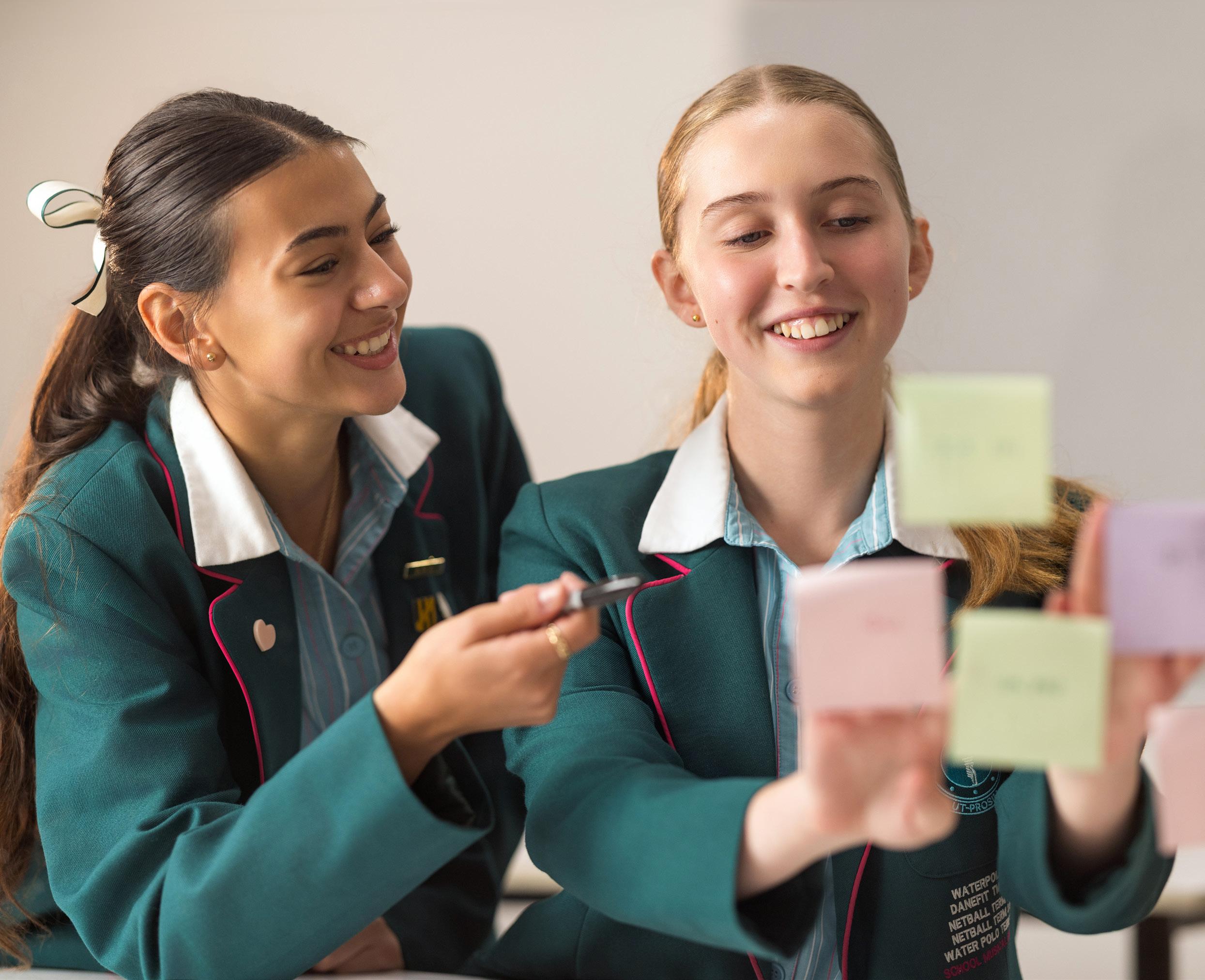
At Danebank, bullying is taken seriously and is unacceptable in any form. It is essential that bullying behaviour or suspected bullying behaviour be reported to eliminate its presence at Danebank.
Any student who has been bullied or has witnessed bullying behaviour as a bystander, should report the incident to a trusted adult in the School community such as:
• Class teacher
• Stage / Year Coordinator
• Assistant Head of Junior / Senior School
• Deputy Principal Junior / Senior School
• School Counsellor
The incident will be investigated.
Parents / carers are encouraged to contact the Year / Stage Coordinator or Deputy Principal Junior or Senior School or a trusted adult at the School, if they suspect any bullying behaviour.
Danebank subscribes to the National Definition of Bullying in schools:
• Bullying is an ongoing and deliberate misuse of power in relationships through repeated verbal, physical and/or social behaviour that intends to cause harm.
• Bullying can happen in person or online and it can be obvious (overt) or hidden (covert). Bullying of any form can have immediate, medium and long-term effects on those involved, including bystanders. A bystander is someone who either witnesses or knows about bullying behaviour that is occuring.
• Single incidents and conflict/fights between equals, whether in-person or online, are not defined as bullying.
• Such incidents are still unacceptable and taken seriously in line with our Positive Behaviour Code.
If any bullying-type behaviours occur only once, or are part of a conflict between equals (no matter how inappropriate) this is not bullying. The behaviours alone don’t define bullying.
Any harassment, intimidation or bullying concerns are addressed in accordance with Danebank ‘s No Place for Bullying Policy and Guidelines
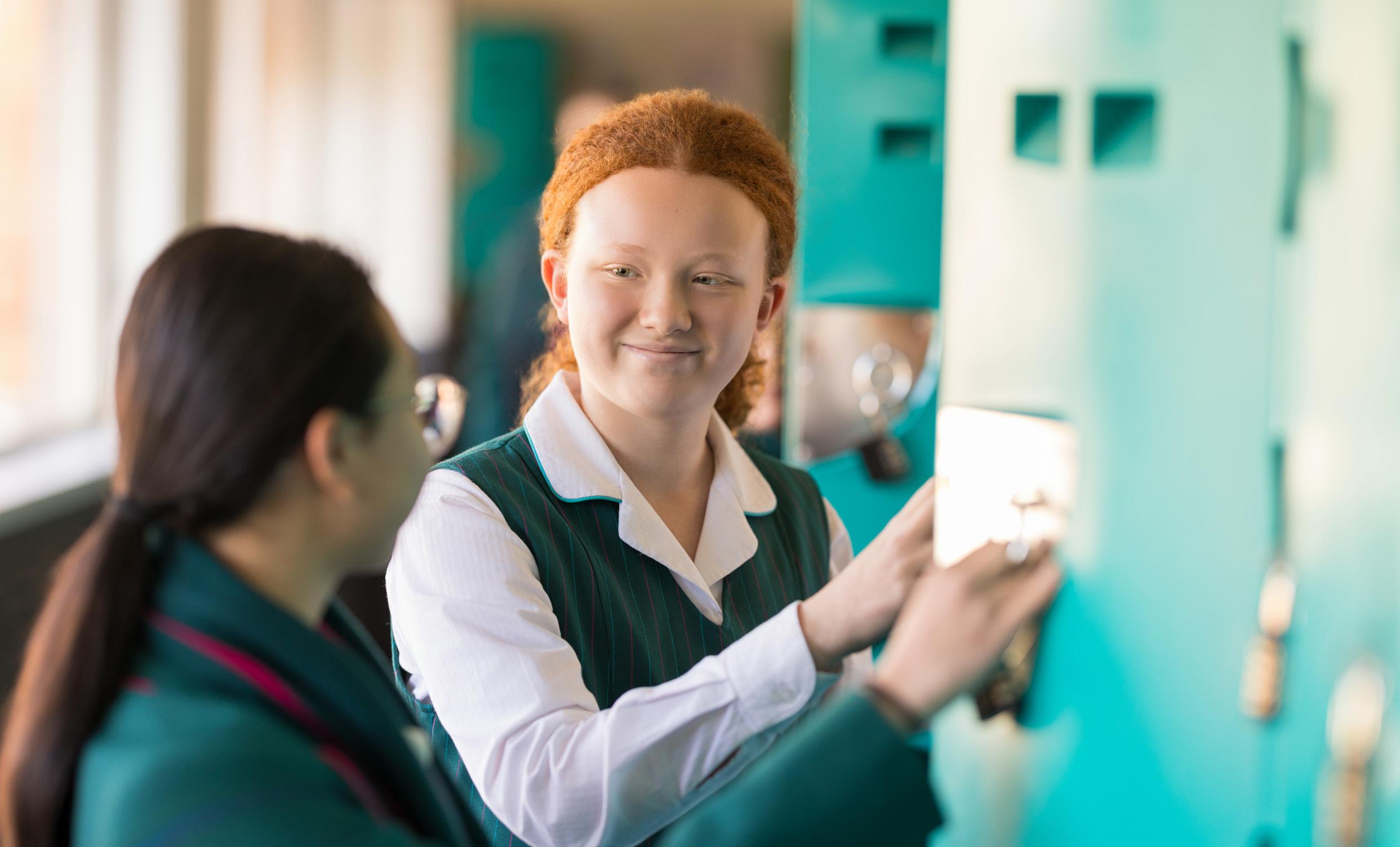
Danebank acknowledges and applies the fundamental principles of procedural fairness and unbiased decision making when considering and applying consequences and disciplinary measures. All staff support positive student behaviour with a wide range of preventative and strengthsbased strategies, cultivating classroom climates that encourage positive social relationships and are conducive to learning.
Effective and appropriate responses by the School to behavioural and disciplinary matters support the maintenance of a positive and productive learning environment for all students.
The Danebank School Behaviour Management Procedures Flow-Chart (Senior School and Junior School) outlines our approach to behaviour management, including the operating structures and steps in place to support all students to adhere to the Positive Behaviour Code.
When there is a breach or consistent breach of the Positive Behaviour Code, the steps outlined in the Danebank School Behaviour Management Procedures Flow-chart will be followed.
Please note:
As outlined in the Conditions of Enrolment, the School reserves the absolute right to proceed directly to suspension, probation or expulsion, depending on the severity of the circumstances and an individual student’s record, with due regard to procedural fairness as outlined in Section 4 of this policy.
When the Positive Behaviour Code is breached, Danebank is committed to:
• Developing a student’s understanding that there are consequences for actions.
• Developing a student’s understanding of the importance of taking responsibility for their actions.
• Providing the opportunity for students to make amends using restorative practice.
• Supporting students to make better choices in the future.
• All consequences are subject to the determination of the Principal.
The consequences below may result from breaches of the Positive Behaviour Code. Each student and case is unique and will be handled with care, wisdom and consideration for the context and individuals involved.
Where possible, the consequence will focus on the student making amends and making better choices moving forward without condemnation. The nature of the misdemeanour will determine how the consequence is served. A reparation may be issued and this means that a student has an opportunity to repair what has been fractured within the School community.
Lunch Time Reparation (First half of lunch)
Reasons could include:
• Student not complying with the Positive Behaviour Code and Policy, expected behaviour for the classroom, playground, other school activities or at Assemblies, and Chapel or other events that may affect the School community
• Uniform: two infringements issued in a term
• Cardigan / jersey as the outer garment, outside the school grounds
• Misuse of technology: two infringements issued in a term
• Mobile phone sighted: two infringements issued in a term
• Lateness to school: three times per term without parental explanation
• Fractional truancy from school
• Chewing gum
• Mean behaviour
After School Reparation (45 minutes: 3pm to 3.45pm)
Reasons could include:
• Repeated non-compliance with the Positive Behaviour Code in the classroom or playground, other school activities or at Assemblies, and Chapel or other events that may affect the School community
• Non-compliance with the Positive Behaviour Code in travelling to and from school
• Non-compliance with the Positive Behaviour Code or Acceptable Use of Technology policies
• Harassment and/or mean behaviour
• Misuse of technology (three or more infringements issued in a term)
• Mobile phone sighted (three infringements issued in a term)
• Persistent uniform infringements (three or more issued in a term)
• Persistent lateness
• Truancy from school
• Failure to report for a lunchtime reparation
Suspension (in-school and/or out-of-school)
Reasons could include:
• Ongoing non-compliance with the Positive Behaviour Code or other school policies such as No Place for Bullying, Uniform and Acceptable Use of Technology
• Persistent truancy from school
• Fighting or physical abuse
• Significant damage to school and/or personal property
• Persistent or significant verbal abuse towards other students or staff
• Serious misbehaviour in the classroom, playground, public or during any other school related activity
• Smoking, including e-cigarettes and vaping in any form, when in uniform or at school events
• Possession or use of illicit drugs, alcohol, drug paraphernalia or smoking implements, including vapes, when in uniform or at school events
Reasons for expulsion could include:
• Persistent and severe breaches of the Positive Behaviour Code or other school policies such as No Place for Bullying and Acceptable Use of Technology.
Procedural fairness comprises what is sometimes described as the hearing rule and the right to an unbiased decision. Consequences of a breach of the Positive Behaviour Code are based upon the seriousness of the breach and/or on prior disciplinary action. Cases are considered carefully on an individual basis when determining responses to breaches of discipline.
In this policy, procedural fairness means that, where suspension, exclusion or expulsion is being considered, the student against whom an allegation of inappropriate behaviour has been made and their parent(s)/carer(s) have the right to know the process by which the matter will be considered, and relevant details of any allegations.
They also are to be allowed to respond to the allegations, and know how to seek a review of the decision made in response to the allegations. Procedural fairness includes making available to students and parents or caregivers policies and procedures under which disciplinary action is taken.
In matters where a long suspension or expulsion is contemplated, the gravity of the circumstances requires particular emphasis to be given to procedural fairness. This includes the offer of having a support person / observer attend formal interviews. The School may make initial enquiries into a matter without parents being present or informed of such enquiries being made. The views of all parties will be considered.
While it is generally preferable that different people carry out the investigation and decision-making, in the school setting this may not always be possible. If the Principal is conducting both the investigative and decision-making stages, he or she must be reasonable and objective. While it is difficult to combine the roles of investigator and adjudicator, it is acceptable to do so given the nature of the Principal’s responsibilities. Nevertheless, it may be preferable to have another appropriate officer, such as the Deputy Principal Junior or Senior School, carry out the investigation where possible. The review mechanism adds to the fairness of the process.
Procedural fairness will be accorded to all students and parents in the event of disagreements. The final decision for the appropriate course of action is made by the Principal. The School’s Complaints Handling Policy and Procedures provides further specific details about ways in which complaints are managed by the School.
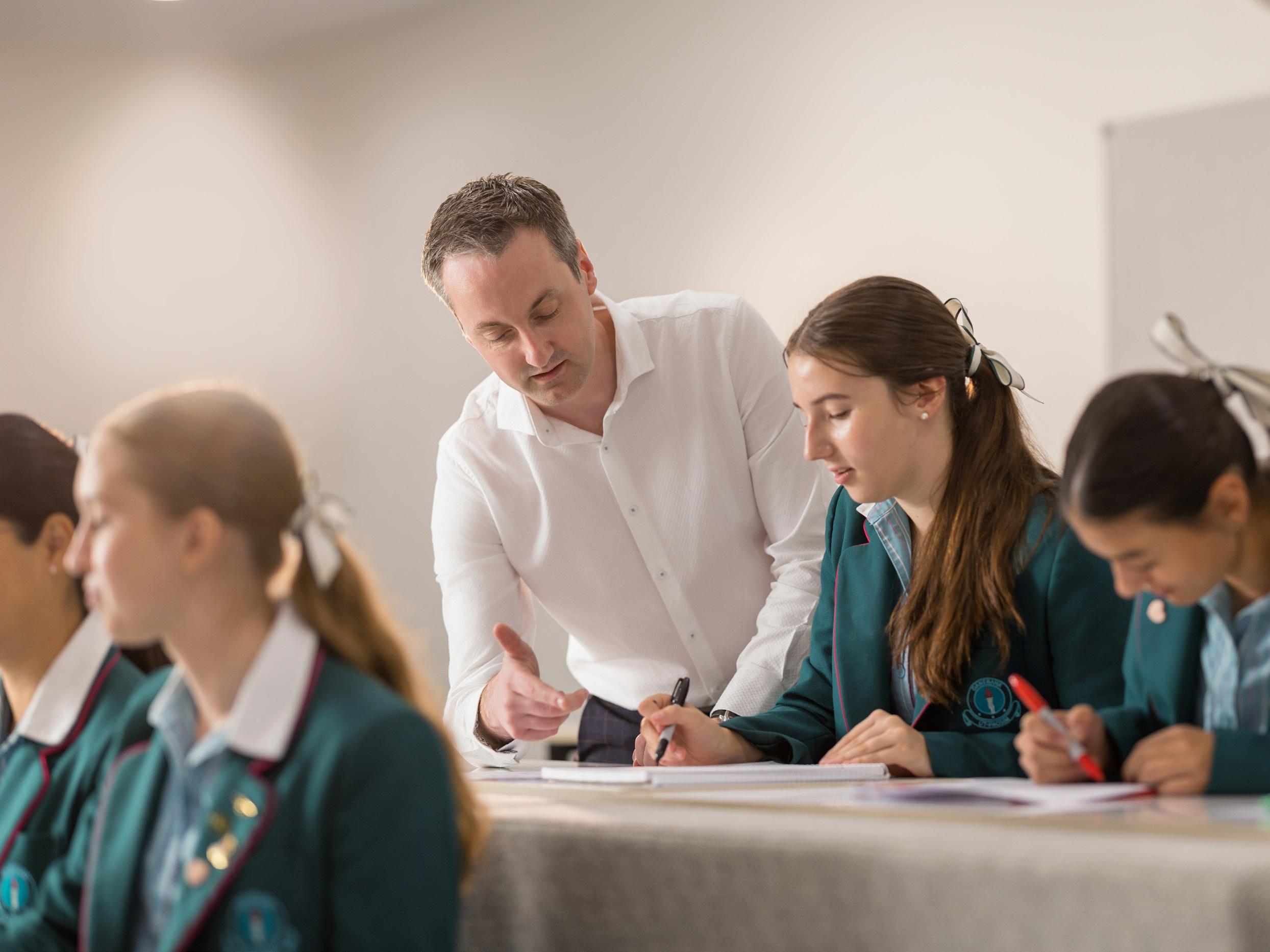
The Academic Curriculum consists of a range of compulsory studies covering each of the Key Learning Areas. In Years 7 and 8 (Stage 4), students study a broad-based curriculum designed to give them opportunities to “taste” as many subject areas as possible. Students will choose electives for study from Year 9.
Our approach to learning is holistic and typified by remarkable academic results, as well as the depth of enriched learning and wellbeing programs which develop the broader base of skills, dispositions, habits of mind, values, attitudes and character that students need to flourish.
There is a broad suite of learning opportunities at Danebank across a multi-faceted curriculum, including leadership, humanities, STEM, creativity, languages, the Arts, service learning, outdoor education and extensive co-curricular opportunities.
Danebank staff are passionate about learning and deeply committed to the wellbeing and growth of each girl. Our heart to serve and vision to improve drives our collaboration, innovation and pursuit of the best for ourselves and our community.
As a Christian learning community we are a place of connection and purpose. We focus on creating the optimal conditions of growth within our distinctive culture. Each girl is encouraged to identify and develop her strengths, strive for personal excellence and develop a personal commitment to service.
Danebank students become powerful learners through the Danebank Approach to Learning.
This means students understand how they learn and are always working to become better learners.
We do this through the five dimensions of the Danebank Approach to Learning.

RELATIONAL LEARNING
Interdependence
Empathy / listening
Collaboration
Imitation

FAITH & CHARACTER LEARNING
Courageous optimism
Compassionate service
Respectful relationships
Creative collaboration
Taking responsibility
Personal excellence
Loving kindness

REFLECTIVE LEARNING
Meta learning
Planning
Revising
Distilling

RES OU RCEFUL LEARNING
Curiosity / wonder
Questioning
Making links
Capitalising
Reasoning

WELLBEING LEARNING
Strengths
Emotional management
Attention and awareness
Relationships
Coping
Habits and goals
As a result of the Academic Assessment test held in October, girls will be placed into 6 classes for Year 7 for the following year.
We also look at NAPLAN results, along with feedback from teacher reports, to help determine classes. Students in the most able grouping may also be invited to join a small Mathematics accelerated class based on their grading test results.
Students engage in these classes for the majority of subjects. There is a mixing of students for Visual Arts and TAS as well as Connect groups in order for the students to get to know other students within their year group.
Anomalies in our class placement could emerge in the first few weeks. If that is the case, there could be further testing of individual students. Generally, once students are settled into their classes it is wise to leave them where they are for the year. This maintains their existing relationships and continuity of learning.
Results of the grading test are not disclosed to parents or students. At the end of Year 7 all students will move into Year 8 classes that have been determined by the students’ overall results in Year 7 at Danebank.
• Christian Studies
• English
• Geography
• Mathematics (classes based on Mathematics ability)
• Music
• PDHPE
• Science
• Drama
• French and Japanese
Classes with different groupings (generally smaller class sizes)
• Visual Art
• Technology
• Christian Studies
• English
• History
• Mathematics (classes based on Mathematics ability)
• Music
• PDHPE
• Science
• Elective chosen from French or Japanese
Classes with different groupings (generally smaller class sizes)
• Visual Art
• Technology
Formal Reports are issued twice each year and they offer summaries of the students’ ongoing assessment results. The assessment results are represented in full detail on the Edumate portal. Additional reports can be prepared for parents who have a particular concern for their daughter, outside the usual reporting channels. These are arranged through the Year Coordinator.
These are held annually, usually in Term 2. These learning conferences are designed to enhance the partnership between school and home. Parents are encouraged to bring their daughters to these meetings to ensure a collaborative approach to learning.
The Assessment Handbook and other important information can be found on the Edumate Parent Portal home page at the start of the year, via: Newsfeed > Broadcast > Senior School Documents and Handbooks Google folder. Students can also access these directly through Canvas.
The Joyce Cowell Library is a vibrant, flexible resource-rich space. Senior students from Years 7 to 12 are welcome to use this area throughout the school day, both individually or as part of class or study group.
Students have access to a diverse range of physical and digital resources, many of which can be viewed from home. Printing, scanning and photocopying is available in the Library as well as temporary loans of laptop computers.
The Library is staffed by a skilled team of qualified information professionals who are on hand to assist students with all their literature and research queries. The Library manages the acquisition of physical resources, e-Books, databases, digital textbooks and online learning platforms including the digital video collection, ClickView. Senior library hours:
• Monday - Thursday 7.30am - 6.00pm
• Friday 7.30am - 4.00pm (except the last day of term)
Please note: extended hours may be varied in the case of carnivals and other school events
All students are required to participate in three Christian Studies lessons a fortnight from Years 7 to Year 10, Christian Studies or 1 or 2 Unit Studies of Religion in Years 11 and 12, and to attend weekly Chapel Services.
Aims
• To enable students to read the Bible by studying examples of the type of literature encountered there.
• To consider a Christian world-view and alternatives to it.
• To present the gospel in a clear and developmentally-appropriate fashion
Content
As the students at the beginning of high school will have different levels of knowledge about the Bible and how to use it, they are introduced to the Bible – its structure, the names of the books and their genres, different translations, its overall message, the historical eras, people and places encountered in the Bible, and an overview of how we come to have the Bible today. They also learn how to navigate the Bible in various formats before embarking on closer examinations of biblical texts and themes . Some examples of units of work for Years 7 and 8 include Meet the Family (Genesis), Women of the Word, the Big Picture of the Bible and Jesus is the Answer (Gospels).
Students can also participate in a voluntary lunchtime group called FOCUS and attend the annual SIC and FOCUS Camp for a weekend in Term 2. This provides them with the opportunity to engage more deeply with the Bible through presentations by guest speakers, or by joining small group Bible studies and activities that are student-led.
The aim of Stage 4 English is to enable students to understand and use language effectively by learning to appreciate, reflect on and enjoy the English language and to make meaning in ways that are imaginative, creative, interpretive, critical and powerful.
In Stage 4 English students are introduced to the different forms and features of language and structures of texts by increasing their awareness of the purpose, audience and context of a range of texts set for study.
Students, through reading, speaking, writing and representing, will draw on their ever-widening repertoire of language choices to express ideas and understand how language shapes meaning. Students will experiment with form and language in different modes and technologies to produce their own texts for specific purposes and they will build on their skills by planning, drafting and editing to produce polished texts. They will also learn to analyse and evaluate their own and others’ compositions.
In Year 7, students will undertake the following: a close study of a novel, read and write poetry, expand upon their knowledge and understanding of poetic devices. They will analyse a film and learn about film language, study a modern play and consolidate their reading comprehension and persuasive and creative writing skills. Each fortnight, students will spend one lesson in the library reading a novel of their own choice and they are encouraged to challenge themselves to try ever more complex texts. Each term they will complete a Wide Reading to share with their peers.
Throughout Year 7 and 8, students can participate in a range of extra-curricular activities and competitions that will develop their skills in English including: Archdale Debating and Public Speaking, ICAS English Competition, AHIGS Festival of Speech, Danebank’s Next Top Writer and excursions such as theatre visits and play performances.
• English Study Hall
Available one afternoon a week, all Years 7-12 students are welcome to attend and receive assistance and guidance in English.
• Mathematics Study Hall
Available two afternoons each week after school to assist students from Years 7-12 with any questions they may have in relation to their Mathematics study.
• Science Study Hall
Available one afternoon a week, all Years 7-12 students are welcome to attend and receive assistance and guidance in Science.
Aims
During Years 7 and 8, the aim of Mathematics is to enable students to become confident users of mathematics, learning and applying the language of mathematics to communicate efficiently and effectively. They develop an increasingly sophisticated understanding of mathematical concepts and a fluency with mathematical processes that helps them to interpret and solve problems. Students make connections within mathematics and connect mathematical concepts with the world around them. They learn to understand and appreciate how mathematics is a relevant part of their lives.
Students build on their Mathematical knowledge from Kindergarten to Year 6 during Years 7 and 8 Mathematics. They will develop their knowledge, skills and understanding in the four key strands studied. They are, Working Mathematically, Number & Algebra, Measurement & Space and Statistics & Probability. Students study various topics about these strands during the course of Years 7 and 8, such as Algebraic Techniques, Equations, Area, Volume, Pythagoras’ Theorem, Statistics and Probability, just to name a few.
Throughout Years 7 and 8 students may be given the opportunity to strive for excellence by participating in various competitions. Namely, The Mathematics Challenge for Young Australians, The Da Vinci Challenge, The Australasian Problem Solving Mathematical Olympiads and the ICAS Mathematics Competition.
For a small number of students that are exceptional at Mathematics, Danebank also offers an acceleration program. This program requires students to cover the Year 7 and 8 Mathematics course in one year so that students are a year ahead by the end of Year 7. These students then study Year 9 Mathematics during Year 8.
The aim of the Stage 4 Science course is to develop interest in and enthusiasm for Science as well as an appreciation of its role in finding solutions to contemporary science related problems and issues. Students will increase their knowledge and understanding of the nature and practice of scientific enquiry and skills in the process of Working Scientifically.
The aim is also to develop knowledge about phenomena in the natural world and the application of their understanding to new situations, making them lifelong learners and analytical thinkers. An appreciation of the dynamic nature of the development of scientific knowledge and how this can contribute to evidence based decisions within the
community will allow them to become responsible citizens of the world.
This will be achieved by developing an appreciation of the contribution of Science to finding solutions to personal, social and global issues relevant to their lives now and into the future, along with a willingness to use evidence and reason to engage with and respond to scientific and technological ideas as informed reflective citizens. Stage 4 students have 7 x 50 minute periods of Science per fortnight, with a focus on practical skills - working scientifically. Students identify questions and problems that they can test or research scientifically. They select and use appropriate strategies, understanding and skills to generate creative plausible solutions to identified problems. Individually and collaboratively they plan and conduct a range of first-hand investigations, including fieldwork and controlled experimental methods, ensuring that fairness, safety and ethical guidelines are followed.
In Stage 4 students cover topics to describe the action of unbalanced forces on the motion of objects in everyday situations, including the Earth’s gravity. They discuss how developments in scientific knowledge and technology have contributed to finding solutions to problems involving the use of energy transfers and transformations in simple systems and how the solutions may impact on other areas of society.
Students relate the structure and function of living things to their classification, survival and reproduction. They predict the effects of environmental changes on ecosystems and how scientific understanding influences the development of some management practices. They explain the contribution and influence of scientific knowledge and technological advances in finding solutions to contemporary issues and that these solutions may involve ethical considerations.
Students will learn to describe the dynamic nature of models, theories and laws in developing scientific understanding of the Earth, solar system and observed properties and behaviour of matter. They describe processes occurring in and on the Earth and the time scales involved, as well as situations where understanding and skills from across the disciplines of Science are used in exploration for resources and obtaining and processing of materials. They explain how advances in scientific understanding influence the choices people make about resource use and management practices in shaping sustainable futures.
Students relate the physical and chemical properties of matter to how materials are processed and used by society in everyday life. They describe situations where scientific knowledge and collaboration between scientists generates solutions to obtaining and making new substances from the Earth’s spheres.
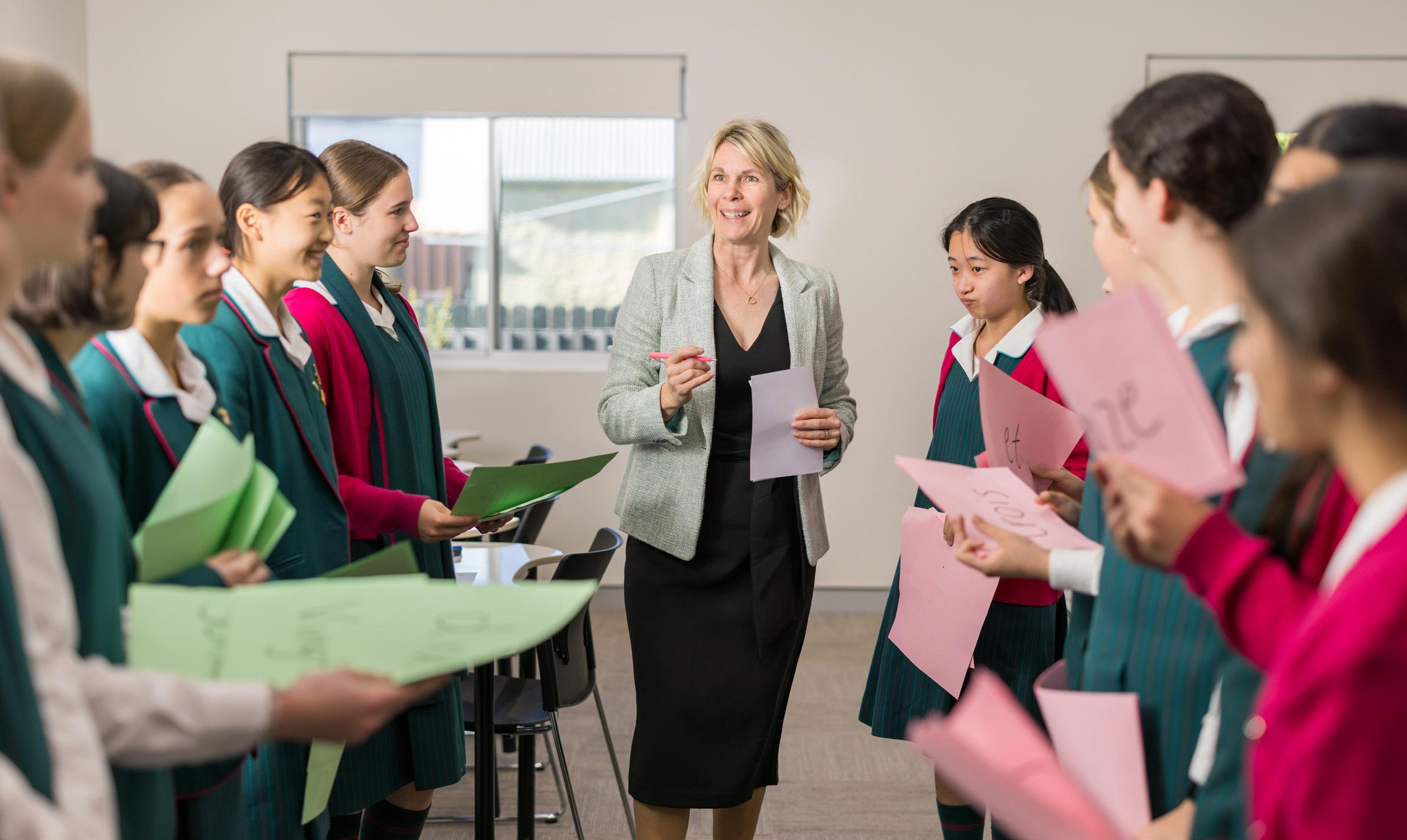
Aims
In Years 7 and 8, students will embark on a journey of language mastery, honing their skills in the two key strands: Communicating and Understanding, as outlined in the NSW syllabus objectives. These foundational years are designed to immerse students in the art of effective communication while deepening their comprehension of the language and its cultural context.
Content
In Year 7, students will embark on a linguistic journey, exploring both French and Japanese, with a semester dedicated to each language and 2 lessons per fortnight. These two languages hold a rich tradition at Danebank, offering a blend of European and Asian perspectives. In French, students will delve into the essentials of Greetings, Numbers, and Self-introductions, laying the groundwork for effective communication. Similarly, in Japanese, they will cover these foundational topics, with a special focus on mastering the Hiragana script. For those eager to advance their Japanese skills from Junior School, a special extension course is available, offering an exciting opportunity to deepen their language proficiency even further.
In Year 8, students will dive deeper into their chosen language—either French or Japanese—over the course of two semesters, with 7 lessons each fortnight. Building on the foundation laid in Year 7, the curriculum will explore an exciting array of new topics to do with the young person’s world, including Family, Pets, Food, and Leisure. Through a blend of three different assessments throughout the year, students will showcase their growing proficiency in
listening, speaking, reading, and writing, both through hand-in assignments and interactive in-class activities. Additionally, they will gain key insights into the cultural backgrounds of the languages they are studying, enriching their understanding of the world.
Drama
Aims
The aim of Drama in Year 7 is to engage and challenge students to maximise their abilities and enjoyment of drama and theatre through making, performing and appreciating dramatic and theatrical works.
Content
Year 7 students study Drama for 2 lessons each cycle, gaining a valuable opportunity to develop:
• confidence
• creativity
• communication skills
• collaboration skills
The topics explored are:
• Improvisation. The girls participate in a range of games and activities and are introduced to key concepts of improvisation as they collaborate in group situations to create improvised drama.
• Scripted Drama. In this unit students learn about the conventions of Reader’s Theatre while they adapt short stories, write scripts and present them to an audience.
• Fairy Tales. Students learn about play-building as they reinvent traditional fairy tales and learn how to devise, structure and perform their own original play in groups.
• Creating Characters. Students continue to develop their confidence and improvisation skills as they explore characters of their own imagining and learn about the use of voice and movement as they perform these characters.
• There is no formal assessment or reporting for this subject, the focus is on participation in creative experiences. Assessment for learning will consist of observation and feedback as students undertake class activities and present performances. At the end of each semester students will receive a feedback sheet indicating their level of achievement.
• Extra-curricular opportunities are available to students to participate in musicals, plays and Theatresports.
Music is an important part of all our lives. For those who study music at school, it is both rewarding and beneficial, as it enhances a variety of skills relevant for life. Studies have proven that music study and performance allows for the building of neural pathways which consequently have a positive effect on other areas of academic pursuits.
The aim of Stage 4 music is to provide students with the opportunity to acquire the knowledge, understanding and skills necessary for active engagement and enjoyment in performing, composing and listening, and to allow a range of music to have a continuing role in their lives.
Music in Year 7 builds on the art-form of music experienced in Primary School and has the same conceptual base and theoretical component. The mandatory Stage 4 course provides a firm foundation in knowledge, understanding and skills in music, which can then be built on in Stages 5 and 6 for students who desire to extend their musical experiences and learning.
In Year 7, music students will study the concepts of music, which are: duration, pitch, dynamics and expressive techniques, tone colour, texture and structure the learning experiences of performing, composing and listening a range of styles, periods and genres.
Students are given the opportunity to develop skills in acoustic guitar, ukulele, keyboard, percussion and the drumkit as well as opportunities to play electric and bass guitar, with instruction given in these instruments that are available in the classroom. This gives the students
an opportunity to experience learning a wide variety of instruments for performance. Students learn to use the Garage Band and Sibelius programs as part of the composition component.
Year 7 students are also able to participate in extracurricular activities such as Senior Choir, Concert Band, Bellringers and String Ensemble. As positions become available auditions are held for the Stage Band and the Senior Vocal Ensemble throughout the year.
The study of Visual Arts, in an era of visual bombardment, provides opportunity for students to develop critical and analytical skills that assist in deciphering and decoding the world around them. The study of Visual Arts also empowers students to engage in visual forms of communication by providing opportunities to investigate practical skills and techniques in a variety of mediums.
The aim of Stage 4 Visual Arts is to enable students to develop their abilities to represent ideas, both practically and conceptually, as well as critically and historically, so they can interpret art informed by their understanding of key syllabus concepts.
In Year 7, students are introduced to a variety of artmaking experiences. The exploration of construction and surface decoration is conducted in a Ceramics unit of work based on Pop Art inspired fast food. Drawing skills using line, shape and value form a unit of work with the Elements of Art as the foundation. Portraiture is investigated through contemporary drawing practice, with a visit to the Archibald Prize exhibition as part of the study. Sculpting with soapstone expands students’ practical experience for the year, providing a tactile material to work with.
The syllabus content areas of practice, the conceptual framework and the frames are integrated into these areas in an accessible way, for students of all abilities.
An extra-curricular ceramics class is held after school on Mondays, for students who wish to further pursue their skills and techniques, and includes opportunities to work on the potter’s wheel. Additionally, an after school drawing class is held on a Thursday afternoon, for students who wish to explore this discipline beyond the classroom.
Aims
Geography is the study of places and the relationships between people and their environments. The aim of the Stage 4 course is to stimulate student’s interest in and engagement with the world.
Content
Stage 4 Geography examines four important areas of study through the course – Water in the World, Landscapes and Landforms, Place and Liveability and Interconnections.
These units will be studied in consecutive terms, and will introduce students to many of the skills a geographer needs to be able to successfully navigate in this world. Mapping skills such as understanding direction, scale, area and grid references and distance will all be tackled through the course.
Students will complete a number of assessment tasks in this course. The tasks will give students the opportunity to demonstrate their mastery and proficiency over the content and skills taught throughout the course.
Aims
The aim of the Stage 4 History syllabus is to stimulate students’ interest in and enjoyment of exploring the past, to develop a critical understanding of the past and its impact on the present, to develop the critical skills of historical inquiry and to enable students to participate as active, informed and responsible citizens.
By the end of Stage 4, students describe the nature of History and archaeology, and explain their contribution to an understanding of the past. They describe major periods of historical time and sequence events, people and societies from the past.
Students recognise and explain patterns of change and continuity over time and explain the causes and consequences of events and developments. They describe
and assess the motives and actions of people in the past. Students demonstrate an understanding of the causes and effects of events, past societies and developments over time.
During this course, students will learn about the ingenuity and creativity of the ancient Greeks, the breathtaking achievements of the ancient Chinese and the significance of people and events in Medieval Europe and Feudal Japan. They identify and describe the meaning, purpose and context of historical sources and use the evidence from these sources to support historical narratives and explanations. They identify and describe different contexts, perspectives and interpretations of the past. Students identify and explain different points of view in sources.
PDHPE in Years 7 and 8 is aimed to develop students’ capacity to enhance personal health and wellbeing, enjoy an active lifestyle, maximise movement potential and advocate lifelong health and physical activity.
PDHPE contributes significantly to the cognitive, social, emotional, physical and spiritual development of students. It provides opportunities for students in Years 7 and 8 to learn about, and practice ways of, adopting and maintaining a healthy and more active life. Students will develop their knowledge, skills and understanding in the four key strands studied. They are Self and Relationships, Movement Skill and Performance, Individual and Community Health and Lifelong Physical Activity. Students study various topics about these strands during the course of Years 7 and 8, such as adolescence and change, balancing our lifestyle, respectful relationships and consent, risk taking, mental wellbeing, sports nutrition and drug use, just to name a few.
Once a week students have a theory lesson, where they develop their health literacy and critical thinking skills and consolidate their understanding of health issues facing young people. They also partake in a practical lesson where the focus is on the value of movement, physical activity, physical literacy and physical education to build
The Danebank After School Study Centre is run in the Library. Recent Year 12 Danebank graduates, who were high achievers in the HSC and are currently studying at university, are available to students for support and advice on Tuesdays and Thursdays 3pm-5pm. Student attendance at the After School Study Centre is entirely voluntary and the support offered is directly responsive to student need.
Students may choose to complete some home study, ask for help with study strategies, plan for assessments, access advice about major work projects or just to talk to someone about how they are feeling at that moment.
The After School Study Centre is designed to run alongside and complement the teacher-led Study Halls in Mathematics, English and Science.

knowledge, understanding and skills for a lifetime of physical activity.
Throughout Years 7 and 8 students learn through movement experiences that are both challenging and enjoyable, and improve their capacity to move with skill and confidence in a variety of contexts. It helps to promote the value of physical activity in their lives. This learning in PDHPE also helps to encourage young people to take a positive approach to managing their lives and equips them with skills for current and future challenges. It helps them to take responsibility for their own learning and of a commitment to continue learning throughout life.
The study of Technology Mandatory in Years 7–8 enables students to become responsible users of technologies and designers of solutions. Through the practical application of knowledge and understanding, students develop skills in the safe use of a range of technologies to design, produce and evaluate solutions to identified needs and opportunities.
Aim and objectives
Students:
• develop practical skills with tools, materials and processes while working safely, independently and collaboratively on design projects
• develop thinking skills when designing and producing digital and non-digital solutions
• develop and apply skills in project management and evaluation when designing and producing solutions.
• appreciate the contribution and impact of innovation and technologies now and in the future
• appreciate the dynamic nature of design and production processes and how they are used to develop solutions to personal, social and global issues
• appreciate the finite nature of some resources and the impact of their use on the environment and society
• value the development of skills and gain satisfaction from their use to solve problems and create quality products
Knowledge and understanding of technological content is developed through pedagogical approaches, such as project and problem-based learning. Through the production of innovative solutions to contextually relevant problems, students are provided with opportunities to use a variety of thinking strategies, embrace new concepts and learn through trialling, testing and refining ideas. The practical nature of Technology Mandatory engages students in design and production activities as they develop safe practices and refine skills working with varied materials and production technologies. These authentic learning experiences provide students with a sense of satisfaction and are the foundation for life-long learning. Students develop knowledge and understanding of the Technology contexts through the Design and Production of solutions to meet identified needs or opportunities.
Year 7 Technology focuses on the following contexts:
• Agriculture Technologies/Digital Technologies
• Engineered Systems/Digital Technologies
• Materials Technologies - Multimedia Design/Digital Technologies
Year 8 Technology focuses on the following contexts:
• Food Technologies/Digital Technologies
• Materials Technologies - Accessories Design/Digital Technologies
• Materials Technologies - Polymers Design/Digital Technologies
Each year, students will rotate through three different contexts of Technology. Assessment is used to determine how well the students have achieved the objectives and the outcomes of the course. Students will be assessed through a range of activities and design projects. At Danebank students are assessed on their work for each Design Specialisation studied. We challenge the students to appreciate and use as many forms of Technology as possible.
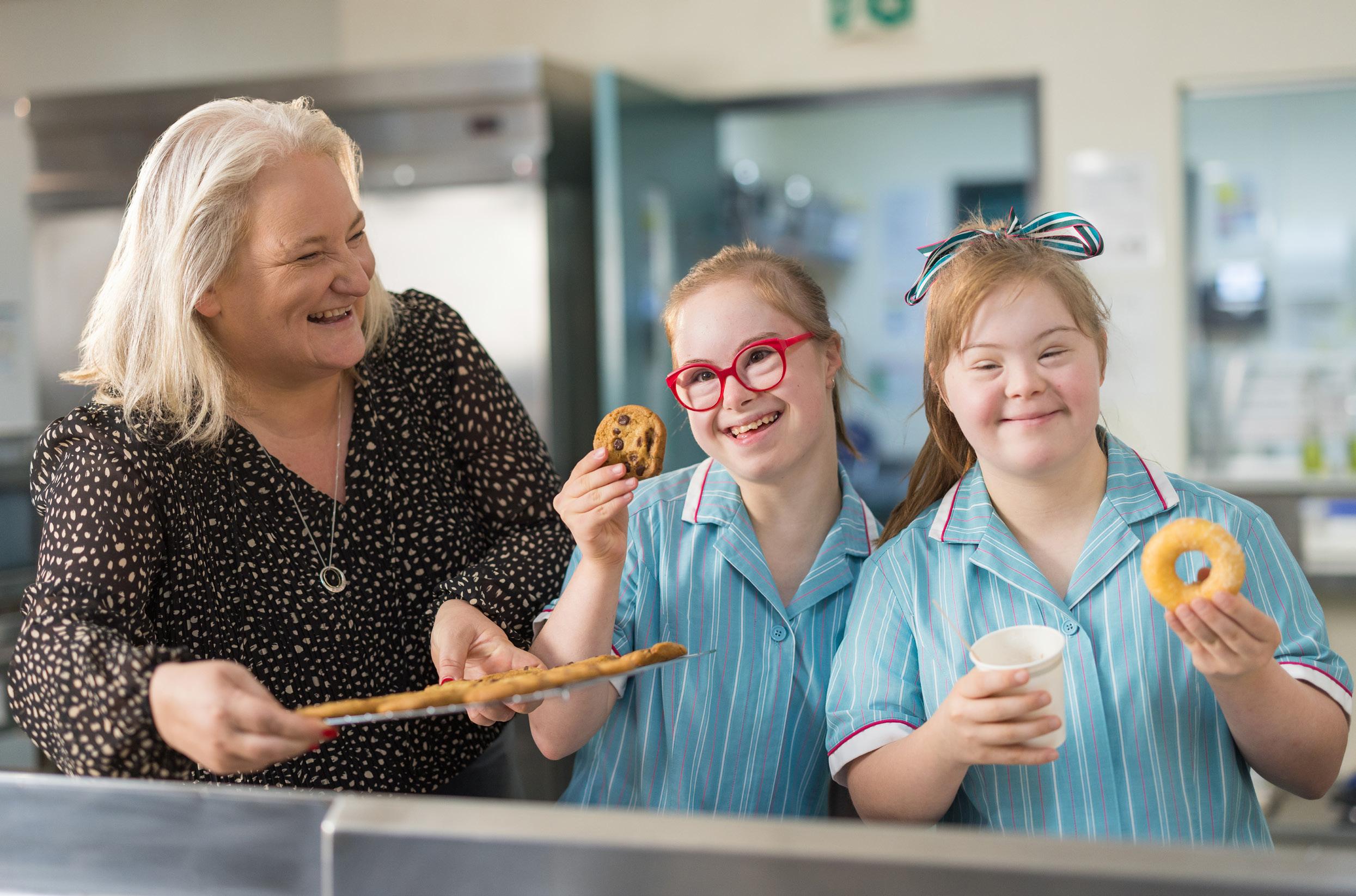
Our Roseby Class students follow programs that are individually appropriate in a welcoming and encouraging classroom environment. We place strong emphasis on resilience and social skills, with girls developing the skills to help them establish independence and work-readiness.
Roseby Class programs cater for students with mild to moderate intellectual disabilities.
There are two classes, one group studying in Years 7 to 10 and the other in Years 11 to 12. Each student follows a program to meet individual goals that satisfies a NESA syllabus titled Life Skills. The programs are developed in consultation with staff, parents, students and relevant external experts.
Developing of confidence
Students are well accepted and mix within the broader school community. The friendships that result lead to the development of social skills and confidence in our Roseby Class students.
Moral development
As a Christian school, Danebank aims to encourage students’ understanding of the Christian faith and the development of personal values.
We seek to have an active partnership with parents and caregivers, encouraging their involvement in the various stages of the program.
Part of a whole school
Students in Years 7-12 undertake student wellbeing programs, sports and attend activities with their year group.
Students contribute to all whole-school events, such as Form activities, Sports Carnivals and House Festival Day, as well as extra curricular activities and clubs.
Danebank Approach to Learning
The students in the Roseby Class become powerful learners through the Danebank Approach to Learning.
This means students are taught to understand how they learn and are encouraged to improve their learning.
Individual learning
Students follow programs that are individually appropriate so that each student can work and achieve to the best of her ability. Each student under-goes individual and ongoing assessment. On the completion of Year 10, students receive a RoSA and Year 12 the HSC.
Careful consideration is given to the academic and social needs of each student. Many girls who have graduated from the Roseby class have successfully entered the
workforce through a job agency or continued their learning with further study.
While programs are designed to meet individual goals, there is also an emphasis on the development of interpersonal skills and respect for others.
Subject areas for Years 7 to 10 include English, Mathematics, History, Geography, Drama, Science, Visual Art, Languages, Design and Technology, Christian Studies, PDHPE and Music. Years 11 and 12 students study English, Maths, Work & Community, Technology, PDHPE, Christian Studies and Science.
Students in Years 11 and 12 attend work experience one day a week, providing them with a range of workplace experiences. They are also introduced to agencies at the end of their schooling to assist in the development of workready skills in the future. Work experience is an essential part of the program.
Students attend their year group cap with appropriate support. Students also enjoy an annual Roseby Camp experience. The camping program maintains the emphasis on developing independence, resilience and social skills.
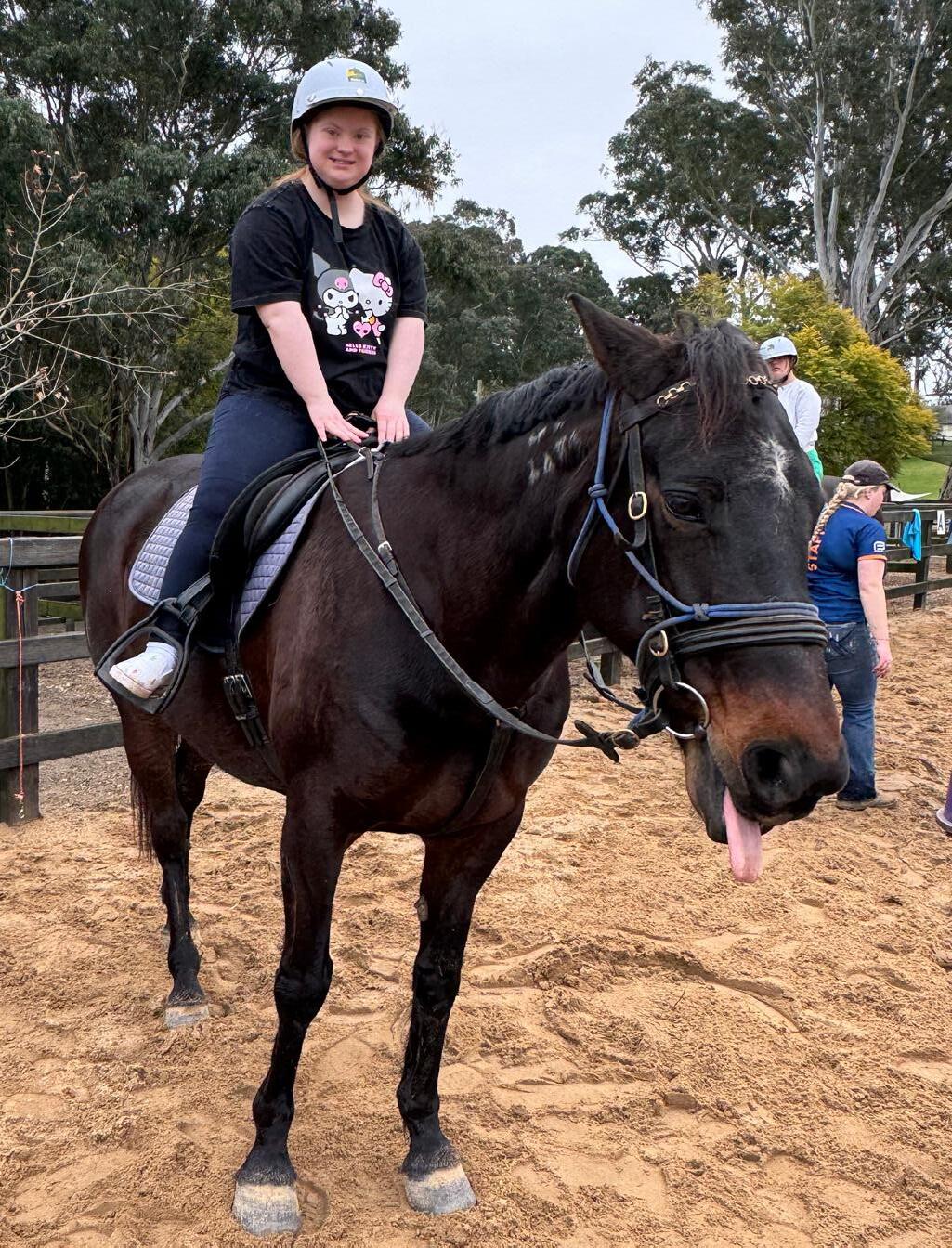
Roseby Class Coordinator, Ms Bianca Jervis holds a Bachelor of Education (Special Education) and has a background in nursing. She is committed to providing each student with the opportunities and experiences needed to move her along the pathway towards being a contributing member of society.
Mrs Carly Brown holds a Bachelor of Physical and Health Education and a Post-Graduate Certificate in Inclusive Education. She believes in providing an opportunity for all students to be successful by providing them with programs to develop their individual skills.
Ms Karlie Cunningham-Lloyd holds a Bachelor of Exercise Science and a Graduate Diploma in Education. She believes in providing an environment for all students to uncover their unique learning style so that they can achieve individual educational success.
Students learn a range of subjects with other specialist teachers.
Our Learning Support Assistants assist staff and students, playing an important role in the work-experience program.
The School Counsellors are involved in supporting students. All staff members are deeply committed to our students.
At all times, Danebank seeks an active partnership with parents and caregivers, encouraging them to be involved in the various stages of the program.
Each student has a collaborative annual IEP (Individual Education Plan) Meeting where learning and individual goals are set. There is ongoing review and monitoring throughout the year
Communication between home and school is ongoing through the school diary, class blog, email and face-to-face meetings.
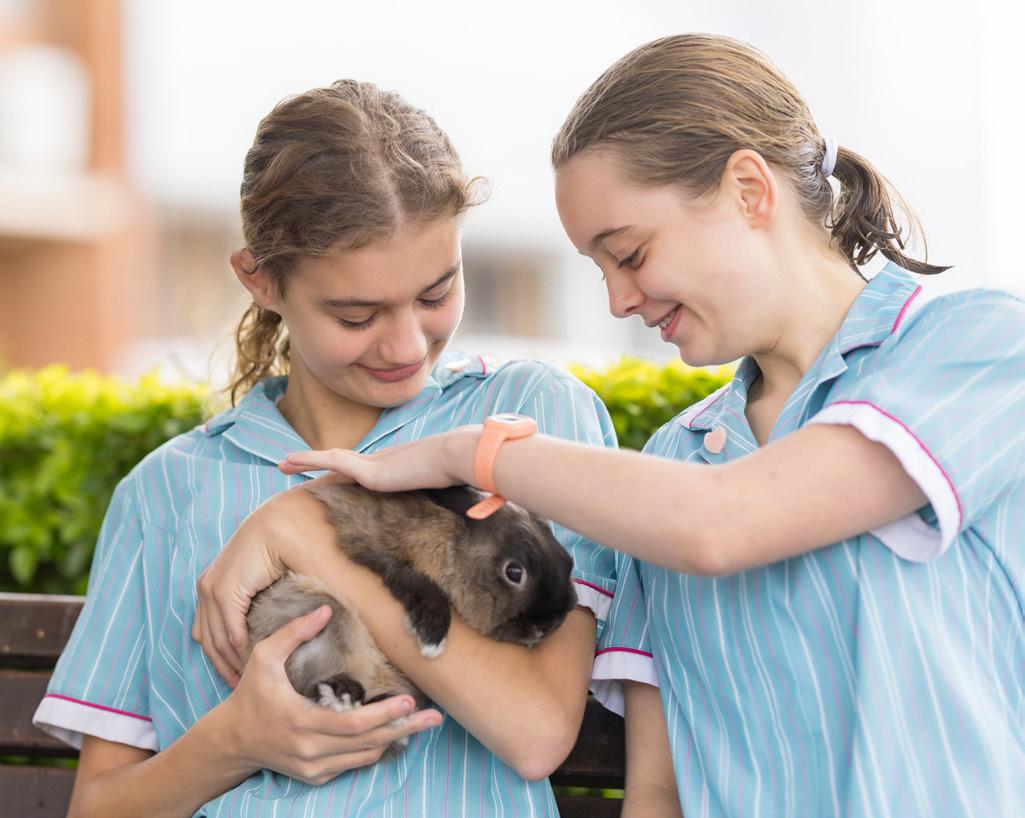
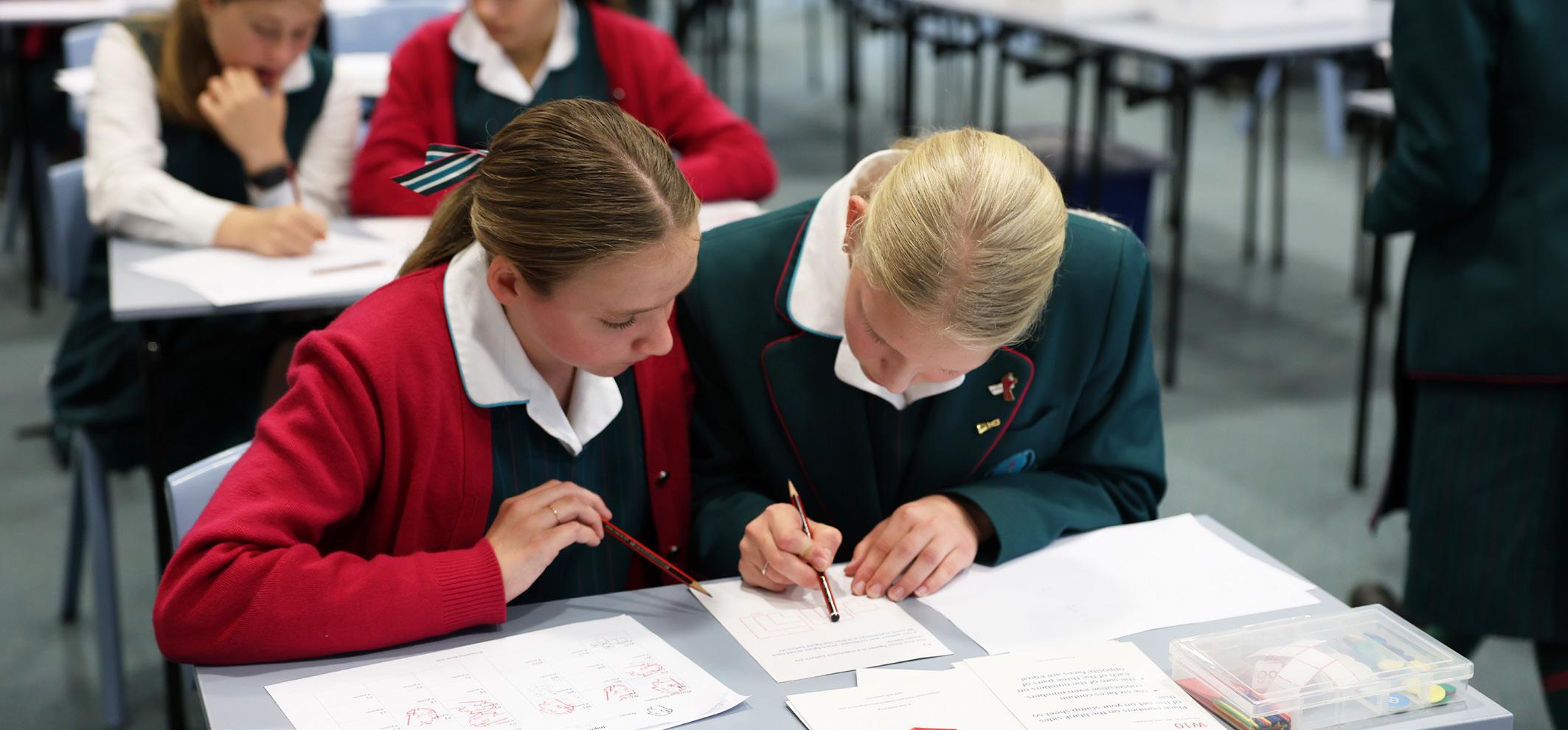
Danebank is dedicated to supporting the diverse educational needs of all students. Our Learning Enrichment Department provides tailored assistance to high potential learners, students with learning disabilities, and those for whom English is an additional language or dialect (EAL/D). We are committed to helping every student reach their full potential.
Our department is staffed by a team of highly qualified and experienced specialist teachers and learning support assistants. We take a collaborative approach, ensuring communication and sharing of expertise among our team, classroom teachers, school counsellors, external agencies and parents.
Students with additional learning needs and learning disabilities are supported by the Learning Enrichment team. Please ensure that the school has received all relevant reports. The Learning Enrichment team collaborates with parents, students and relevant professionals to determine and implement the most appropriate adjustments and interventions. This may include developing an Individual Adjustment Plan (IAP) that will be shared with the student’s teachers. Classroom teachers can also refer students to our team, and we use a variety of diagnostic tools to identify specific areas of difficulty. We value strong parent-school relationships and recognise the importance of open and honest communication regarding students’ learning needs. For further discussion, please contact Mrs Michelle Ball, Head of Learning Enrichment (Years 7-12) michelle.ball@danebank.nsw.edu.au
Upon entry to Danebank, students who speak a language other than English at home are identified by our specialist EAL/D teacher. These students receive a support program that is closely aligned with classroom teaching methods across all key learning areas, while also progressing through the stages of learning English. Withdrawal support for EAL/D students is available in the Senior School, based on individual needs.
Translation and interpreting services are available for school communications, including notes, student reports, parent-teacher interviews, student counselling, and other interactions between the school and home.
The High Potential and Gifted Education approach is a framework to develop the talent and potential of high potential and gifted students at Danebank, helping her to become all she is purposed to be. Equity and excellence guide our approach as we prioritise:
• Knowing and cultivating the gifts, talents and passions of every girl so they may flourish
• Developing inspired learners who will serve and shape our world
• Ensuring challenge and stretch within, across and beyond the curriculum
• Providing tailored learning experiences facilitated by staff with expertise in gifted education.
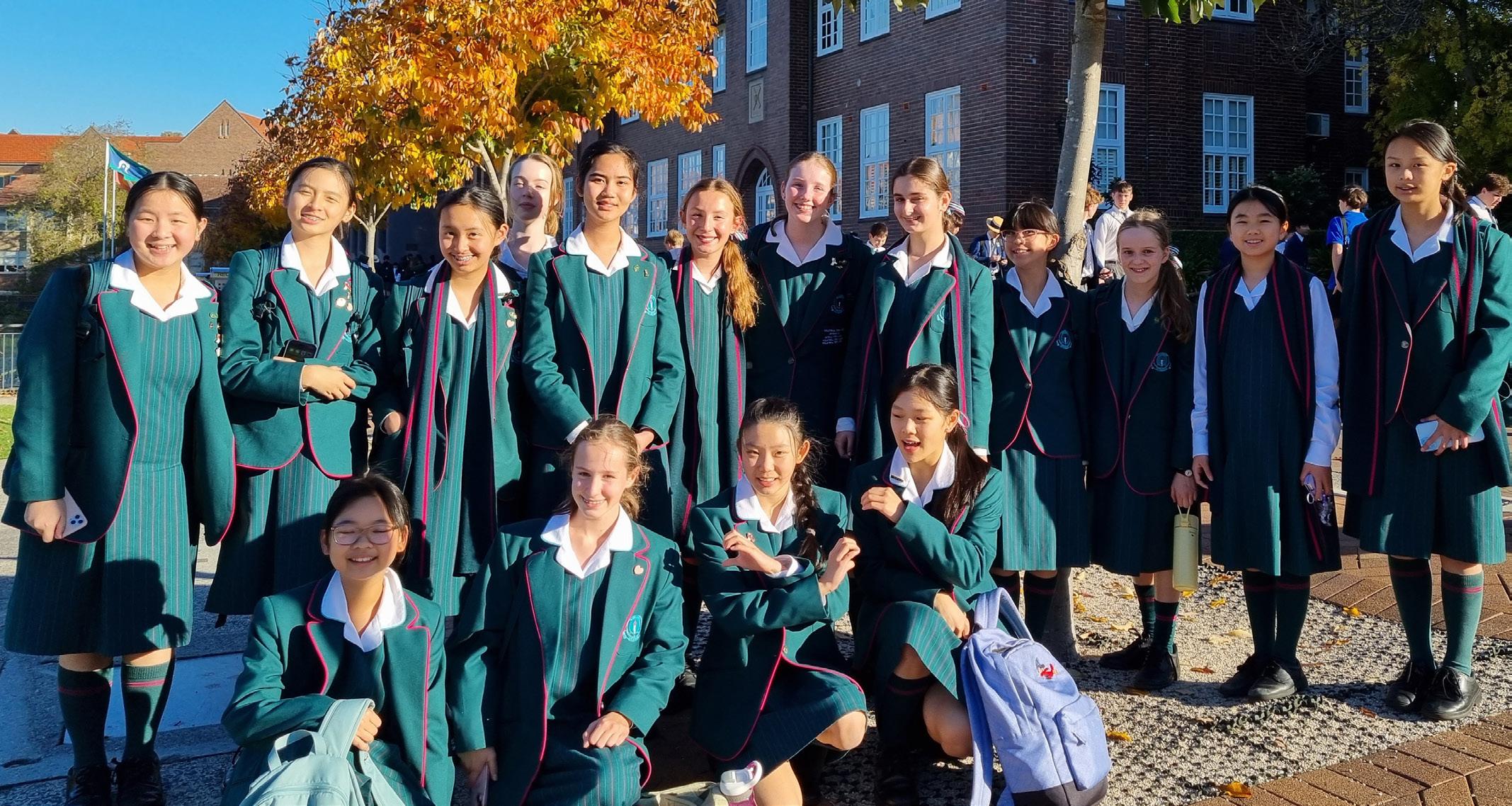
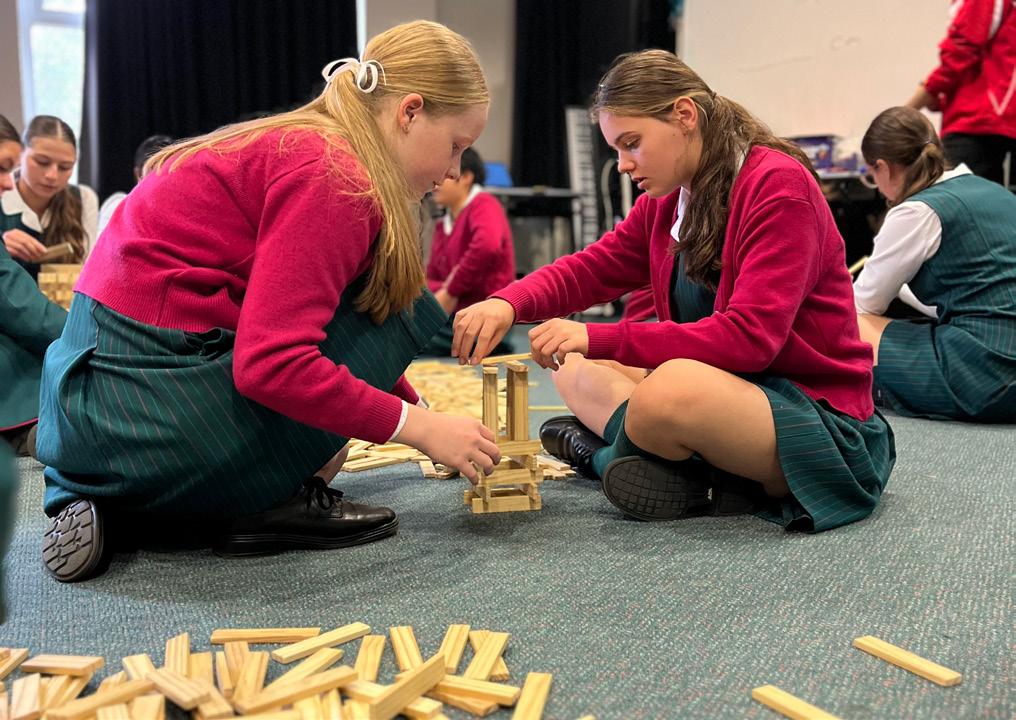
The approach promotes engagement and challenge for every student, while explicitly identifying and addressing the learning needs of high potential and gifted students. High potential learners require opportunities and differentiated teaching and learning practices to ensure their specific learning needs are met.
Gifted mathematicians entering Year 7 can be selected for the Danebank accelerated Mathematics class which gives students the opportunity to move through the mathematics syllabus at a faster rate, culminating in Extension Mathematics HSC courses.
Acceleration for exceptional students can also be offered in relevant Senior School subject areas. Exceptional students who wish to extend or accelerate their studies outside the Danebank curriculum are assisted in courses offered through the Open High School.
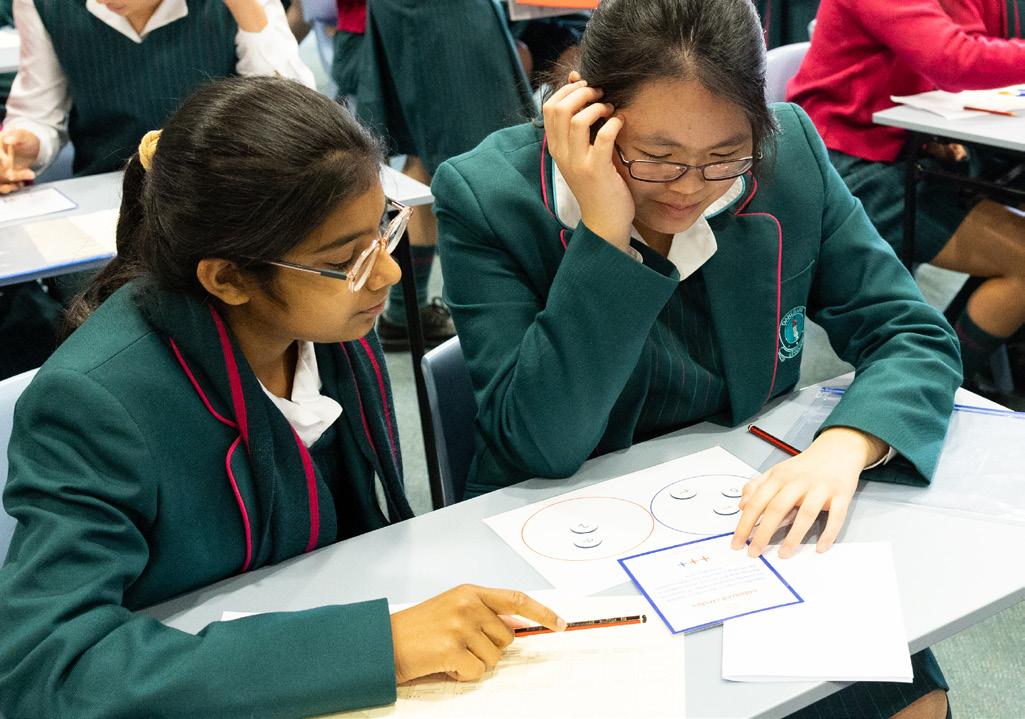
Gifted and talented students also enjoy competing in many academically challenging competitions and attending special workshops.
Students are selected to participate in gifted and talented opportunities for the application of knowledge beyond the curriculum. These activities include the Da Vinci Decathlon, Gateway 8, Australian RACI Chemistry Quiz, Scientia, Australian Museum Science Expo, Academy Conferences, University of Wollongong Learning Labs, ICAS Mathematics, Science and English competitions, Australian Mathematics Challenge, National Youth Science Forum, the Science and Engineering Challenge, AHIGS Festival of Speech, St George Eisteddfod, Australian Problem Solving Mathematical Olympiad, Alliance Française Competition, Share Market Game, AMP Economics competition, Australian History and Geography competitions and Bandfest.
Home learning is vital to equip students to be effective, independent learners, as well as to consolidate knowledge learned in school time. Students need to practise study skills, learn how to manage their time and ensure that revision becomes habitual rather than incidental. Home learning is especially valuable for focusing on areas of weakness that can be compounded if not addressed.
Have I understood?
Have I dealt with weak areas?
Have I made good notes?
Teachers can individualise and facilitate this process if the student is able to articulate the areas in which they are struggling well before formal assessments reveal the difficulty. Home learning helps students learn how to prioritise tasks, problem solve and take responsibility for their own learning. It is also an important way for parents to be part of the learning process and to emphasise and value that learning is an ongoing endeavour.
Is this topic/lesson clear to me? Can I explain the concept / idea / process to someone else?
Are there areas in which I feel I am still weak / unsure? Have I read over material and/or practiced skills to help me master?
If these areas are still not clear, have I asked my teacher question that will clarify this concept / content?
Have I taken my notes from class / the text and represented them in a new way from which I will be able to study effectively?
If I am not sure about the form of my notes, have I shown them to my teacher for their advice?
Have I made connections?
If I have covered the basic concepts of this topic /course, have I explored / researched additional material / information that will extend and expand my understanding and answers?
Have I fitted this most recent topic / concept into my larger understanding of the course and mapped this in my study
A regular program of learning at home is essential for all Senior School students. Students are encouraged to develop a regular routine of learning at home so that all set tasks are completed and classroom learning is continually reinforced and consolidated. We also encourage students to develop a healthy balance between daily home learning, family life and wellbeing activities.
Students should be engaging with home learning each afternoon in order to:
• Complete learning activities set by teachers which will be checked in the following lesson.
• Revise the day’s learning by creating summary notes or diagrams.
• Prepare for future lessons by reading ahead.
• Work towards future assessment tasks and assignments by completing a small amount of work on these regularly (and avoid last minute completing of tasks).
Years 7 and 8 Up to 1½ hours
Years 9 and 10 Up to 2 hours
Year 11 Up to 3 hours
Year 12 Up to 3½ hours
Students in Years 7-8 will not be expected to do home learning, other than reading novels, during holiday time. Year 9 students will not be expected to do home learning, other than reading novels, during holiday time in Terms 1 & 2 but may be given work during Term 3 holidays, to help them prepare for upcoming exams.
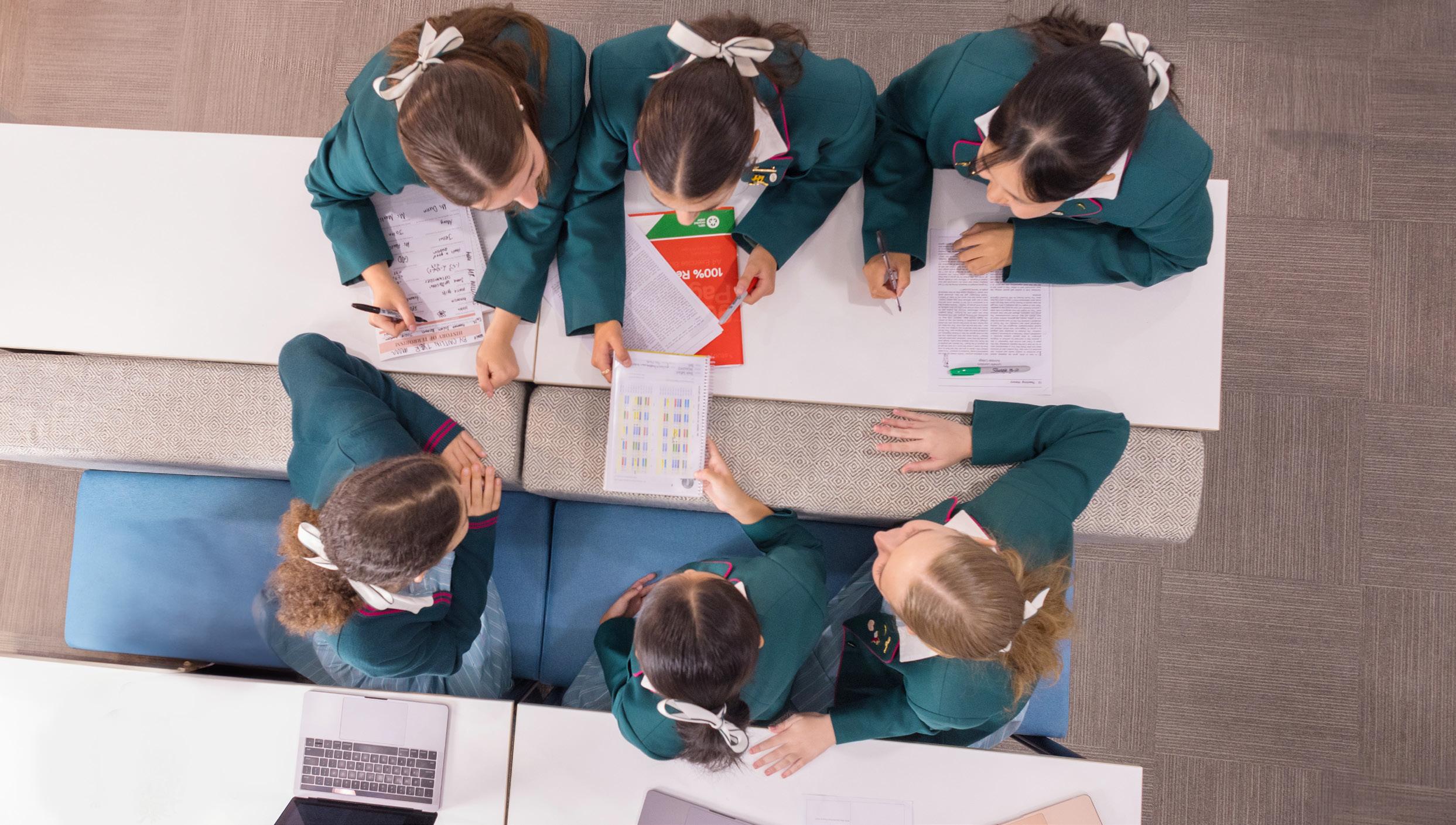
If the teacher sets home learning and it is not completed, this will be addressed with the student and if the matter becomes serious, parents will be notified and reparations may be given. Year Coordinators and Connect teachers will assist students at regular times during the year with planning for study.
a) Read Ahead
Students should read ahead in their textbooks, read their prescribed text or read relevant source material well before this material is addressed in the classroom. This will assist students with the content in class as the information will be more familiar.
b) Prepare study summaries
All students should prepare study summaries regularly. Some subjects have very specific content that must be learnt, and dot point summaries based on the syllabus in these subjects can be highly beneficial. Summaries should be brief and concise, and they should be written in a way that best suits the student’s learning style. Pictures, tables, mind maps, short notes and flow charts can all be used. Simply re-writing notes without modification or adaptation is not as helpful.
These summaries should be reviewed on a regular basis so the content is lodged in the long term memory.
c) Write questions to clarify
If there are areas that need clarification, students should write down their questions so they can ask their teacher the next day.

Learning + is a program for students in Years 7 to 10 which aims to foster information literacy skills across the curriculum and to develop students who are critical readers of print and digital formats. It provides an opportunity for girls to hone and refine their research skills and to gain competencies vital to becoming lifelong learners.
Students are guided through the inquiry process and discover a range of digital resources hosted by both Danebank and the State Library of NSW. As well, girls learn the principles of ethical scholarship and how to reference correctly, acknowledging sources that are not their own. Learning + complements key learning areas, and teachers have the opportunity to schedule further lessons which focus on specific skills to be integrated into their subject areas.
To support the development of effective organisation and study techniques, Danebank has a subscription to the online ELES Study Skills Handbook.
This platform is accessible to the whole school community: www.studyskillshandbook.com.au
Username: Danebank
Password: watermelon25
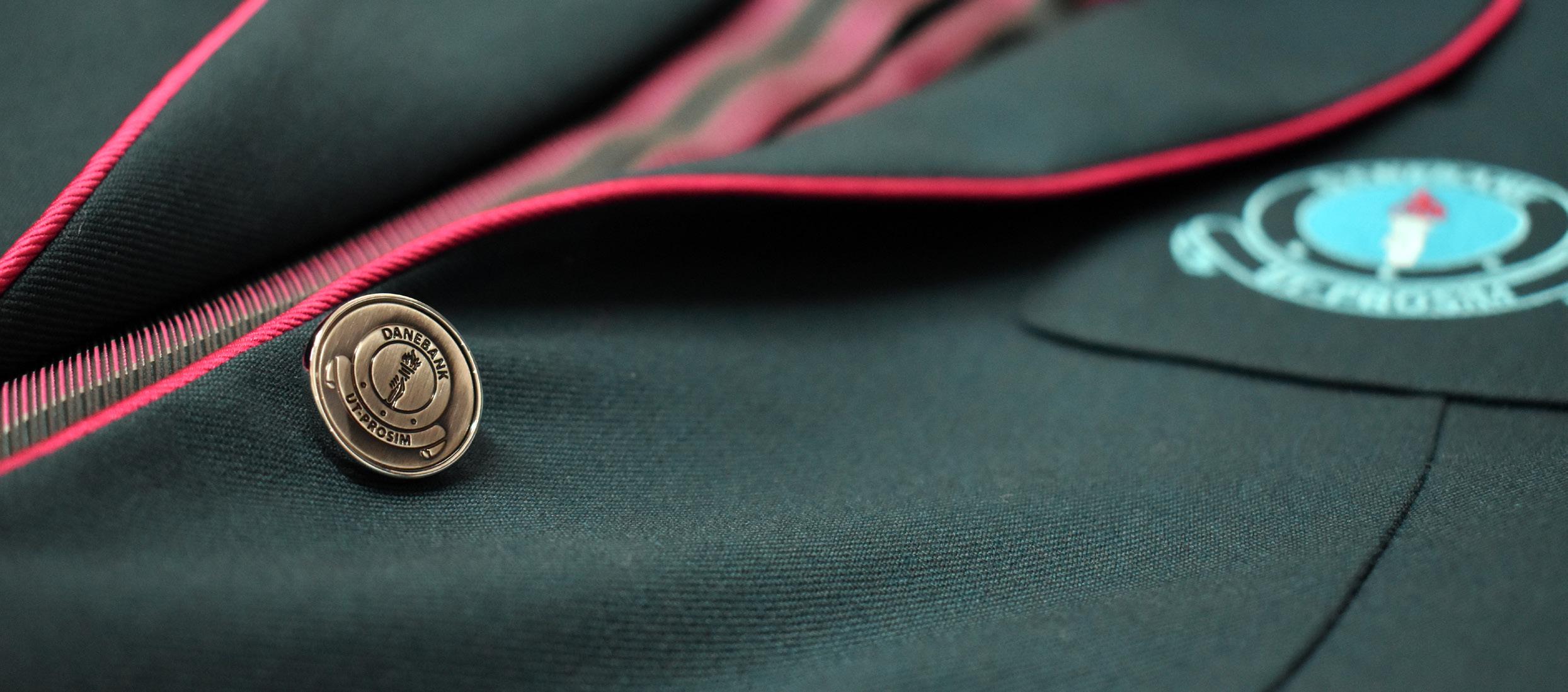
We expect students to wear their uniform with pride and maintain high standards by wearing the uniform correctly. It is one way that students take responsibility and show respect. Parents are advised to make an appointment at the Ranier Uniform Shop for fittings. After that, there is an online shop where purchases can be made for new items, and there is a Facebook group for second-hand items.
Danebank’s uniform policy aims to promote a school culture that provides all students with a fundamental sense of belonging and to develop within each student a sense of personal identity that links to her commitment to the school community. The uniform reflects Danebank’s positive image that we want to demonstrate to the broader community.
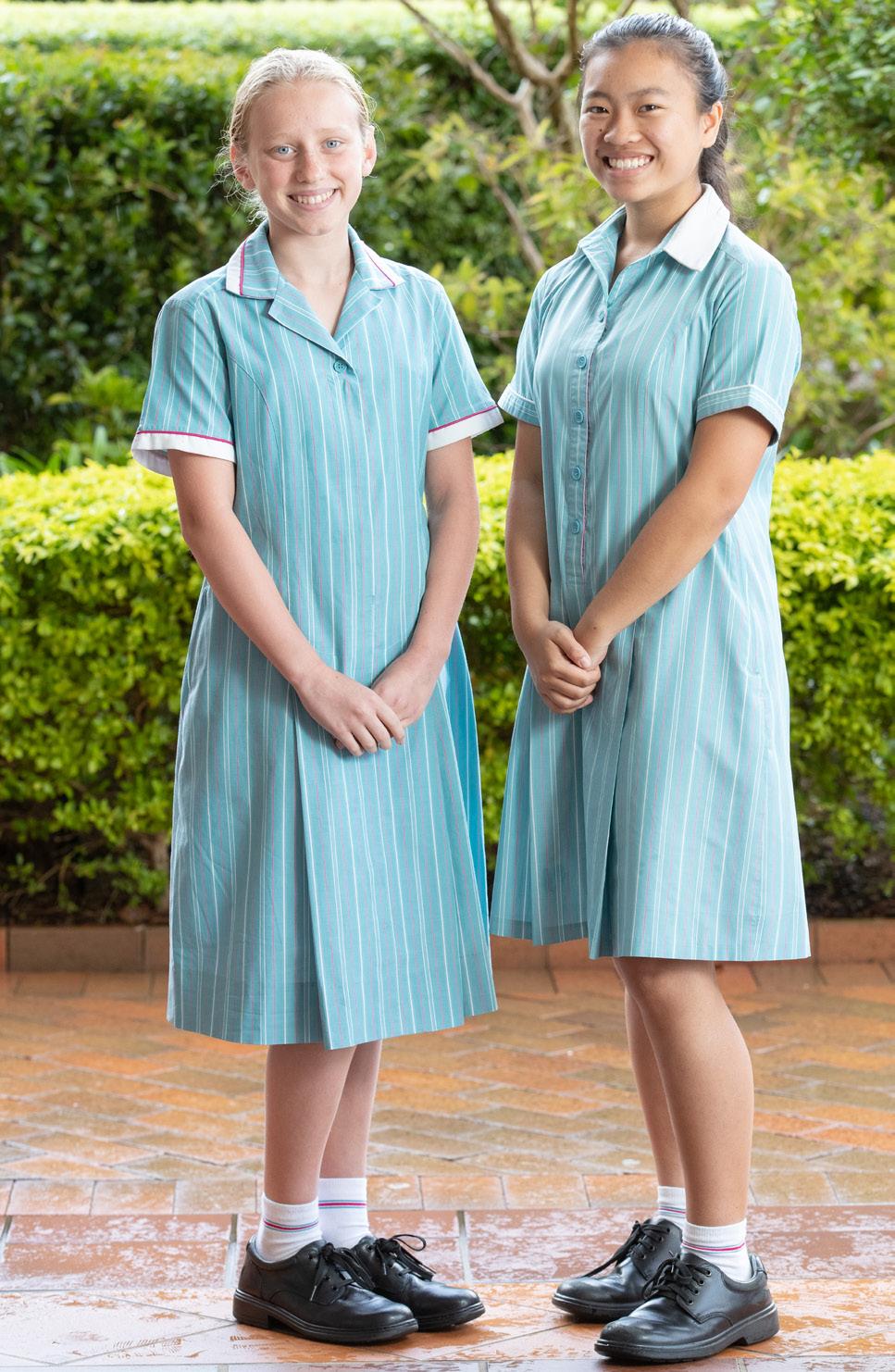
While the uniform policy is explicit it is not exhaustive in its detail. Students and parents should use this as a guide as to how Danebank expects students to appear. We do not allow students to have tattoos, cosmetic or otherwise, or have anything that over-enhances their features, such as false eyelashes.
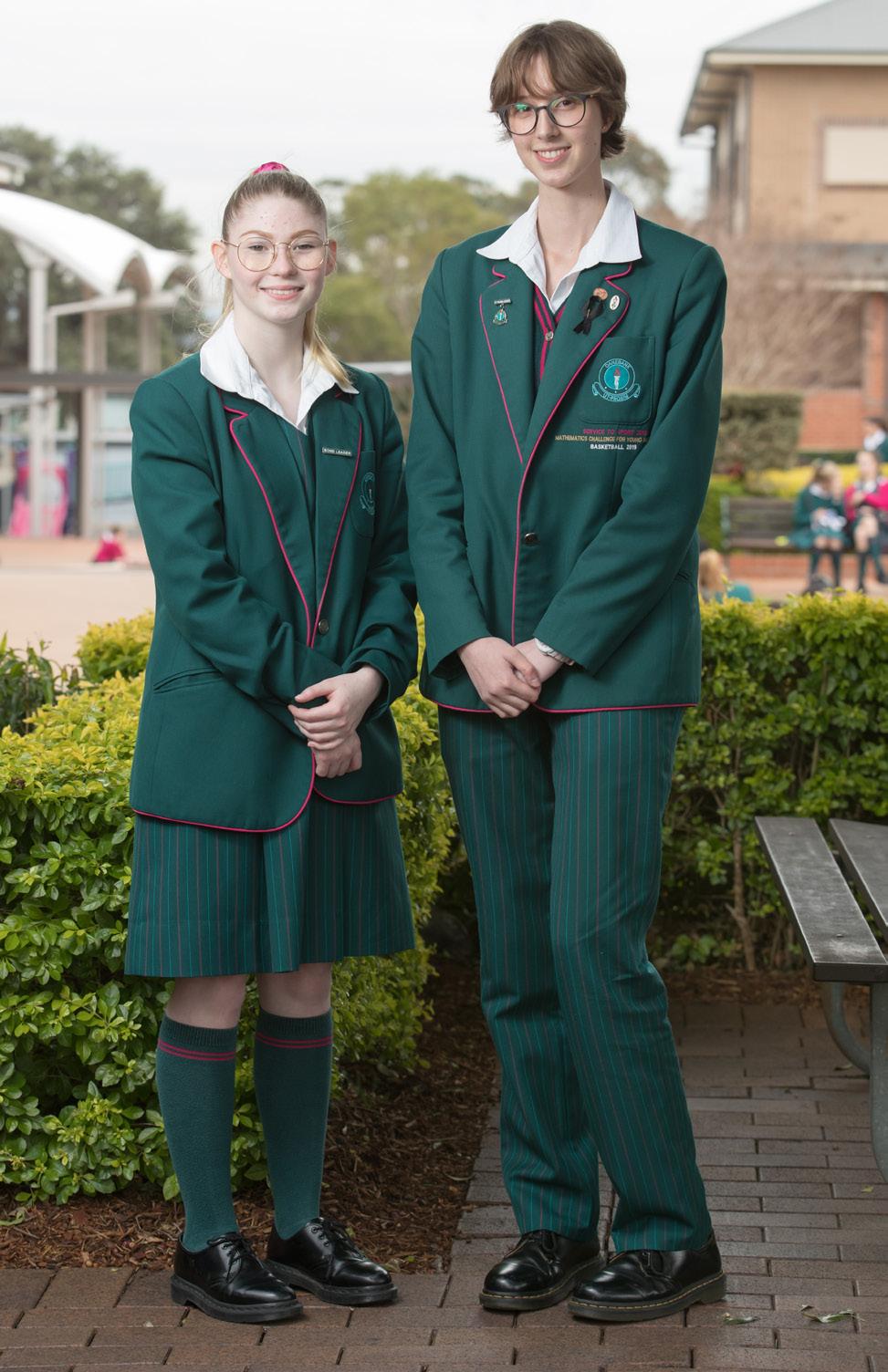
Students and parents should use the following as a guide as to how Danebank expects students to present themselves.
• Hair should be neat, with all of it tied back and off the face, at all times.
• Fringes are acceptable, but should not cover the eyes.
• Inappropriate hairstyles, colours or beading are not permitted.
• Regulation ribbons: tri-striped ribbon, jade, pink, silver, red, white ribbon or scrunchie. These may be purchased from the Ranier Uniform Shop.
• Small hair clips (plain silver, black or brown) are permitted to keep hair back.
• School hair bands can be worn to keep hair off the face.
• One set of pierced earrings (one in each earlobe only). These may be small studs in gold, silver, pearl or clear stone. No other colours are allowed.
• One fine necklace may be worn with a small pendant in gold or silver that should not be visible and worn under a student’s blouse. Medical necklaces may also be worn.
• No bracelets are permitted unless medical.
• A conservative watch may be worn. Should students choose to wear a ‘smart’ watch it should not be used as a communication device. If used in this way then the consequence of using a mobile phone will apply.
• Senior School: Students may wear one plain ring.
• Charity jewellery and accessories can only be worn for the period of the promotion. Only one approved charity item may be worn at a time.
• No nose, tongue, eyebrow or ear piercing other than the earlobe (including helix, scapha and tragus of the ear) are permitted.
• No costume jewellery is permitted.
• Colourless lip balm, for lip protection, is the only makeup allowed.
• Nails should be kept short and neat and natural in their appearance, as such, clear nail polish or French tips may be worn. Due to industry standards, students studying Hospitality are not able to wear nail polish.
• Students who attend school with nail polish on will be sent to the office to have it removed.
• Unobtrusive application of light foundation may be worn by Year 11 and 12 students.
• Unobtrusive application of BB cream or a tinted moisturiser may be worn by students in Years 7-10.
• False eyelashes are not permitted.
• Tattoos of any kind, including henna, are not permitted on students.
• No mascara or blush is permitted.
• Green Danebank school bags are compulsory.
• No writing is permitted on the bags.
• School bags, Danebank sports bags or Danebank excursion bags must be used for excursions. No other bag permitted.
• Tote bags are not to be used outside of the school grounds, they are only to be permitted to transport materials within the school grounds.
• Due to the destructive nature of chewing gum, students found to be chewing gum will receive a lunch reparation.
• Black, plain, polished leather lace up style shoes with flat heel and plain sole.
• Danebank grey anorak – if necessary, can be worn as outer garment to and from school over the blazer.
• The jasper green hat is an optional part of the school uniform.
and 4)
• Regulation white with striped ankle socks.
• Years 7 - 9 Striped tunic worn at knee length. The buttons of the tunic must be done up at all times. Transeasonal beetroot pink cardigan with crest buttons may be worn as the outer garment only at school.
• Years 10 - 12 Striped tunic with white collar. All buttons of the tunic must be done up at all times. Transeasonal jasper green cardigan with crest buttons may be worn as the outer garment only at school.
• Blazer to be worn as outer garment to and from school, if necessary.
and 3)
• Winter striped tunic worn at knee length with regulation charcoal stockings or winter knee length long socks, pulled up at all times.
• Years 7 - 9 Winter blouse with green trim.
• Transeasonal beetroot pink cardigan with crest buttons may be worn as the outer garment only at school. Regulation jasper green scarf.
• Years 10 - 12 Winter blouse with no trim.
• Transeasonal jasper green cardigan with crest buttons may be worn as the outer garment only at school. Regulation beetroot pink scarf.
• Cardigans or Year 12 jerseys are not to be worn to and from school, this includes all modes of travel such as car, train or bus.
• Blazers must be worn to and from school during Terms 2 and 3.
• Optional: winter pants with winter blouse and winter knee length long socks.
It is the responsibility of all students to follow the school’s uniform policies.
If a student is in breach of a Uniform Policy (school or PD/H/PE), where possible she will be spoken to and asked to rectify the problem. Infringements for school uniform will be recorded separately to infringements for PD/H/PE uniform. They will also be administered independently of each other.
On the second instance of breaching a Uniform Policy (school or PD/H/PE), the student will be placed on a lunchtime reparation.
On the third and any subsequent instances of breaching a Uniform Policy, a letter will be sent home to parents informing them of their daughter’s breach of the Uniform Policy and as a consequence, the student will receive a formal afternoon reparation. During this reparation the student may be asked to perform some act of service to the school community. Each term the count is reset and students start afresh.
Students who do not attend the lunchtime reparation for breaching the Uniform Policy will be placed on a formal afternoon reparation.
Students who are asked to lengthen their skirt will be given a weekend to rectify the problem. They will need to obtain a uniform pass, for the remainder of the week, from the Assistant Head of Senior School.
Students will need to remove piercings such as nose, tongue, eyebrow piercing or ear piercing other than the ear lobe immediately. Parents should be aware that if students choose to get these piercings during school holidays they will be required to remove these once the school term commences. Clear studs or band aids covering these piercings will not be permitted.
• Danebank shorts and top
• Danebank track pants and jacket
• Senior rugby jersey
• White socks
• Appropriate sports shoes such as joggers/sandshoes
• Danebank sports bag
• Danebank sports cap
• Danebank swimsuit, house cap and goggles
• Drink bottle and optional hat and sunscreen for WHS reasons.
Students who have medical conditions that require medication, such as asthma, are to ensure that they bring this medication to practical lessons.
Students with pre-existing injuries need to come prepared with their own supply of equipment to account for this injury. For example, strapping tape.
Note: All clothing and equipment must be clearly labelled with the student’s name. Any student not wearing the appropriate clothing, including shoes, will not be allowed to participate in the practical lesson.
Students who do not wear their full PE uniform and/or fail to bring a note explaining their non-participation in the practical lesson will receive a PE uniform infringement.
Students who wear their PE uniform outside a PDHPE practical lesson will be in breach of the PE uniform policy and will receive a PE uniform infringement. Details of the administration of the uniform policy will apply.
106 Park Road, Hurstville Phone: 0455 028 256 danebank@ranier.com.au
Shop hours (during school terms)
Purchase Online
• Monday 8:00am – 11:30am
• Tuesday - Thursday 1:00pm – 5:00pm
• Saturday 9:00am – 1:00pm (1st Saturday of the month)
www.ranier.com.au Register for online purchases with an email address and password
Students are required to attend and to participate in Personal Development, Health & Physical Education (PDHPE) and sports carnivals. Students are expected to wear full PDHPE uniform for all PDHPE activities.
Students are expected to change into their PDHPE uniform in break times before PDHPE practical lessons if that lesson is immediately after a break (before school, recess or lunch). For example, students who have PDHPE in period 1 are to change into their PDHPE uniform before school. For period 3, they change at recess, for period 5 at lunchtime.
Students are not permitted to attend Assembly and Chapel in their PDHPE uniform. All students are to change back into their school uniform before leaving school regardless of whether they are being picked up at the end of the day or are catching public transport home.
For students in Years 7 to 10, practical lessons are a compulsory component of the PDHPE syllabus and participation is essential to meet NESA requirements. As such it is important for all students to take part in these lessons. In the exceptional circumstances where students cannot participate, notes are to be provided by parents. The note from parents is to be addressed to the student’s PDHPE teacher and given to them at the beginning of the lesson.
These notes are to indicate clearly the date, student name, reason for non-participation, parent contact number and must be signed by a parent/carer.
Students who provide a note will not be allowed to participate in any form of physical activity in the lesson unless stated by the parent for minimal participation. For instances where students will not be participating for more than one lesson, notes are to include the estimated period of time of non-participation. For example, days or week and a date when they will be able to return to physical activity. Where this non-participation period is longer than two weeks, a medical certificate from a GP is required. (Medical certificates written by a family member cannot be accepted.)
Those students unable to participate in PDHPE lessons may be given work sheets that support the lesson content. Parents may be contacted by the Head of PDHPE if their daughter is in danger of not meeting NESA requirements for PDHPE due to lack of participation.
Students are to report all injuries to the PDHPE teacher before the conclusion of the lesson to ensure adequate and accurate recording of the situation.
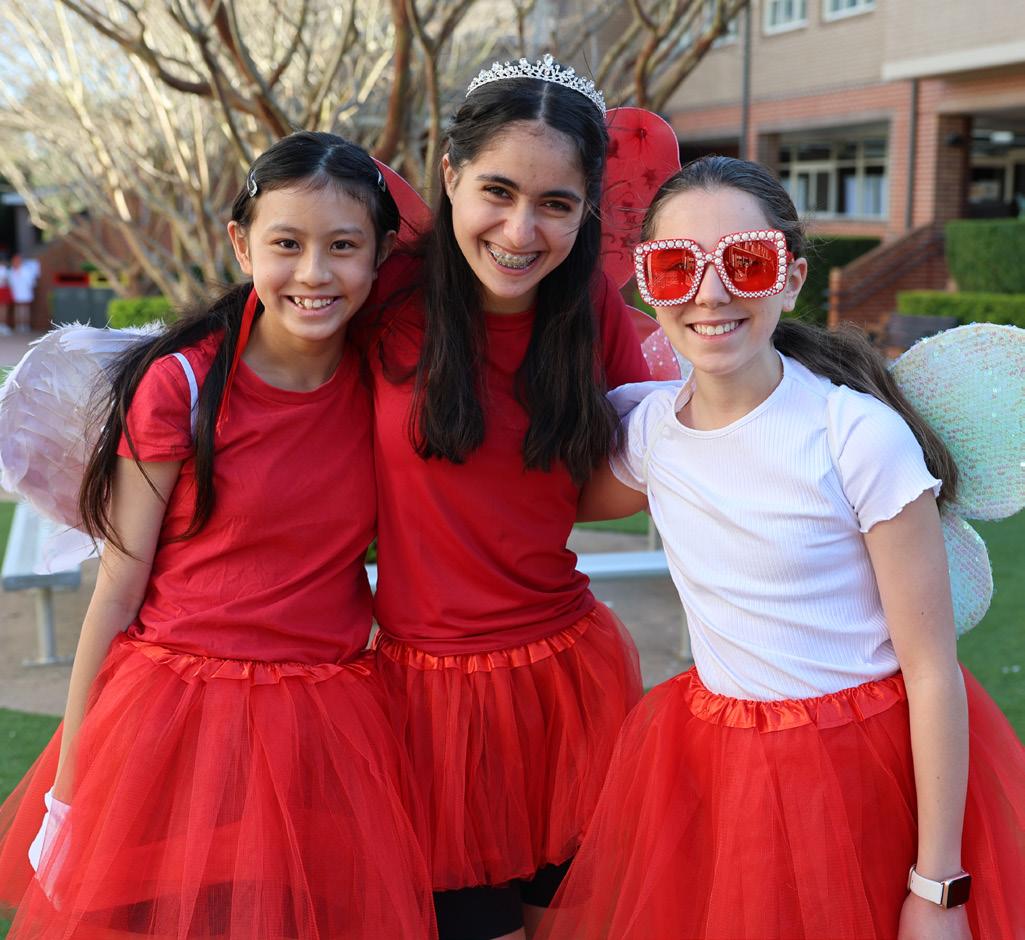
On certain occasions, students will be granted the privilege of wearing casual clothing to school. While this provides students with the opportunity to make some choice, students will still need to adhere to regulations required by WHS policies relating to student safety. Child protection and respectful decision making provide the framework for the schools’ expectations on mufti days.
Students will be required to undertake normal learning activities and their dress must afford them the same protection that their school uniform and school shoes provide. With this in mind, students should ensure that their casual dress abides by the following:
• Shoes should be enclosed
• Hair should be tied back for practical lessons
• Shorts, skirts and dresses should be no shorter than mid-thigh length
• Clothing and dress ups should not be contentious, politicised or controversial in nature. This is inclusive of text, symbols and imagery.
• Midriffs must not be shown
• Underwear should not be visible
• No singlets, strapless tops or tanks should be worn
• Uniform rules regarding make up and nail polish still apply
• Students may wear additional jewellery, with the exception of ‘dangling’ earrings or large hoop earrings
Any student involved in a speciality subject will have additional requirements. In the case that a student has a Science or TAS lesson, leather enclosed shoes are to be worn. If a sport or PDHPE lesson would normally require the student to change to sport uniform, the school sports uniform and shoes are to be worn.
The School Student Transport Scheme (SSTS) gives eligible students free or concession travel between home and school on public transport. Preschool children and students who live too close to the school are ineligible.
Who needs to apply?
Students who:
• Have not had a School Opal card before
• Have changed address or school
To apply for a School Opal Card, go to: https://transportnsw.info/tickets-opal/ticket-eligibilityconcessions/school-student-travel
The School Opal Card will then be sent directly to the student’s nominated address. Enquiries 131 500.
Senior students will need to have their own separate Child/ Youth Opal card for excursions. These can be purchased at a train station or applied for online. Please arrange for a regular top up of this card to ensure that your daughter is prepared for activities as they arise.
If there are shared custody arrangements in place, two applications need to be made, one for each eligible address.
There are two different Opal cards that impact school age students:
• School Opal card: For transport directly to and from school only.
• Child/Youth Opal card: For transport to and from other venues (for senior students to use for excursions).

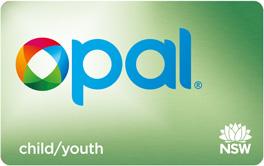
If you lose your card or it is damaged, report it online and order a replacement School Opal card. A fee may apply. By doing this, the old School Opal card will be cancelled and a new one will be mailed to the student’s eligible address within 5-7 days. While waiting for a replacement card, you should use a Child/Youth Opal card to travel https://apps. transport.nsw.gov.au/ssts/reportPass
Parents, carers and students won’t need to reapply every year as long as they remain eligible.
Available to students 16 years and older. These cards are ordered by the school at the end of the year. They entitle students to travel on public transport at concession rates.
Expectations of students when travelling to and from school:
• Students are to be considerate of others when travelling in public, at all times. Students should endeavour to keep bags away from the doors of trains and buses.
• Students will stand up on public transport, when necessary, to allow members of the public to sit down.
• On crowded public transport students should spread themselves throughout the carriages of the train to ensure minimal disruption to the public.
• Under no circumstances should students sit on the floor of carriages or block doorways preventing passengers getting on or off the train.
• Students should travel directly to and from school and should not loiter in Westfield or Hurstville unless accompanied by a parent or carer or if they have a note signed and dated from the Deputy Principal Senior School.
• Blazer is the only outer garment to be worn to and from school (compulsory in Terms 2 and 3). Cardigans or Year 12 jerseys are not to be worn to and from school, this includes all modes of travel such as car, train or bus.
• Students must adhere to the Danebank Positive Behaviour Code and Policy as well as the Transport NSW rules, at all times.

At different stages of their education, students need access to different hardware. The table below will assist you in understanding what provisions are made at school, or should be made by you, for your daughter.
Our Bring Your Own Device (BYOD) program requires students to own their own device that meets the following minimum requirements:
• Weigh: Less than 2kg
• Battery: 8 Hours (sufficent to last the entire school day)
• Screen size: 13” to 15”
• Processor: i5 or equivalent
• Memory: 8GB RAM
• Storage: 256GB SSD
• Operating System: Windows 10 or Mac OS X 12
Note: Laptop with ARM processors are not supported. https://byod.danebank.nsw.edu.au/ for more information.
The school will provide students with the following software to meet their core educational needs:
• Google Apps Suite
• Microsoft Office 365
• Adobe Creative Cloud (Photoshop, Illustrator, InDesign)
• Box of Books (text books)
• Pencil case (with pens, pencils, eraser, ruler, pencil sharpener, highlighter etc).
• Sturdy A4 ring binder with 5 - 7 A4 exercise books with binder holes and dividers for each subject.
• PDHPE: 96 page A4 exercise book.
• USB stick and a USB adaptor if your device doesn’t have a standard USB port.
• Visual Art diary 11” x 14” for Years 8 to 11 Visual Art students, to be purchased from the Senior Office. A Visual Art diary will be supplied to Year 7 students by the school.
• Mathematics grid book with 5mm grid, a geometry set (details provided by Mathematics teachers in Week 1).
• Mathematics: Purchase a CASIO fx-8200 AU calculator.
• Headphones compatible with her BYO Device.
• Technology: 1 x A4 Display Folder
• Apron: A requirement of the Year 7 Technology Mandatory course is that students wear a food safe apron during all practical cooking lessons in the Agriculture Technologies unit. To meet this requirement, we ask that each student purchase a school approved apron from the uniform shop. The apron will be used again in the Food Technologies unit in Year 8 Technology Mandatory.
• Science: Apron and safety goggles (optional). For purchase from the uniform shop. If individual PPE is not purchased, shared items are available in class.
• Teachers will notify the girls in class about any other needs.

Year 7 students are communicated to directly about opportunities for co-curricular activities. This is generally through emails and announcements at Principal Assemblies. Placing the responsibility for signing up for these activities upon the student, is one of the differences between Junior and Senior School.
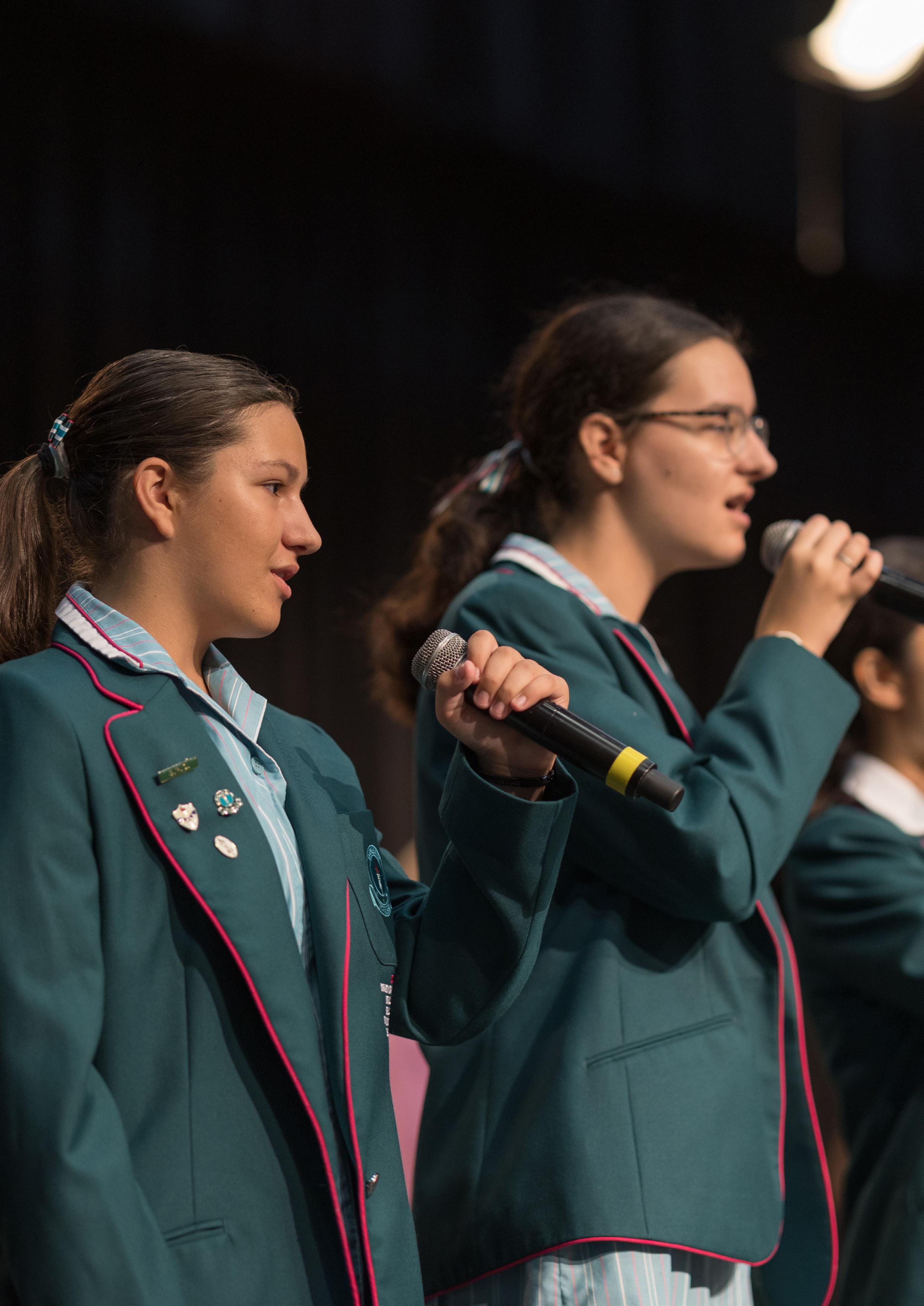

Year 7 is a very busy time for students. They are studying the greatest number of subjects that they will ever study in Senior School, as well as settling into a new school and new routine. Extra-curricular activities are a great way to meet new people and forge new friendships.
You probably picked up at the Cake and Connect event, that the girls who involve themselves with a wide variety of extra-curricular activities have a passion and love for Danebank. These activities help students to become well rounded individuals who are empowered to try new experiences that take them out of their comfort zone.
As such, it would be beneficial for you to have a conversation with your daughter as to what extracurricular activities she would like to be involved in and which you are happy to support by fitting them into your own family’s busy schedule.
During your enrolment interview, you would have been told about all the extra-curricular activities that are on offer to your daughter. It is important that your daughter understands the details of the commitment she is making when signing up to these teams and activities. Therefore, we encourage you to discuss this prior to her signing up.
Christian lunchtime groups run each week for students in years 7-10 (Focus) and years 11-12 (SIC- Sisters in Christ). These groups are student led (with the support of the Christian studies staff) and involve games, music, discussions about the Bible, prayer and often lollies or other treats . Our Christian Lunchtime Groups are a great place for students to form friendships across different years and all students are welcome to attend.
SIC & FOCUS Camp is the annual weekend away for anyone in Years 7 to 12, and it’s a free camp! It is for anyone interested in spending time exploring what God’s Word says to us and what it means for our lives.
It is a weekend of games, activities, Bible talks, seminars and free time. A guest speaker is invited to give the Bible talks, and students and teachers lead activities and seminars throughout the weekend. A highlight of the camp each year is the themed dress-up night that takes place on the final night. Students will receive information about the camp at chapel and in FOCUS in weeks leading up to camp.
FOCUS Years 7 to 10
SIC - Sisters in Christ Years 11 and 12

We encourage each girl to participate in some of the wide range of extracurricular activities listed below. This is a great way for girls to make friends as well as learn new skills and follow their interests.
• Advanced Instrumental Ensemble (Audition)
• Archdale Debating
• Bellringers
• Ceramics Classes
• Chamber Strings
• Dance Troupe
• Da Vinci Decathlon
• Drama Production/Musical
• Drawing Class
• Duke of Edinburgh
• Festival of Speech
• FOCUS
• Gymnastics
• Knitting Club
• Roseby Dance Group
• Mock Trial (Legal Studies)
• Philosophy
• Public Speaking
• Robotics Senior
• Senior Choir
• Senior Concert Band
• Senior Strings Orchestra
• Senior Vocal Ensemble (audition)
• SIC (Sisters in Christ)
• SRC
• Study Hall (English, Mathematic, Science)
• Student Wellbeing Group
• Swim Squads
• Tennis Coaching
• Theatresports
Overseas travel
We have offered a number of overseas experiences previously, plus a couple of new additions:
• Japan (Languages)
• Europe (History)
• Space School Program (USA)
• Borneo (Gold Duke of Ed)
• Cambodia Service Trip
Co-curricular Activities


School Captain
Angelina Cikusa
Vice Captain Amelia Ancevski
Vice Captain Georgie Papadimitriou
Year 12
Christian Leadership
Prefects
Annie Foley
Events Patricia Grillas
Junior School
Jasmin Ninic
Learning Megan Chang
Performing Arts
Senior School
Joya Zheng
Emily Wilson
Sport Parisa Shretha
Sport Zoe Wood
Ut Prosim
Felicity Ayres
Wellbeing Isabel Lim
Wellbeing Rachel Lindsay
Prefects are elected representatives of Danebank School. They have responsibilities for building community and leading the students of the Senior School.
At Danebank, Year 11 students are selected to be Connect Leaders, mentoring students in Years 7 to 9.
The student body of each House elects four Year 11 House Officials each year. They are responsible for the organisation and implementation of the Inter-House Competition and the Term 3 House Festival Day. They also oversee House Spirit at carnivals. They report to the House Patrons.
This leadership group assists the Ut Prosim Facilitator. They work together during Connect to promote and assist with areas of service and help raise awareness of social justice issues within and outside of the school. They also do a significant amount of the fundraising in the school and select the school charities for the year, raising funds for these groups.
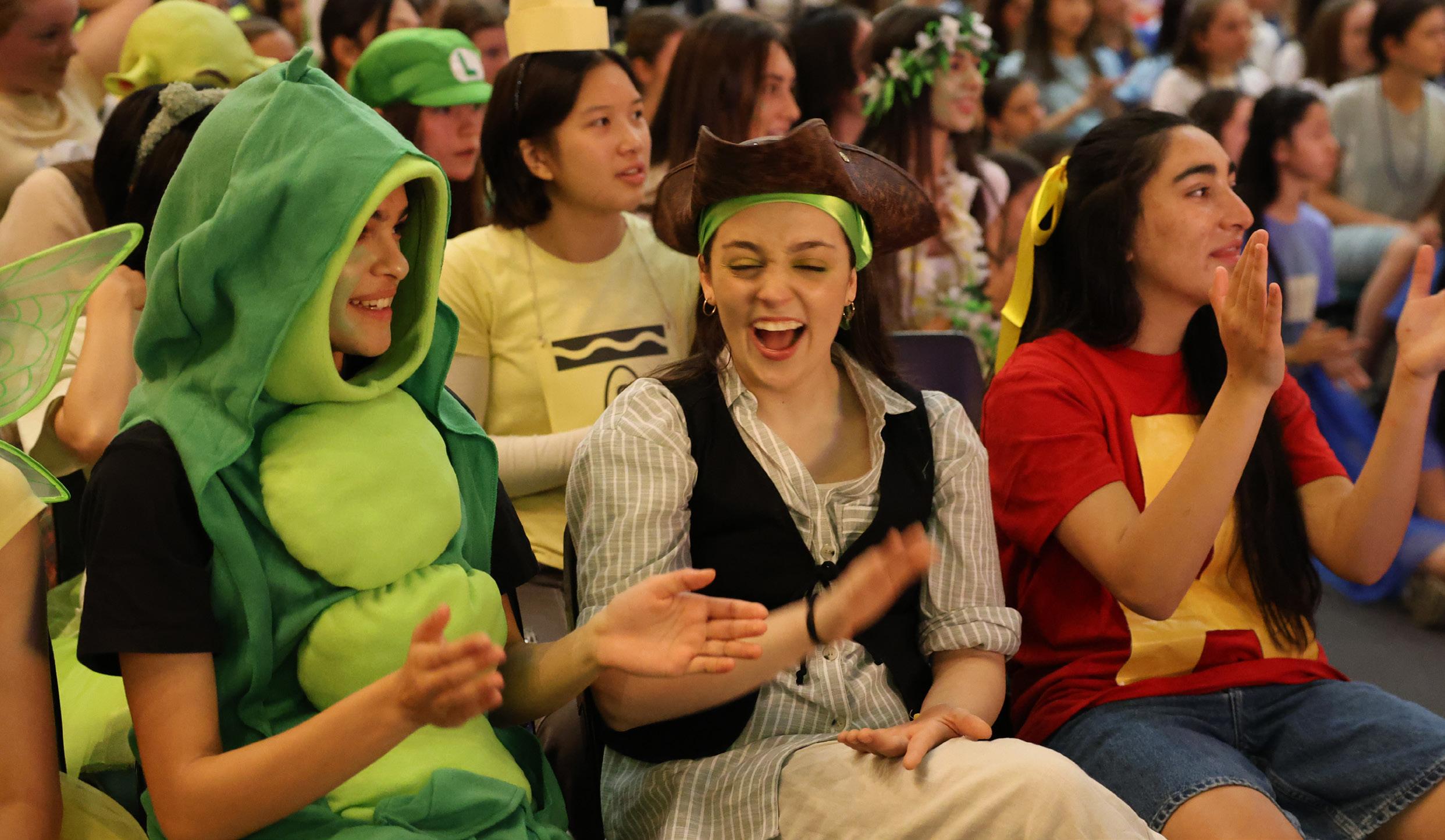

The Danebank House system allows girls to develop a sense of school spirit and contribute positively to the school, in academic work, in sporting and extra curricular activities.
The Houses: Ball, Cowell, Gray and Richmond, are named after people of significance in Danebank’s history.
The House Festival, held in Term 3, is a special celebration and a highlight of the year for students as they participate in a range of activities on the day.
The girls have chosen the watermelon as a symbol of the school and as a mascot.
The watermelon colour reflects the school colours. Our Danebank mascot attends sporting competitions and is a great reflection of school spirit.

Named after the Reverend G. Richmond who was Danebank’s first School Chaplain. The emblem is a striped shield which is coloured green and gold.
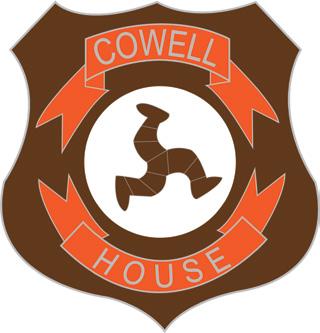
Named after Mrs Joyce C Cowell, a former Headmistress. The emblem features “the three legs of Mann”. The design, coloured in brown and orange, was based on the national emblem of the Isle of Mann.
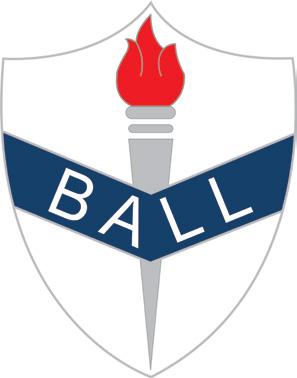
Named after Miss Roseby Ball, the founding Head of the school. The emblem is the torch, coloured blue and white, representing the lighted flame. The symbol of the torch is also found on the school badge.
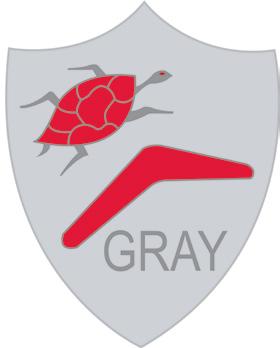
Named after the Reverend R. Gray, a former School Chaplain. The emblem features Aboriginal motifs in the form of a turtle and a boomerang and is coloured grey and red.
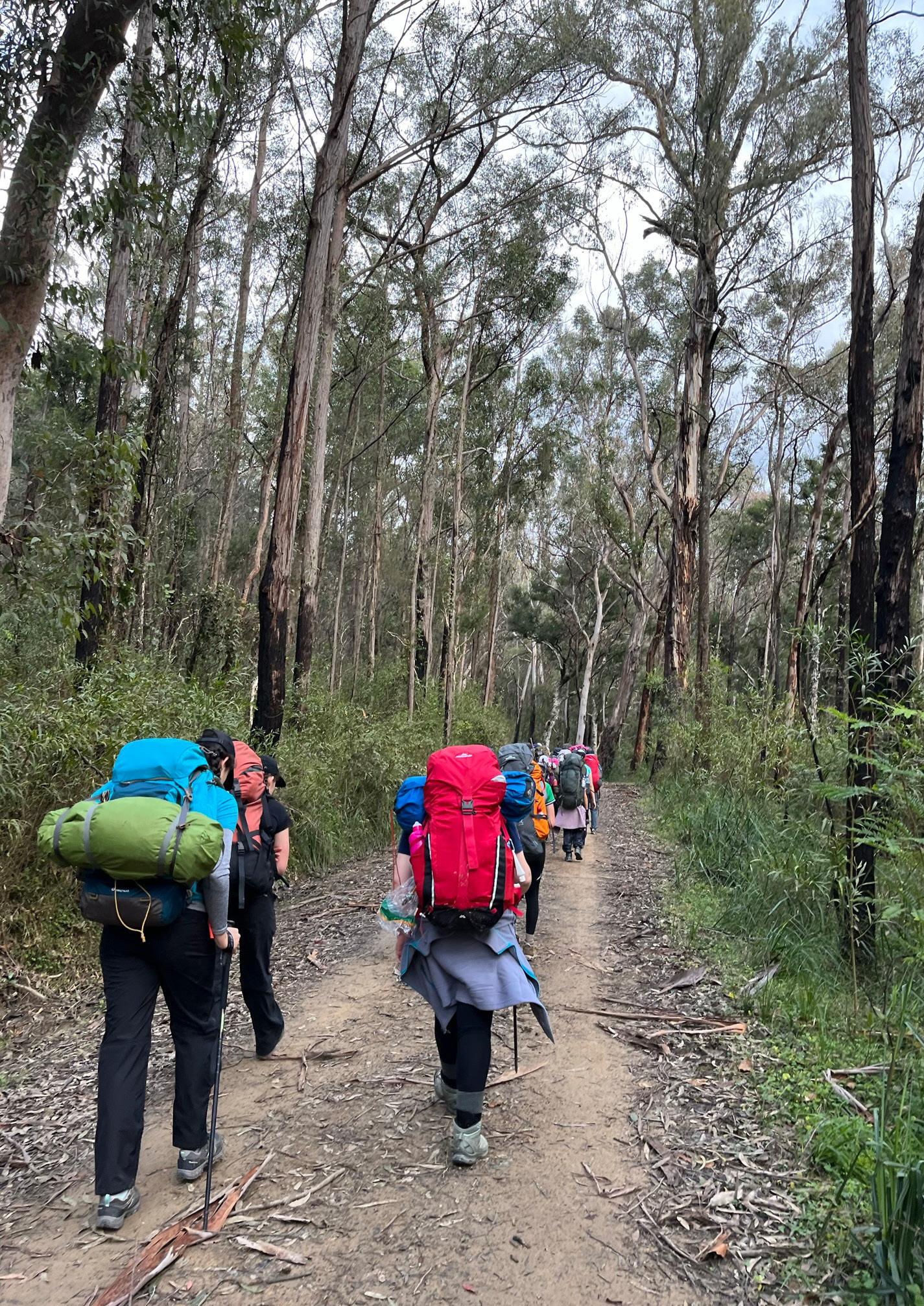
We encourage each girl to participate in some of the wide range of extra and co-curricular activities available at Danebank. This is a great way for girls to make friends as well as learn new skills and challenge themselves.

• Annual camps are held for Years 7-11
• Year 7 begins with a camp at CRU Galston Gorge site
• 12 - 14 February 2025. This is an opportunity to build relationships between the students.
• Years 8 and 9 camps give the girls experiences in outdoor living and opportunities to step outside their comfort zones with challenge by choice activities. Students develop independence and team building skills.
• Year 10 camp has a major focus on leadership skills.
• Year 11 camp is a retreat, designed to give the girls good coping skills for their final year of school. It focuses on stress management and study skills while still having some fun.
• SIC and FOCUS camp is the annual Christian group weekend away. It is student run and focuses on building relationships with each other and with God.
• Music Camp is a time to spend 3 days immersed in specialist tutorial groups, large ensemble rehearsals and collaborative experiences.
• Excursions are held throughout the year by various faculties.
• Various overseas opportunities are offered throughout the year.

Mrs Alison Underwood alison.underwood@danebank.nsw.edu.au
Outdoor Education and Duke of Edinburgh Coordinator
Here are some of the many reasons we run camps at Danebank.
• It encourages students to try new things. Camp pushes students out of their comfort zone and exposes them to new activities and experiences that they may not be familiar with.
• It helps to develop social skills. Camp teaches students to communicate, to work together as part of a team and to be a leader. Leadership is developed by asking campers to fulfil responsibilities that may not be expected of them in day to day life.
• It encourages students to face challenges and learn the value of hard work. Because they feel safe at camp, students are more comfortable taking healthy risks and setting personal goals.
• It helps to build character. In addition to making new friends, campers also develop an appreciation for the qualities required to cultivate and strengthen these relationships.
• To foster independence. At camp, students learn the responsibility of making their own decisions with the safety net of insightful camp leaders and teachers in a safe environment. Every camp at Danebank has a slightly different focus, but at every camp we seek to empower the student, build confidence, grow leadership and independence and expose students to different environments.
Learning to take healthy risks builds perseverance and resilience and ultimately gives the students a great sense of achievement. All of these skills aid students when they are back at school.
The Duke of Edinburgh’s International Award is available to all students 14 years (Year 9) and above. The Award is comprised of three levels each progressively more challenging:
• Bronze (14 years and over)
• Silver (15 years and over)
• Gold (16 years and over)

The Duke of Edinburgh’s International Award participants are required to complete four sections at each level: Service, Skill, Physical Recreation and Adventurous Journey. In Gold level, participants also complete a Residential Project.
Girls at Danebank are very involved in the The Duke of Edinburgh’s International Award. Those who take part develop great leadership and organisational skills as well as making a valuable contribution to the wider community. They also learn to persevere and step outside of their comfort zones.
Danebank is one of the top schools delivering the Award, globally, when measured by completion rates and participation. The number of girls who receive awards, bronze, silver and gold, is extraordinary. Gold Awards are presented by the Governor of NSW.
By participating in The Duke of Edinburgh’s International Award students embark on the education continuum that is a life changing journey embedded in personal growth, challenge, connection to peers, life skills, and service.

Competitions such as ICAS exams are skills-based assessments. The school participates each year in English, Mathematics, Science ICAS exams as well as the Australian History Competition.
Students are invited to participate in these competitions by their class teacher who will explain how to register and pay as deadlines arise. Notices will also go out in the Danebank Newsletter to inform parents of the upcoming competitions. A rough guide as to the timing of these competitions is shown below.
Deadlines for numbers is usually a month prior to these competitions.
ICAS Science August
Geography August
History May
ICAS English August
ICAS Mathematics August
Da Vinci Decathlon and Gateway 8 are academic challenges in which Danebank teams participate, in May and August respectively.
Girls engage in a range of stimulating activities centered around a theme such as power, the unexpected or exploration. Each school team competes in Mathematics and Chess, English, Science, Code Breaking, Engineering, Ideation, Creative Producers, Art and Poetry, Cartography and General Knowledge. We ask students to nominate themselves or a friend for these competitions in Term 1 and these nominations are considered in conjunction with a staff nomination process to select the final teams.
Students are all welcome to participate in the ICAS Mathematics competition, by parents registering and paying on the ICAS portal. Registration details will be communicated via the school newsletter and email.
Students in Year 10 are welcome to participate by notifying their teacher before the deadline.
Students in Year 9 are welcome to participate by notifying their teacher before the deadline. Years 9 and 10 Elective History classes will automatically be entered.
Students are all welcome to participate in the ICAS Mathematics competition, by parents registering and paying on the ICAS portal. Registration details will be communicated via the school newsletter and email.
Students are all welcome to participate in the ICAS Mathematics competition, by parents registering and paying on the ICAS portal. Registration details will be communicated via the school newsletter and email.
Mathematics Challenge March-April The accelerated students in Years 7 and 8 take part in the Mathematics Challenge for Young Australians Competition.
Mathematical Olympiad
March-September It is compulsory for all Year 7 & 8 Mathematics Accelerants, but optional for the top classes in Years 7 & 8 Mathematics, to take part in The Australasian Problem Solving Mathematical Olympiad.

Philosophy club runs on Friday at lunch time. Students from all year groups meet to discuss ethical and philosophical dilemmas. Topics include Virtue Theory, Deontology and Utilitarianism. Some of the issues debated have included, “Is it ever OK to punch a Nazi?” and “Can we justify the carbon footprint of holiday travel by plane?”
Danebank is part of an inter-school competition called the Ethics Olympiad. In this we send 2 teams of 5 students to debate ethical dilemmas against other schools.
While the aim of this course is to develop critical thinking skills within our students, the girls do end up having a lot of fun, arguing and debating.
Debating is a great opportunity for students to develop their skills in public speaking, consider and discuss different topical issues; all while working cooperatively in a team. Archdale Debating is a competition of different girls schools around Sydney for Year 7 through to Year 12, with seven different teams competing from each school. They begin the season by training throughout March and April on Tuesday afternoons. The training is held at school and run by coaches who are selected from Danebank graduates. The competition begins in May and goes until August during terms 2 & 3 on Tuesday evenings. For each round, the students are required to either travel to different schools to compete, or host the debates at school. We take a bus to and from school for the away debates. More than just the skills the girls gain in the debating season, the season is also a great chance for girls to socialise with other girls in their year group and in other year groups too. For any girls who are interested in signing up for debating, an announcement will be made at assembly in term 1 about when and how to sign up and the girls in Year 7 will be emailed to remind them.
This is a great event put on by the IGSA (Independent Girls’ School Association), a festival that happens annually in October. We have had girls competing in the areas of debating, public speaking, current affairs, drama, readings and poetry. The event allows the students to participate and engage in a unique event with a range of different public speaking events. Up to twenty girls from Year 7 through to Year 11 participate in the different events. In Terms 3 and 4 the girls are required to train on a nominated day with a Danebank mentor and/ or Danebank graduate who coaches them and helps them improve in their skills and their confidence.
The Student Representative Council (SRC) has members elected from each year group. They are a voice for their year group and provide an avenue for communication about student initiatives as well as for feedback about School matters. SRC members conduct meetings with their Year Groups once a term. These are an opportunity to build leadership skills and to facilitate relationships within their Year Group. SRC members may also serve the School by helping out at the Canteen, conducting tours of the School on Open Mornings or on other School occasions as needed.
Public Speaking Workshops, also known as Speak Out sessions, are open to every student. These sessions address public speaking skills generally, as well as help students to prepare for upcoming competitions and assessments. Every student can benefit from attending. Students do not need to have any public speaking experience and can attend on a drop-in basis at any time. We anticipate that these sessions will occur during Terms 1 and 2. There is no cost involved in this activity. For further information, students can refer to the Public Speaking page on Canvas.
For those wishing to pursue their artistic skills beyond the classroom, we have two classes that run after school in Ceramics and Drawing. These classes are run by Ms Sharon Leslie, a practising artist, who guides students through a myriad of techniques in each discipline. The Ceramics class is run on a Monday afternoon in the Ceramics Room (T1) and the Drawing class is run on a Thursday afternoon in T7. Both classes attract additional charges that are billed to your term’s invoice.

A wide range of Co-curricular activities in Music, Drama and Dance are available for students who wish to pursue their talents beyond classroom learning. More information about all of our programs can be found on the iDanenet/Co-curricular Performing Arts Portal.
Singing has always been a strong tradition at Danebank and each year we see our vocal and choral programs reach great heights through public performance at Speech Night, Open Day, Chapel Services, Eisteddfods, Choral Festivals and the like. We encourage all keen singers and aspiring vocalists to investigate our programs. Our specialist teachers will be looking to advise, guide and extend them throughout their years of participation. These programs not only create public performance opportunities and personal advancement for students within the programs themselves, but also serve as a wonderful skills building resource for those who wish to pursue singing for their HSC exams and/or beyond.
Students are offered opportunities to sing through our 5 different choirs and vocal ensembles across Years 1– 12.
• The Melodies Choir (Years 2 - 3)
• The Avenue Singers (Years 4 - 6)
• Park Road Singers (Years 4 - 6, audition requirement)
• Senior Choir (Years 7 - 12)
• Rise Senior Vocal Ensemble (Targeting gifted senior vocalists, audition requirement)
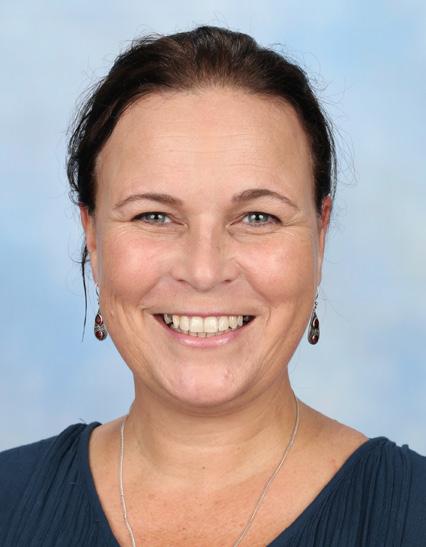
Ms Emily Maguire Director of
Co-curricular Performing Arts (P-12) emily.maguire@danebank.nsw.edu.au

Further information about these opportunities or to enrol, visit the Co-curricular Music and Performing Arts P-12 Portal.


Danebank offers diverse and rich opportunities in ensemble playing for students who are learning musical instruments. Whether it be strings, woodwind, brass or percussion, our dedicated instrumental staff seek to foster a love of playing while developing sound technique and building ensemble skills.
Each year, we see our instrumental ensembles reach great heights through public performance at Speech Night, Open Day, Chapel Services, Eisteddfods, Instrumental Festivals and the like. These programs not only create public performance opportunities and personal advancement for students within the programs themselves, but also serve as a wonderful skills-building resource for those who wish to pursue instrumental performance for their HSC exams and/ or beyond.
In total there are several different instrumental ensembles and programs offered to students across Years 7 – 12.
• Senior Concert Band (Years 7 - 12)
• Senior String Orchestra (Years 7 - 12)
• Senior Bellringers
• RISE Advanced Instrumental Ensemble (Years 7 - 12)audition
• RISE Chamber String Ensembles (targeting gifted senior string players) - audition
• RISE Wind Ensemble (targeting gifted wind and brass players) - audition
• RISE Percussion (targeting gifted percussion, mallet and keyboard players) - audition

Danebank also offers private music lessons to students who wish to learn to sing or play an instrument. Staffed by highly qualified instrumental and vocal specialists, this program is offered to any beginning students, or to students who are already learning outside of school but would like the convenience and cost effectiveness of learning on campus during the school day.
Private music lessons occur as pull-out, half hour lessons during the school day. The students are scheduled on a rotating schedule so they are not always missing the same class.
A range of instruments are available for hire through the school. For prices and policies please see our Instrument Hire page on the Co-Curricular Performing Arts P-12 Portal.
Students involved in many of our Co-Curricular Ensembles are invited to participate in our annual music camp. An enriching and team building experience that brings CoCurricular Ensembles together from across the Junior and Senior Campuses, immerses students in musical learning experiences and prepares repertoire for performance.
Theatresports is improvised theatre that uses the format of a competition. Teams are made up of no more than 5 players and they play a series of improvisation games of between 1 – 3 minutes which is then judged by a panel of three judges. Danebank enters the Interschool Theatresports Competition every year and competes against various schools.
Every year, Danebank stages a production. These productions range from plays to musicals and are an excellent way for students to work collaboratively across year groups and forge friendships. Musicals are held in both the Senior and Junior Schools and occasionally we combine for a large scale production involving both senior and upper junior students. We announce the school production early in the year and hold auditions. Rehearsals are Mondays 3 – 5 and Thursday or Fridays 3 – 5.30pm.
Danebank offers co-curricular dance opportunities through our Dance Troupe program which seeks to develop technique, expose the students to a range of choreography styles and prepare for performance opportunities both in school and in the wider community through eisteddfods and the like. Danebank currently offers 3 senior Dance Troupes which run both before and after school hours, Contemporary & Lyrical, Jazz & Hip Hop, RISE Extension Dance Troupe (targeting gifted and talented dancers by audition).
The Danebank Sports Program encourages widespread participation and offers a broad array of sports for students to enjoy and compete in. Danebank is dedicated to providing opportunities for all students—whether beginners, intermediates, or advanced athletes to get involved in its activities. Sport at Danebank is not compulsory, however strongly encouraged!
The Sports Program aims to:
• Encourage enjoyment and skill development
• Advocate for fitness, wellbeing, and a healthy lifestyle
• Cultivate cooperation and dedication
• Support personal responsibility and team building
• Facilitate healthy competition and help students reach their sporting potential
• Foster a sense of pride and community
*Subject to availability

Sports Program Overview
Danebank is a member of the Independent Girls Schools’ Association (IGSA) and much Senior School sport is based around the IGSA Sport Calendar. IGSA have over 30 schools involved, including country schools such as Frensham, NEGS and PLC Armidale. It offers Saturday sport per term, as well as carnivals for Athletics, Cross Country, Gymnastics, Swimming and Tennis (Tildesley).
Sport Facilitator
Ms Kerrie Banfield kerrie.banfield@danebank.nsw.edu.au
Badminton
Basketball Hockey Softball Volleyball
Sport Facilitator Contacts
Sport Facilitator
Ms Francesca Taliano francesca.taliano@danebank.nsw.edu.au
Athletics
Cross Country
Dragon Boating
Tennis
Sport Facilitator
Miss Ella Boudakian ella.boudakian@danebank.nsw.edu.au
Football
Netball
Touch Football
Water Polo
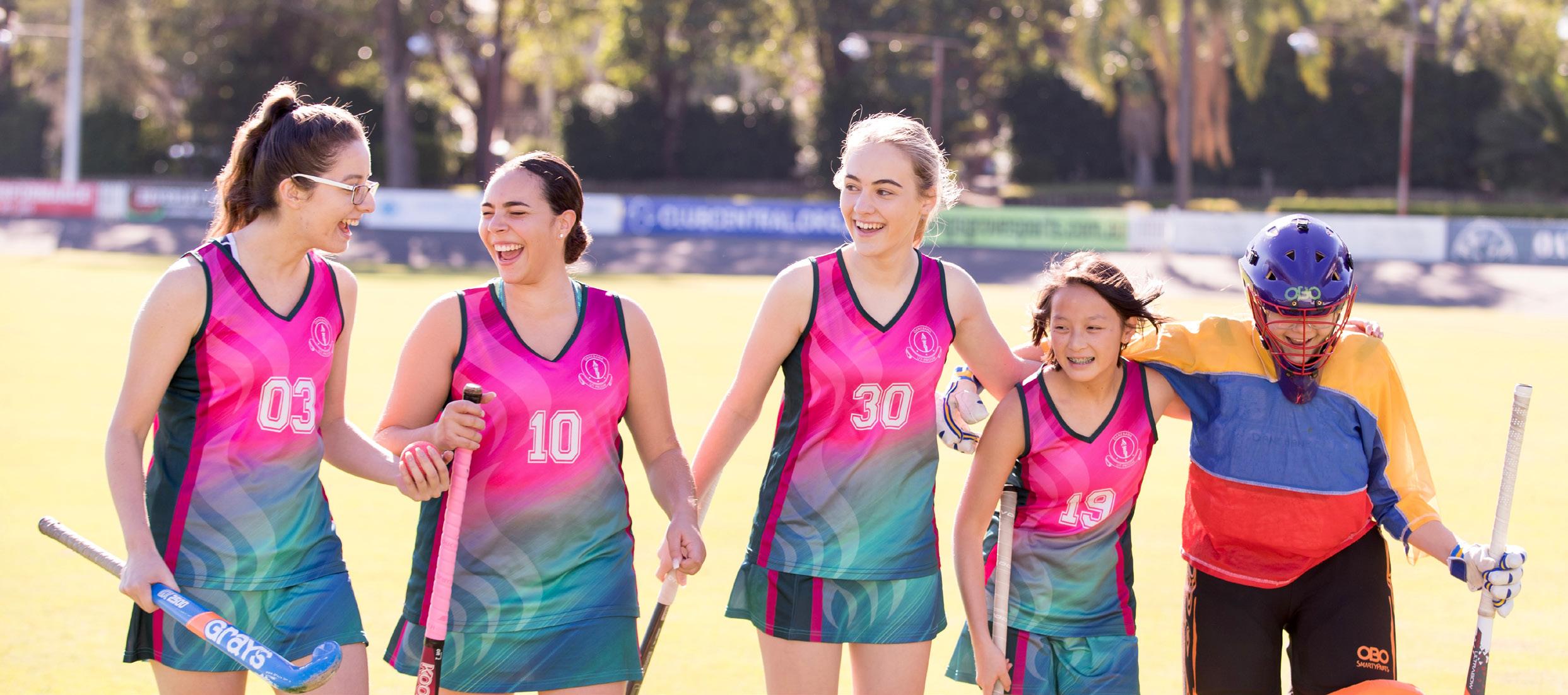
Registration takes place throughout the year and students and parents/carers are informed of this via email from the Head of Sport, Mr. Cameron Morrissey. Parents are expected to log on to iDanenet in order to register for sports in which they wish to participate.
Once registrations for each term close, the relevant Sport Facilitators will be in communication with students and parents/carers to inform them of trial dates, and subsequent training sessions.

Attendance at trials for each sport is compulsory. Selections will be made based on skill level, fitness, attitude and understanding of the game. Every girl registered by the registration closing date will be placed in a team.
Once teams have been selected, an Information Booklet for each sport will be distributed via email from the relevant Sport Facilitator which will include: teams, coaches, venue information, training schedule, draw, contact information.
Players are expected to attend all training sessions and games unless they are absent from school.
Training is conducted before school (6:45am - 8am) or after school (3:30pm onwards). Teams train once per week, and those playing in top IGSA or equivalent grades have a second training session each week.
Saturday morning games for all IGSA Sports take place between 8:00am and 12:00pm at various venues across Greater Sydney. All students must arrive at the venue at least 30 minutes before the game to sign on, warm up and prepare for their game.
All girls are expected to communicate to the relevant Sport Facilitator if they cannot attend a game or training session via the Non-Attendance Form at a minimum three days prior.
Each Sport requires a specific uniform which can be found here.
Danebank ONLY uniform can be worn to, from and during sporting events and training sessions.
Head of Sport
Mr Cameron Morrissey cameron.morrissey@danebank.nsw.edu.au
Sport Administration
Mrs Alli Grimison alli.grimison@danebank.nsw.edu.au
Head of Swimming
Mr Jarrod Bell jarrod.bell@danebank.nsw.edu.au
Head of Gymnastics
Ms Katrina Moir katrina.moir@danebank.nsw.edu.au
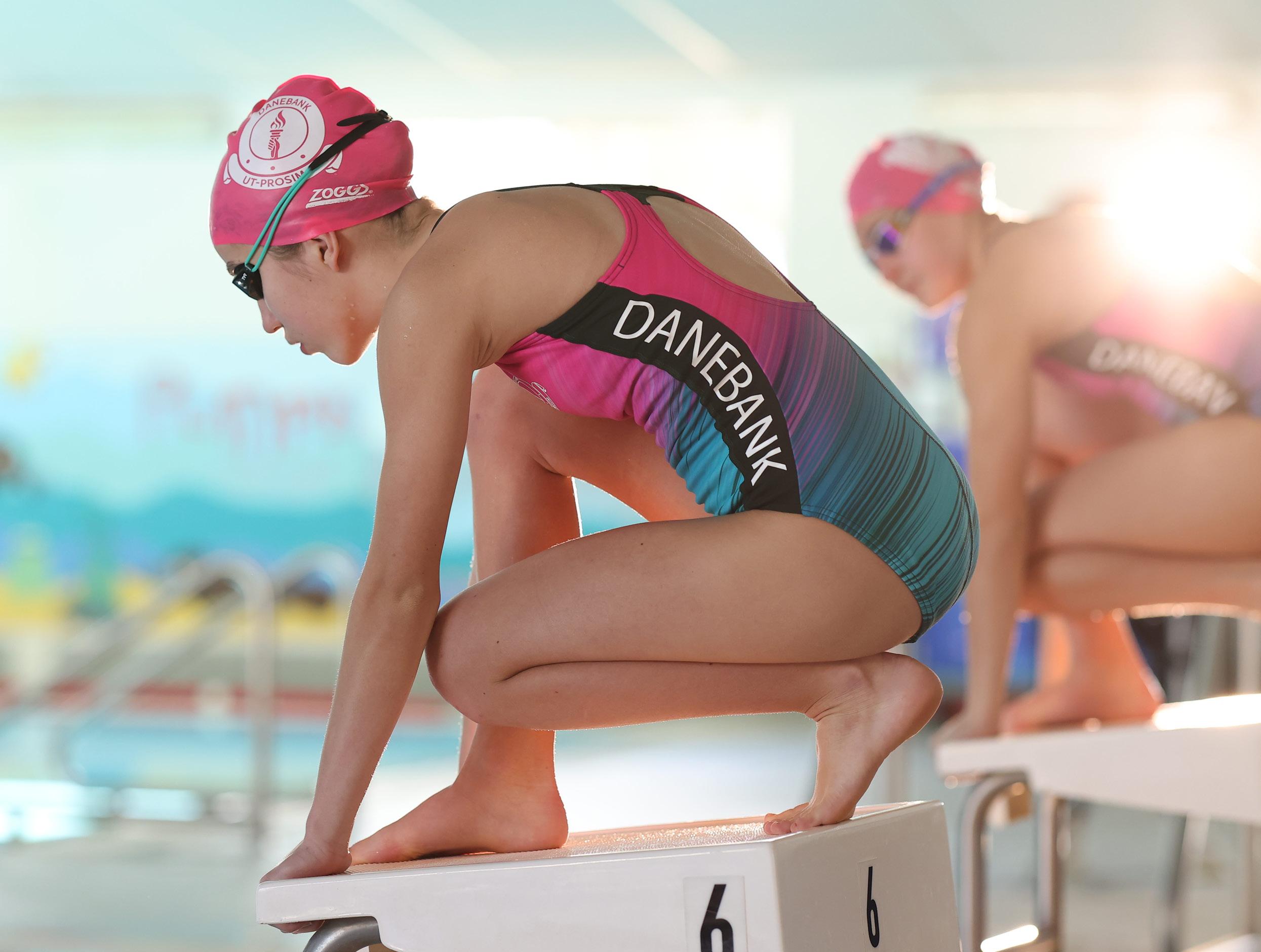
Danebank Swim School provides high quality Learn to Swim lessons and Squad sessions for the Danebank community. We cater for age groups from 3 years in our Learn to Swim program, all the way through to competitive/elite swimmers.
All new Learn to Swim and Squad students are assessed prior to enrolment into the Swim School to ensure they are enrolled into the appropriate swimming group for their ability. Students are continually assessed during their lessons or squad sessions with a view to advancing to the next level.
Learn to swim lessons are conducted in the Learners Pool. Lessons are taught by enthusiastic AUSTSWIM qualified instructors. Learn to Swim lessons are 30 minutes in duration and are conducted after school on weekdays and on Saturday mornings.
Swim squads are conducted in the main pool. Squad sessions are coached by highly qualified and experienced swimming coaches. Squads are conducted before and after school, depending on available pool space.
Mini Squad 1 Hour
Sparks Squad 1 Hour
Open Squad 1 Hour
Flames 1.5 Hours
Adult Squad is designed to increase the endurance and fitness levels of adults as well as stroke correction to improve swimming technique. Adult Squad is 1 hour in duration.

The Danebank values are the guiding principles that underpin our school policies. These values are: Compassionate Service, Creative Collaboration, Respectful Relationships, Courageous Optimism, Personal Excellence, Loving Kindness, Taking Responsibility.
A more extensive listing of Danebank School Policies can be found on our Parent Policy Portal.
(Under Section 5M of Civil Liability Act 2002) On Behalf of Danebank and IGSA:
Danebank organises many individual and team sporting activities during the course of a year. Some of these are organised in conjunction with IGSA Sport, a sub-committee of the Association of Heads of Independent Girls’ Schools NSW (AHIGS), now trading as IGSA. Students participating in these sporting activities take part in practice and in competitions.
Danebank and IGSA Sport expect students to take responsibility for their own safety by wearing compulsory safety equipment, by thinking carefully about the use of safety equipment that is highly recommended and by behaving in a safe and responsible manner towards team members, opponents, spectators, officials, property and grounds.
Danebank and IGSA Sport also expect parents, spectators and other participants to behave in a safe and responsible manner, to comply with the Codes of Conduct and to set a good example for the students.
While Danebank and IGSA Sport take measures to make the sporting activities as safe as reasonably possible for participants, there is a risk that students can be injured and suffer loss (including financial loss) and damage as a result of their participation in these sporting activities, whether at training or in actual events.
Such injury can occur while the student is engaging in or watching a sporting activity, or travelling to and from the event. The injury may result from a student’s actions, the actions of others, the state of the premises or equipment failure.
On some occasions, an injury can be serious (such as torn ligaments, dislocations, back injuries, concussion or broken bones). In very rare cases an injury can be life threatening or result in permanent disability. If a student has a preexisting injury, participating in a sporting activity could result in an exacerbation of that injury.
Students could also suffer loss as a result of their personal property being lost, stolen, damaged or destroyed.
Danebank organises many activities such as debating, mock trial, ensembles, choirs etc, during the course of a year. Some of these are organised in conjunction with the Association of Heads of Independent Girls’ Schools NSW (AHIGS), trading as IGSA. Students participating in these activities take part in practice and in competitions.
IGSA administers and convenes inter-school activities (such as IGSA Archdale Debating, IGSA Festival of Speech, IGSA Choral Festival, IGSA Dance Festival, IGSA Chess and the Dame Enid Lyons Oratory Competition) in which many students, including students of this school, participate.
Danebank and IGSA also expect parents, spectators and other participants to behave in a safe and responsible manner, to comply with the Codes of Conduct and to set a good example for the students.
While Danebank and IGSA take measures to make the activities as safe as reasonably possible for participants, there is a risk that students can be injured and suffer loss (including financial loss) and damage as a result of their participation in these activities, whether at practice or in actual events.
Such injury can occur while the student is engaging in or watching a non-sporting activity, or travelling to and from the event. The injury may result from a student’s actions, the actions of others, the state of the premises or equipment failure (e.g. a collapsed stage during a debating competition).
On some occasions, an injury can be serious (such as torn ligaments, dislocations, back injuries, concussion or broken bones). In very rare cases an injury can be life threatening or result in permanent disability.
Students could also suffer loss as a result of their personal property being lost, stolen, damaged or destroyed.

This policy is based on the Biblical belief that we live under the authority of God and we are to always bring glory to Him by loving one another in word and deed.
Do not let any unwholesome talk come out of your mouths, but only what is helpful for building others up according to their needs, that it may benefit those who listen. Be kind and compassionate to one another, forgiving each other, just as in Christ God forgave you. - Ephesians 4:29 and 32
The use of technology has grown tremendously and for most young people it is a vital connection to the world around them. Danebank recognises the potential value of technology in shaping our students’ educational experiences and the new avenues it can offer for learning. Technology, including Personal Electronic Devices (PEDs), has the capacity to enhance student productivity, extend the range of learning opportunities and broaden engagement with the digital world when used in the proper context.
However, Danebank also recognises the capacity these devices have for misuse and that they can impact others in a detrimental manner. Ethical behaviour is expected at all times. It is an expectation that all communication will be respectful and will involve the use of appropriate language.
The Danebank community acknowledges the important role online social networking and social media play in the academic and social lives of Danebank students, teachers and parents. The School aims to educate students to use all social networking and social media sites responsibly and ethically.
Danebank is committed to encourage every student to develop an authentic, ethical and responsible online presence that reflects her true and honest character. Danebank recognises that what is posted on the internet becomes a permanent record and that nothing is ever truly deleted.
Danebank acknowledges that the future of communication will be through online social networking and social media sites and that it is therefore a moral imperative that our students are educated about how to use this form of communication with respect and integrity.
This policy is for every member of the Danebank community - students, parents and staff are expected to support this policy. Students and parents are required to indicate a commitment to upholding the guidelines by signing the permissions page in the student’s Student Diary each year.
Personal Electronic Devices (PED) include, but are not
limited to, the following: mobile phones, portable internet devices (e.g. iPads, and any notepad android device), portable entertainment systems (e.g. iPods), photo, video and/or audio devices, laptops, notebooks and any other wireless technology such as smart watches.
Students are to follow staff directives regarding use of computers, tablets, the wifi network, iDanenet and the Internet.
• Students must take their BYO device to class at all times
• The BYO device must meet the minimum technical and software requirements set by the school
• Mobile phones are to be in student lockers at all times during school hours
• Teachers will indicate to students when they may use their BYO device during class.
NOTE: Students are not to contact parents by mobile phone during the day.
Students who have an issue that arises during the day are to first seek help from their Year Coordinator or another staff member, rather than contacting their parents. These staff members are able to understand and deal with the issue in the first instance and, where needed, get additional information to help clarify the issue for the student(s) concerned. Parents are to support this policy by not contacting their daughter by mobile phone during school hours. If there are any significant issues that staff are made aware of, the School will contact parents. In an emergency, students can use the phone in the school office to contact parents.
Students who are undertaking private study outside the classroom environment, may use a BYO device (not their mobile phone) for educational purposes and to facilitate study, ensuring that they are not distracting other students. PEDs must not be used to harass, sexually harass or victimise other students or staff. PEDs must not be used to violate a person’s right to privacy or to view or transmit sexually explicit material. Students are to avoid accessing inappropriate websites. If this should happen by accident, students should close the website immediately and notify a teacher. The school’s network is filtered for the protection of all. Our IT Department is notified if a student attempts to access inappropriate material, and it may be referred to the School Executive for assessment and response.
Break times during the day are for building positive social skills with other students. As such, the use of BYO devices in the playground is strongly discouraged. Students who are using BYO devices in the playground will be asked to put them away. The Library is available for those students who need to use their BYO devices during break times.

• To ensure that a student’s personal data is kept secure, users must log in under their own name and password and, if on a public computer such as those in the Library or computer lab, log out at the end of the session.
• Individual passwords should NOT be disclosed to others under any circumstance.
• Users must not access the files of others or vandalise the work of others.
• To ensure the reliable operation of the wifi network, users must not intentionally interfere with or disrupt the operation of the network or alter existing computer settings without permission of a teacher.
• Technology, including computer equipment and photocopiers, should be treated with care at all times so students are not disadvantaged by their misuse.
Students are to store their mobile phones in their lockers at all times during school hours. Students may carry their BYO device with them. However, it is recommended that all BYO devices are stored in their locker for safety when not in use during the school day.
Danebank is committed to upholding the highest level of respect for others when using social-networking and social-media apps and sites. To this end, members of the Danebank Community will not use abusive, rude or crude language when communicating with each other. Students will use their words to encourage and build one another up, treating themselves and others with the highest level of respect.
Students must not post photographs, personal information or refer in any way to members of the Danebank community (staff, students and parents) on the Internet without the permission of the School. This includes personal blogs or vlogs, social-media and networking apps and sites, as well as websites.
Students will maintain a high level of security and privacy on their social-networking settings. Social-networking sites will not be used to harass, abuse or bully.
Students must understand that the footprint left by their online interactions is permanent and therefore they should always be mindful that what they say and do online will impact their future selves.
Social networking can be a distraction from academic and other face-to-face interactions and commitments. Students therefore should prioritise personal interactions over electronic ones as part of best social practice.
Students are responsible for developing self-management and time management skills to ensure that they have

set the right priorities in their lives. Danebank does not support students signing up to social media sites under the stipulated age limit and recommends parents monitor this closely.
When students fail to comply with this policy, the School reserves the right to confiscate the PED in accordance with the Confiscation of Student Property Policy . If the School is of the opinion that the PED or social-media site contains inappropriate material, or that the material on the PED could be used in an inappropriate manner, the Principal, Deputy Principal Senior or Junior School, or a nominated teacher will request that the student show them the contents of the PED including all memory cards stored in the device. This will be done in the presence of the relevant Year Coordinator or class teacher who will act as a support and a witness.
Alternatively, the Principal or Deputy Principal Senior or Junior School may hold the PED until the student’s parents are present before the contents are viewed. In extreme cases the assistance of the Police may be called. If inappropriate or offensive material is found on the PED, or content has been uploaded to a social media site, consequences for breaching the School’s Positive Behaviour Code and Policy will apply which may include reparation, suspension and/or expulsion.
Should the device be used to capture content at school that is inappropriate or harmful to another student or member of staff and the student then chooses to post this content on the internet or in any other public arena, the student will be subject to the same discipline as if they had been found with this content on the school premises.

Danebank recognises and appreciates the extraordinary responsibility and privilege we have in educating the girls in our care. We also highly value the important role played by parents and carers in their daughter’s formal education.
The School places great emphasis on working in positive partnership with parents and carers to ensure that a student’s learning experiences are fully supported and optimised.
The Parent Code of Conduct Policy and Guidelines (hereafter referred to as Parent Code of Conduct) is intended as the foundation on which this partnership can be built in trust, with respect, and in mutual understanding of the School’s goals and expectations as we interact. Adhering to and supporting this code will promote positive and productive relationships within the school community.
The Parent Code of Conduct applies to all parents, step-parents, guardians, grandparents, extended family members and carers (collectively called “parents” in this document) of Danebank students.
The Parent Code of Conduct is shaped by our School’s values. The Danebank values are the guiding principles that underpin this code. These values are:
• Compassionate Service
• Creative Collaboration
• Respectful Relationships
• Courageous Optimism
• Personal Excellence
• Loving Kindness
• Taking Responsibility
In developing this code, Danebank recognises that parents ultimately want the best for their children. This code, therefore, is about promoting positive, supportive and respectful behaviours by parents when visiting the School campus, when at school sporting events or excursions and when interacting with school staff and other members of the school community.
This code does not attempt to provide a detailed and exhaustive list of what to do in every aspect of a parent’s interactions with the School and the school community. Instead, it sets out general expectations and, as such, is intended to be practical and non-adversarial.
The Danebank Parent Code of Conduct requires parents to abide by the following expectations.
Parents support the educational ethos and values of the School, model appropriate behaviours for their children to learn from, and work with the School as it educates and provides student care, wellbeing and pastoral support to all students.
Parents are to be a role model of responsible and safe behaviours. This includes ensuring the health and safety of all members of our school community (including staff, students, parents and alumnae) and the wider community. Parents are expected to ensure that other individuals involved in their child’s school life, such as other relatives and carers, also comply with this code.
Parents can support the School and be positive role models by doing, for example, the following:
• Comply with the School’s codes of conduct, directions, policies, procedures, rules and regulations and ensure their children do the same.
• Respect (and show to their children that they respect) that the School is inclusive and welcomes students from a variety of backgrounds and with diverse needs.
• Respond to school communications (e.g. by completing forms and providing permissions in a timely manner) when requested to do so.
• Encourage their children to actively participate in the life of the School, including in the classroom and the many sporting and co-curricular activities available.
• Support the School’s commitment to developing a student’s initiative, independence and sense of responsibility for their own lives and actions.
• Be responsive to concerns raised by the School about their own child, including by being cooperative, providing information and attending meetings when required.
The School expects students to comply with its rules and not engage in behaviour which is harmful to others or is contrary to the ethos and philosophy of the School.
Parents are expected to support the School’s approach to student behavioural concerns, in particular in relation to its Positive Behaviour Code and Policy and not undermine the School. It must be understood that in the case of minor disciplinary matters, the School will be the arbiter of what took place and what is a fair consequence. It will not engage in debate about the details of the conduct for the appropriateness of the disciplinary or educative responses

which are in line with the Positive Behaviour Code and Policy
In relation to more significant disciplinary matters which may result in suspension or expulsion, the School will inform parents of the matter and will deal with it in accordance with the School’s Positive Behaviour Code and Policy. While parents will be informed with the opportunity to respond, the final decision will be the School’s.
Please keep in mind that the school cannot comment on specific details relating to other students due to the privacy rights of all involved.
At no time is it appropriate for parents to address a disciplinary matter with a child other than their own, either on school grounds, at school events, or on social media.
The School conducts regular meetings between staff and parents at which the student’s progress can be discussed. There may be other times when a parent or staff member requests a meeting to discuss particular issues that may arise during the course of a student’s schooling.
If a parent wishes to meet with a staff member, they should make an appointment so that a mutually convenient time can be arranged. This can be done through the School office.
Parents should never attempt to contact a staff member at their home or via a private phone number or mobile phone.
Parents also can make an appointment to see the Deputy Principal Junior or Senior School and/or the Principal about any particular concerns they may have relating to their daughter.
It is important that parents show respect for staff and not publicly criticise them or seek to undermine their authority. If a parent has a particular concern about a member of staff, they can raise it with the staff member concerned, or with the Principal. However, when doing so, they should observe the general rules of conduct set out in this code.
The School has a duty of care to protect all staff and for this reason any disrespectful, aggressive or abusive behaviour will not be tolerated.
Communications, verbal or in writing, with other members of the School community whether teachers, administration staff, other parents or students should:
• Show respect, courtesy and consideration
• Not harass or bully another person
• Not use intemperate language
• Not be confrontational either in person or in writing
Interactions Online
Online interactions and engagement - whether on public social media such as Facebook and Instagram, or in private
apps such as WhatsApp - should be respectful and not invasive of anyone’s privacy. Be mindful of the content of discussions and posts, avoiding sensitive and confidential topics. This would also include, but is not be limited to, tagging/identifying someone or posting photographs featuring someone else’s child wearing a Danebank uniform.
Parents should raise concerns with the appropriate staff member, the Deputy Principal Junior or Senior School, or the Principal.
Parents can leave messages for their daughters at Junior or Senior School reception and should not contact their daughters directly during school hours. Parents will be contacted by the School should any significant issues arise.
For non-urgent, general enquiries and notifications, please contact the Junior School and Senior School offices respectively. Emails are opened by office staff and forwarded to the relevant staff member.
Please note:
• Teachers only check emails periodically throughout the day and not while they are teaching
• They will endeavour to reply as quickly as possible, but please allow up to two school days
• An email sent on a Friday may only be responded to the next week
• Teachers are not expected to answer emails immediately or out of hours
For any urgent matters, please phone the Junior School (9580 9242) or Senior School (9589 1415) offices.
Where some students have parents that are separated or divorced, parents should not attempt to involve the School in any parental dispute that may arise. The School is not able to make judgments on the merits of claims made by one parent against another and should not be asked to do so. Nor should it be asked to take any action which would or is designed to disadvantage one party. The School will, of course, observe any orders made by a Court in relation to a student or communications with parents.
When visiting the School or attending school activities and events, parents should model appropriate and respectful behaviours, and uphold the School’s values. When dropping off and picking up students from the School, parents are expected to ensure the health and safety of all members of our school community, as well as the wider community, at all times. Parents are to comply with all traffic rules and any school traffic management systems in place. This includes adhering to applicable speed limits, observing all traffic signs, limiting the use of car horns (unless indicating imminent danger), and parking
appropriately and safely by abiding by the Kiss-and-Ride parking signs. Parents should not double park or park across the driveways of neighbouring properties or exit driveways from the school grounds.
The School exercises careful and considered judgment when making decisions about student achievement and participation in the broader school life. Class allocation, learning and assessment, co-curricular selection, and leadership selection are all the result of a comprehensive decision-making process. Parents are encouraged to show their support and understanding in these matters.
Parents are encouraged to attend sporting events, but should exercise restraint when supporting school teams. In particular, they should not abuse, threaten or otherwise seek to intimidate an umpire or referee or direct such behaviour towards a player or any school representatives.
Sports coaches select school teams based on their view of the most appropriate criteria at the relevant time. Apart from reasonable enquiry, parents are encouraged to support and abide by these decisions and selections.

Leave during term time, other than illness or representative sport, is strongly discouraged. If planning leave, parents/ carers must complete either the Application for LeaveHoliday outside scheduled School Holiday Times or Application for Exemption from Attendance at School form at least two weeks prior to the planned leave.
The educational consequences of any decision to be absent from school will be borne by the student. It must not be assumed that assessment tasks will be re-organised around leave taken during school time. Students should approach their classroom teacher who will give an overview of the content that will be covered by the class. The responsibility of covering this work lies with the student.
Senior School parents/carers are encouraged to consult the Assessment Handbook prior to planning leave to ensure major assessment blocks for students in Years 10 to 12 are avoided. This is to ensure that the grade allocated in each of the student’s subjects is not unduly affected. The Principal will only grant leave during these times based on exceptional circumstances.
Parents of students in Years 7 to 9 should also carefully consider the repercussions of planning leave during any assessment periods throughout the academic year.
The School is committed to the education and wellbeing of each student. It is therefore critical that parents are able to raise genuine grievances they may have about such matters in an appropriate, constructive and respectful forum.
The School’s grievance-management procedures are set out in the Complaints Handling Policy and Procedures document. This policy sets out how concerns and grievances may be raised with the School, who they should be raised with and how the School will deal with these in a respectful and timely manner.
Danebank acknowledges and applies the fundamental principles of procedural fairness and unbiased decision making when considering breaches of the Parent Code of Conduct.
Effective and appropriate responses by the School to breaches of the code support the maintenance of a positive and productive school community.
In instances where there is a report of a breach or consistent breaches of the Parent Code of Conduct, the Principal will have absolute discretion regarding how to best respond to the concerns raised.
Staff and volunteers are empowered to take steps to protect their own health and wellbeing. If they feel that a parent is being inappropriate, they are encouraged to indicate this and ask that it stop. If it does not, or if a staff member feels that a parent’s actions are posing a risk to their or someone else’s health and wellbeing, they are empowered to remove themselves from the situation. This may include immediately concluding a meeting or phone call or demanding that a parent immediately leave the school grounds (or a school activity or event).
If a parent fails to observe this code after being warned about a breach, the School may:
• Limit access to a teacher or teachers
• Limit access to the school premises or sporting or other school events
• Terminate the enrolment of the student.
At the commencement of their daughter’s education at Danebank, every parent signs the Conditions of Enrolment form.
Point 15(c) states: “The Principal may in his or her absolute discretion terminate the Student’s enrolment if the Principal considers that a mutually beneficial relationship of trust and cooperation between the Parents and the School has broken down to the extent that it adversely impacts on that relationship.”
The School reserves the right to alter this Code of Conduct at any time at its absolute discretion.


“For I know the plans I have for you,” declares the Lord, “plans to prosper you and not to harm you, plans to give you hope and a future.” Jeremiah 29:11
Term 1
Fri 24 January New Students’ Orientation
Tues 28 January Term 1 Commences
Fri 11 April Term 1 Concludes
Term 2
Tues 29 April Term 2 Commences
Fri 27 June Term 2 Concludes
Term 3
Tues 22 July Term 3 Commences
Fri 26 September Term 3 Concludes
Term 4
Tues 14 October Term 4 Commences
Wed 3 December Term 4 Concludes
www.danebank.nsw.edu.au

